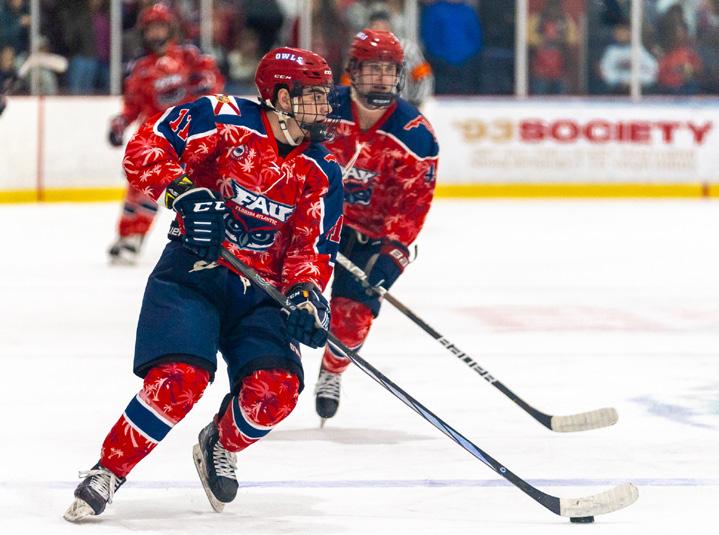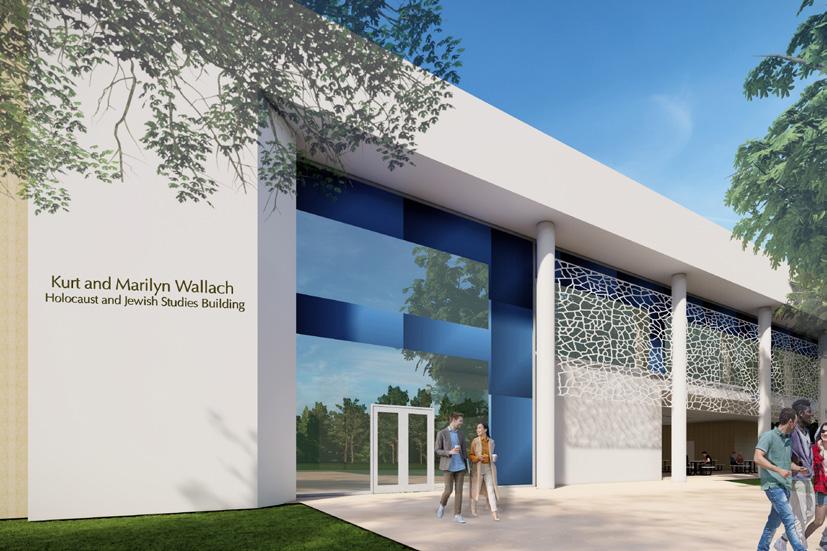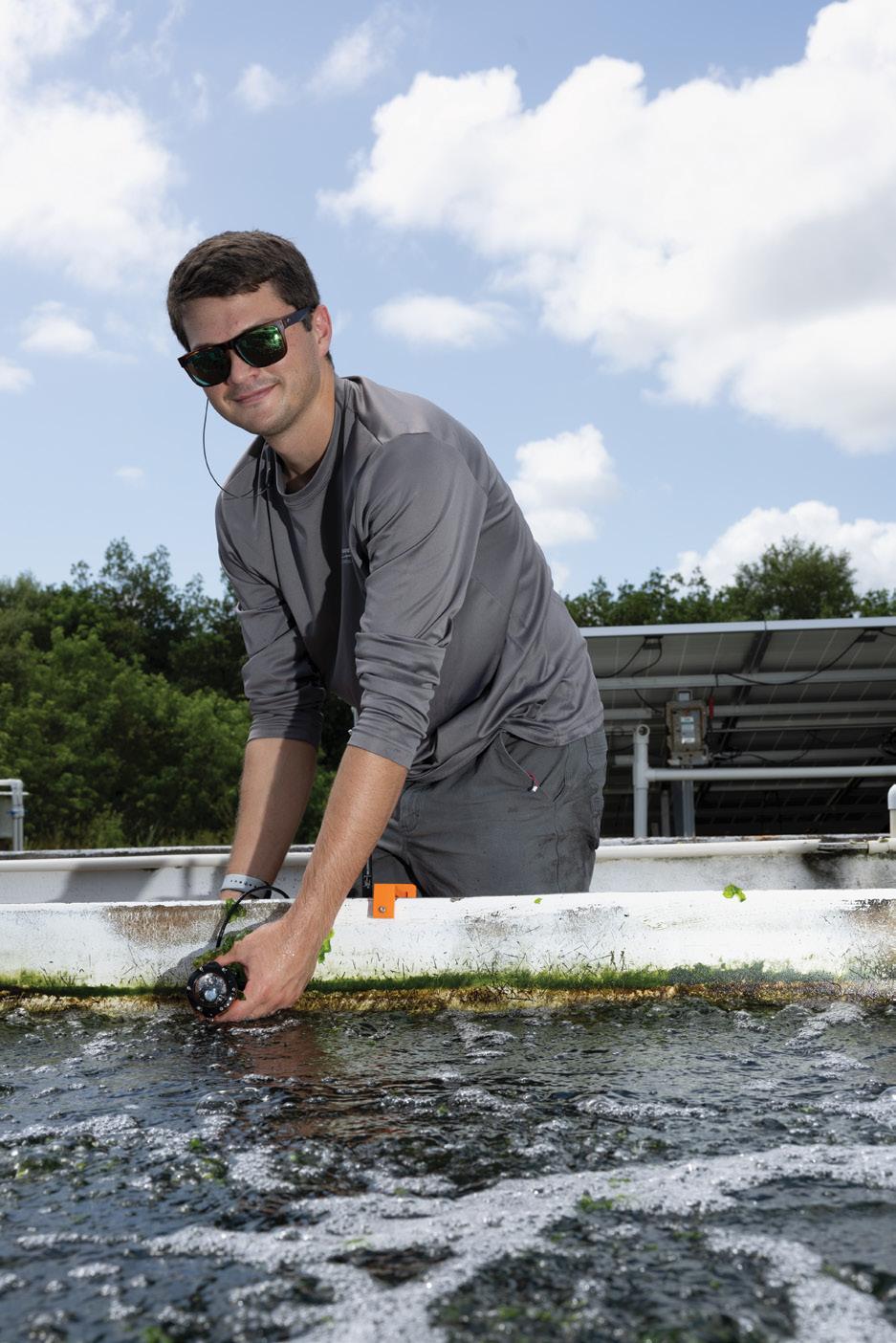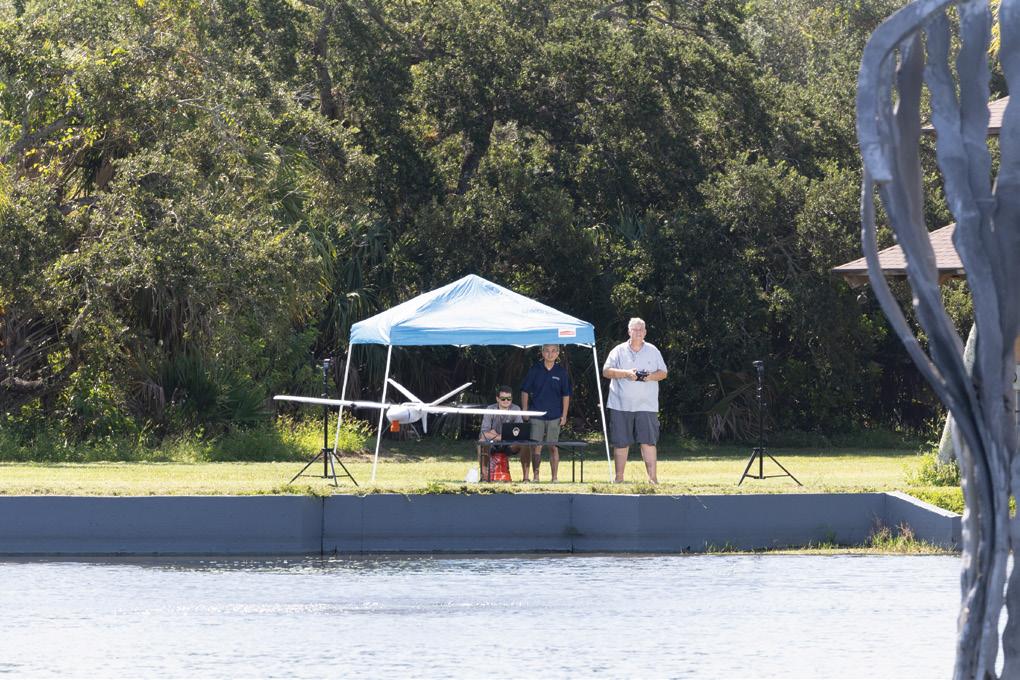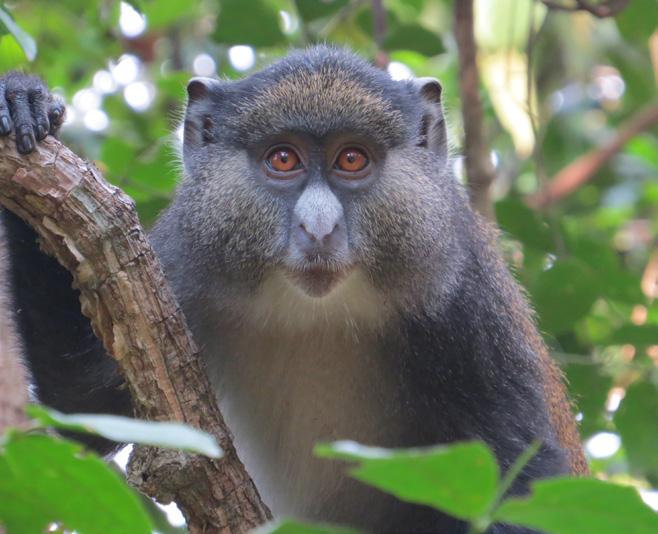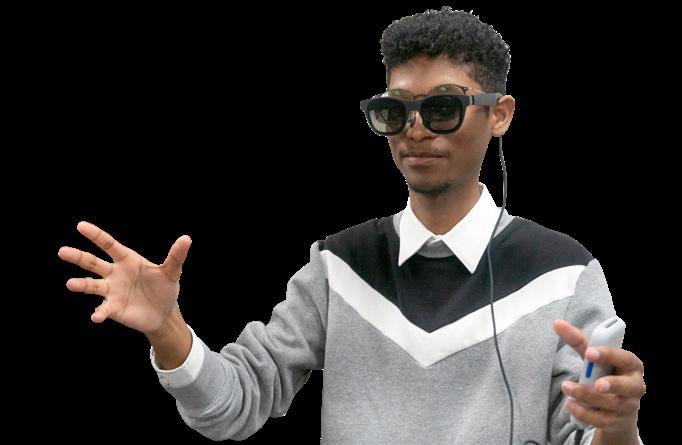




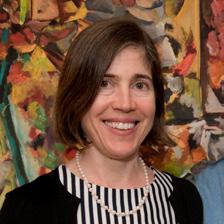
PRIMATOLOGIST KATE DETWILER DISCOVERS NEW SPECIES, SAFEGUARDS THE ENDANGERED




spring welcomes warmer weather and brighter days, Florida Atlantic continues to transform lives and communities through excellence in education. This issue captures the University’s momentum through its most recent initiatives, research and achievements.
Showcasing some exciting breakthroughs in the wild, the cover story about Florida Atlantic primatologist Kate Detwiler, Ph.D., highlights her fascinating career spent researching monkeys around the world. From discovering hybrids and new species, to determining the origins of a mysterious colony in South Florida, Detwiler and her team of researchers have gained remarkable insights about the animals they study while making significant contributions to wildlife management and conservation efforts internationally.
This issue also shines a spotlight on Florida Atlantic’s robust programs, activities and community engagement efforts designed to support Jewish education and advocacy. Through knowledge, we are empowering students of all ages to create a world in which peace and justice thrive. A future building to house these initiatives will further establish the University as an epicenter for Jewish culture, education and history in South Florida.
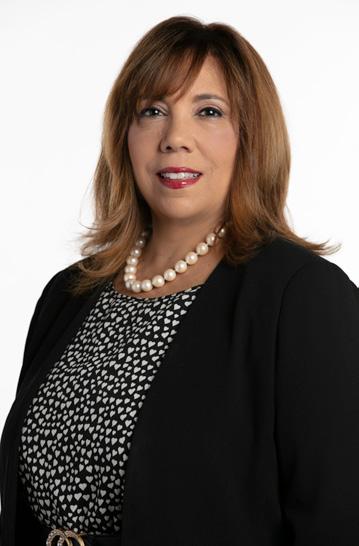
A feature about the College of Engineering and Computer Science reveals how students are taking their cutting-edge ideas to the next level by learning how to develop and secure their intellectual property (IP). With a curriculum that hinges on innovation, the college ensures that students who generate real-world solutions are equipped with the knowledge and tools to protect them. Through valuable IP offerings, both undergraduate and graduate students can turn their academic pursuits into entrepreneurial successes.
Taking the Amateur Athletic Union College Hockey League by storm, the Florida Atlantic Ice Hockey Club earned a No. 1 national ranking during the fall season and played for a national championship this spring. A feature story about their success proves that Owls can excel in any sport.
Speaking of sports, our men’s basketball team had a great first season in the American Athletic Conference. The Owls posted a 25-8 overall record — their second-most wins in a season — and earned a spot in the NCAA Tournament for the second consecutive year. You can read more about their successes in the following pages.
I hope you enjoy reading the spring issue of Florida Atlantic magazine and that you find inspiration in the vibrant stories of our faculty, staff and students.
Go Owls!
Stacy Volnick, Ph.D. President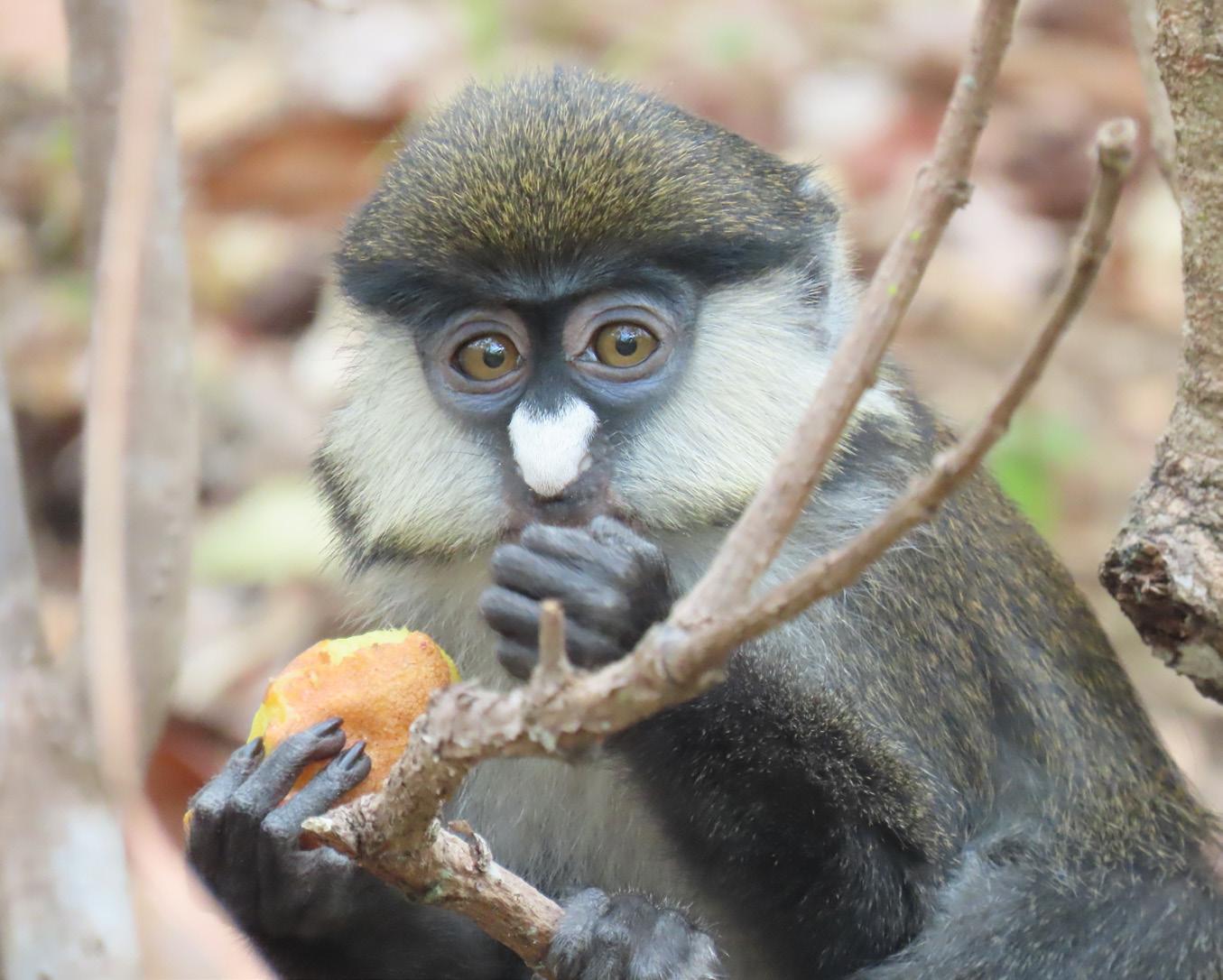
Executive Editor
Peter Hull, Vice President for Public Affairs
Senior Managing Editor
Amy Haycock, Assistant Vice President, Presidential Communications
Managing Editor
Cammi Clark, Ph.D., Senior Director, Research Communications
Copy Editor
Lisa Metcalf, Senior Media Relations Director for University News
Writers and Editors
Cammi Clark, Alyse Cooke, Josephine Elliott, Angie Francalancia, Gisele Galoustian, Denise Gravatt, Amy Haycock, Chelsey Matheson, Katrina McCormack, Lisa Metcalf, Cara Perry, Scott Silversten
Design and Graphics
Craig Korn
Photographers/Images
Daniel Alempijevic, Ph.D., Bethany Alex, Alberto Alvarado, Paige Arriola, Steven Bridges, Katarzyna Bytnar, Teresa Crane, Kate Detwiler, Ph.D., Alex Dolce, Nwadiuto (Diuto) Esiobu, Ph.D., Michelle Friswell, Gombe Hybrid Monkey Project, Frantzi Hyacinthe, Chelsey Matheson, Aaron Mencia, Maneno Mpongo, Dan Nering, Mauricio Paiz, Jim Rassol, JC Ridley, Elizabeth Tapanes, Ph.D., Jeffrey Tholl, Kevin Tyre, Amelia Villaseñor, Ph.D., Deborah “Missy” Williams, Ph.D. iStock.com: agrino, anyaberkut, Bilanol, Castka, Liudmila Chernetska, Alberto Gagliardi, GDArts, gesrey, gorsh13, Harvepino, David Keep, Jeffrey Lee, Makpan, Onphalai, Pakpoom primipil, scanrail, Shpiiakina, sabelskaya, Stefan Schottleitner, Thapana setory, Tuned_In, USO, Viktoriia Voievodina, wingedwolf
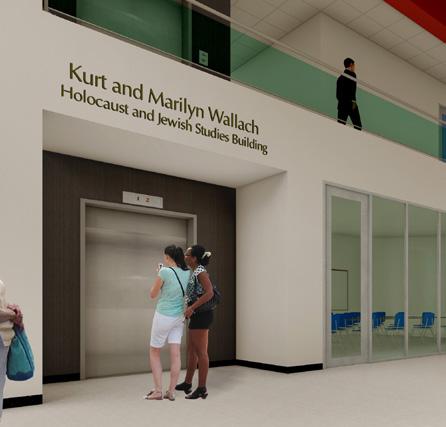
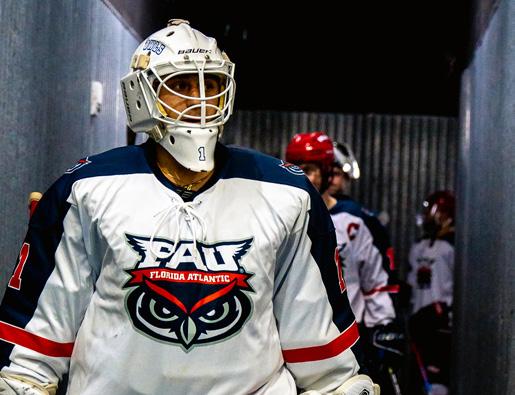
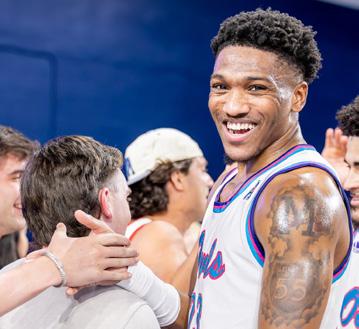
Semester by the Sea Offers Undergraduates Unforgettable Field Experience

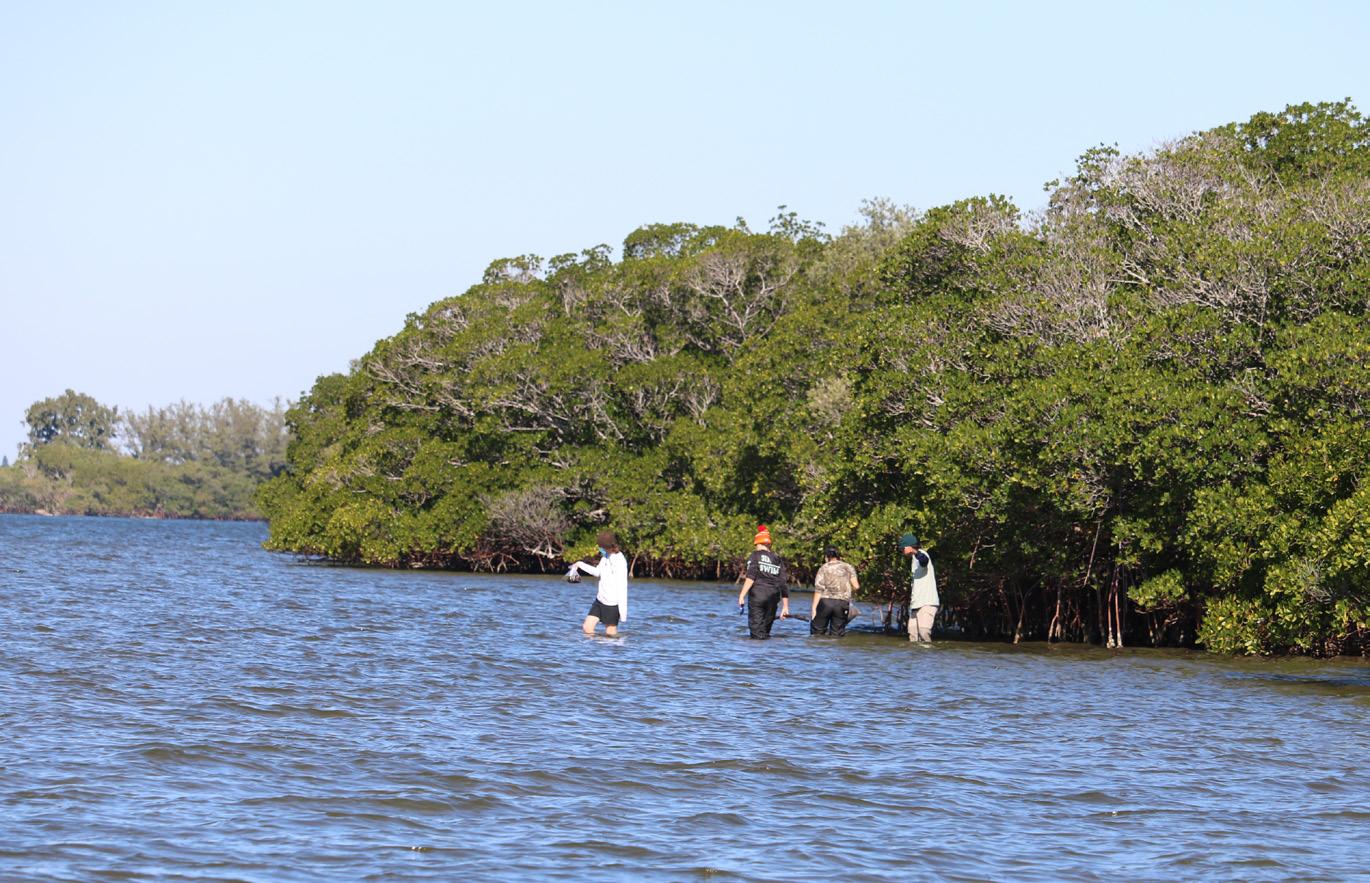
For aspiring marine scientists, the Indian River Lagoon (IRL) offers a treasure trove of learning and research opportunities. And at Florida Atlantic University as undergraduate students, these future scientists are provided a unique opportunity to immerse themselves in this living laboratory which spans 156 miles along Florida’s East Coast.
The Semester by the Sea program was designed by researchers at FAU Harbor Branch Oceanographic Institute, located on a 144-acre campus in Fort Pierce bordering the IRL, one of the most biologically diverse estuaries in North America. The curriculum is a well-rounded, intensive experience for students interested in a career in marine science.
“Semester by the Sea gives students an opportunity to really get in the field – really immerse themselves,” said M. Dennis Hanisak, Ph.D., research professor at Harbor Branch who has led the program – including its initial
development – since 2001.
“As a student, you get your feet wet, literally, working on projects in and around the Indian River Lagoon.”
The courses are accredited by the Department of Biological Sciences within Florida Atlantic’s Charles E. Schmidt College of Science and are currently supported by a grant from the Harbor Branch Oceanographic Institute Foundation.
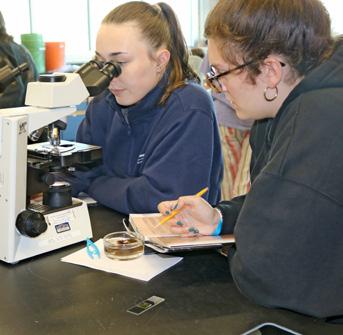
Semester by the Sea is conducted during the spring, with capacity capped at 25 students while the final accepted cohort is often smaller. There are currently 14 students in the program who also live on campus at Harbor Branch, adding to the immersive quality of the experience.
The curriculum consists of three core courses: marine science, marine biodiversity and marine ecology. Together, the concepts taught in these courses form a foundation of scientific understanding about the aquatic world.
As Hanisak explains, marine biodiversity answers the question “What do we know about all the different types of organisms in a marine environment?” Marine ecology explores how these organisms interact with the environment, while marine science covers “everything but biology,” which includes the fundamentals of chemical and physical oceanography.
Team teaching is an important aspect of the Semester by the Sea curriculum. Harbor Branch research faculty are leaders in their fields and step in to teach their areas of expertise within the courses, such as marine plants, corals and invertebrates, and fishes.
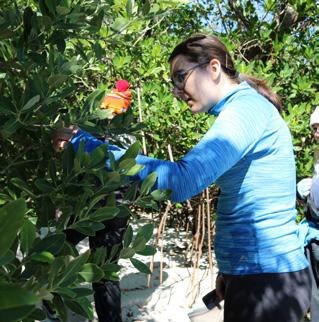
The biodiversity and ecology courses each include a lab component, which is where students experience much of the fieldwork central to the program. For instance, during a biodiversity course field day, students towed for phytoplankton samples in the IRL between Vero Beach and Fort Pierce, which they brought back to the lab and analyzed. During an ecology course lab, they studied how bivalves like clams filtered that same kind of phytoplankton and the resulting effect of that filtration on the environment, such as changes in water quality.
The electives offered through the program provide opportunities for students to take advantage of Harbor Branch’s strength in topics like aquaculture research and its proximity to the lagoon.
“Through the aquaculture elective, students get to see something different beyond the more traditional marine biology and marine science disciplines,” Hanisak said. “They can see first-hand some of the areas of specialization they could pursue.”
The Indian River Lagoon Experience elective is a weeklong exploration of the lagoon, where students spend eighthour days conducting hands-on research activities such as seagrass mapping and quantification of invertebrates. During the course, they are broken into pairs to complete a microstudy. These projects are then developed into posters, which the students present at the end of the semester.
“Semester by the Sea is all about immersion and getting practical experience,” Hanisak said. “In our other courses, the students
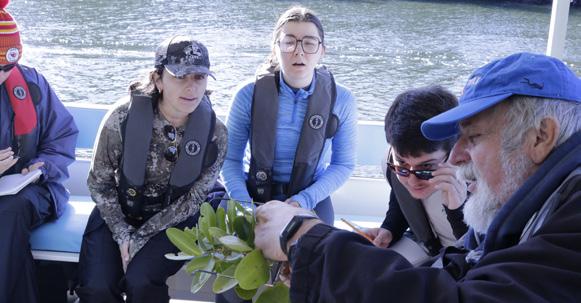
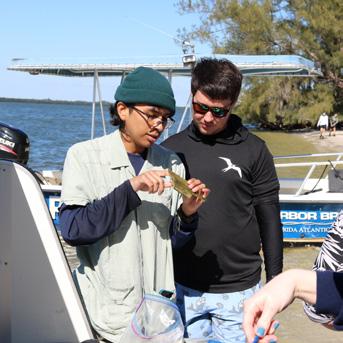
have to give talks or write papers, so the poster is the third type of scientific communication that is really important for them to master.”
Semester by the Sea adds prestige to a resume, said Annie Page, DVM, Ph.D., associate research professor at Harbor Branch and one of the administrators of the program who sits on its selection committee.
“For me, as a professor viewing potential graduate students, seeing Semester by the Sea on their resume tells me they’re academically up to par, and they have a legitimate background in marine studies.”
Many Semester by the Sea students make connections during their time in the program
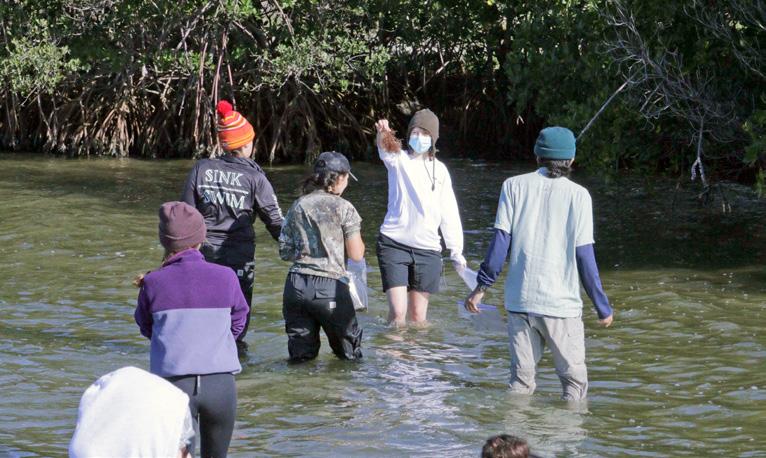
that forge the path for them to earn their master’s and doctoral degrees at Harbor Branch.
“There are similar programs at a few other universities, but as a whole package, Semester by the Sea is a pretty rare opportunity on a national level,” Page said.
Most students who participate in the program already attend Florida Atlantic, but admission is open to any undergraduates who have completed either their second or third year. Both Page and Hanisak cited instances in which students explained that one of their main drivers for attending Florida Atlantic was to be able to participate in Semester by the Sea.
By incorporating career opportunities and navigation into the curriculum, Semester by the Sea students can understand how to turn their passion into a rewarding, lifelong pursuit, said Hanisak.
“What’s really cool is when a student doesn’t have a clue what they want to do, and then through the course of the semester, they latch on to something,” he said. “We see a lot of development over a pretty short period of time.”
Hanisak sees Semester by the Sea as an enrichment opportunity not just for the students, but also for the faculty.
“We are researchers primarily, but most of us feel that part of what we do needs to be shared with the next generation,” he said. “It’s been really gratifying to help students along their path. Florida needs the kind of skillsets that students are learning here.”
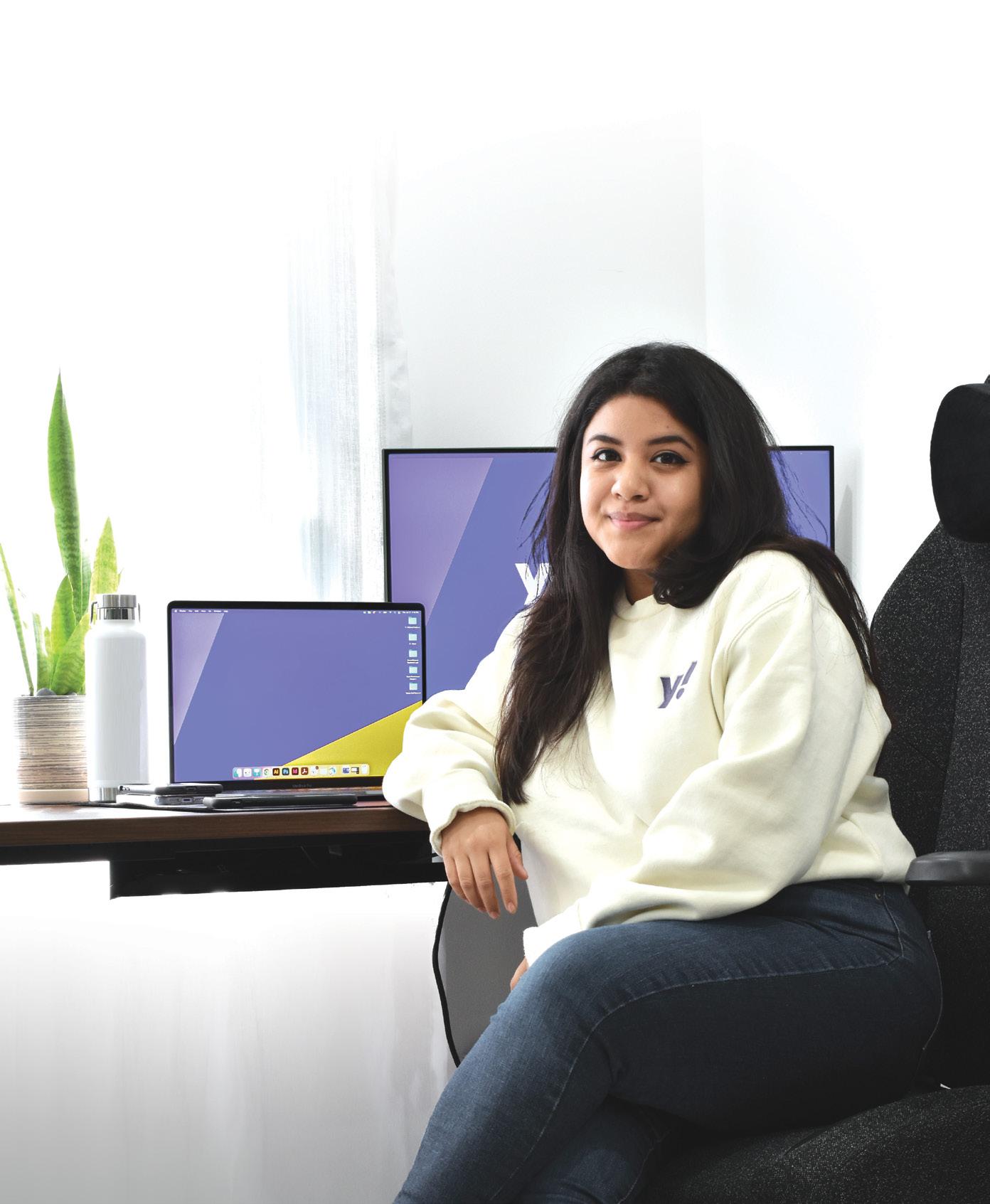

Combining Eye Movements and Instruction to Process Memories

Although individuals with substance use disorder use outpatient support services and resources, relapse rates are as high as 70 percent, indicating a need for more treatment modalities.
Addiction cravings are maintained and heightened by sensory imagery stored in memories, with more vivid imagery predicting higher craving intensity. A new Florida Atlantic University pilot study is showing promise in treating addiction cravings by combining eye movements and guided instructions to process memories.
For the study, Florida Atlantic researchers employed Eye Movement Desensitization Reprocessing (EMDR), proven to be effective in treating post-traumatic stress disorder (PTSD), depression, anxiety and other mental health conditions, to transform dysfunctional memories stored in the brain through processing and integration. Addiction memory, assumed to be episodic, resembles the maladaptive traumatic memory formation commonly seen in PTSD. Until now, research exploring this method for substance use disorder has been sparse.
Researchers focused on cravings, perseverative thoughts (repetitive negative thinking), and irrational cognitions about the substance of choice – such as alcohol or opiates, including heroin and morphine. They tested addictionfocused EMDR with and without cognitive behavioral therapy, a psycho-social intervention aimed to reduce symptoms of various mental

health conditions including depression and anxiety disorders. This method accesses trauma events in very specific ways to reprocess what the individual remembers from the negative event to “repair” the mental injury from that memory.
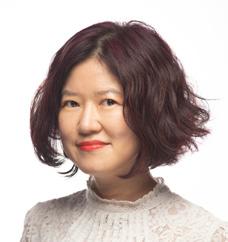
“While the purpose of our pilot study was to test addiction-focused EMDR on chemical addiction cravings, our findings indicate that it also can be highly effective with issues that are not chemical but rather compulsory in nature, such as internet addiction and gambling,” said JuYoung Park, Ph.D., professor in the Phyllis and Harvey Sandler School of Social Work in Florida Atlantic’s College of Social Work and Criminal Justice. “Importantly, this therapy is a valuable add-on to current addiction treatment to address memories that drive addiction cravings, which also impacts maladaptive thought patterns associated with relapse.”
Individuals with substance use disorder are encouraged to attend inpatient treatment that employs group therapy and cognitive behavioral therapy, along with pharmacological options such as anti-craving drugs. As perseverative thoughts were found to be an important predictor of relapse, the researchers said findings from their study show that pairing addiction-focused EMDR with cognitive behavioral therapy could decrease relapse rates and help people with substance use disorder to maintain long-term recovery in inpatient or even outpatient treatment centers.
This therapy is a valuable add-on to current addiction treatment to address memories that drive addiction cravings, which also impacts maladaptive thought patterns associated with relapse.”
-JuYoung Park, Ph.D.
Florida Atlantic University is on the precipice of achieving the Carnegie Classification of Institutions of Higher Education’s highest and most coveted status — R1: Very High Research Activity.
Fewer than 150 institutions in the United States have the prestigious R1 designation, which is indicative of a truly comprehensive university that spurs economic development, attracts high-quality students and faculty, and increases external funding. R1 universities meet benchmarks in research, educational activity and vital research staffing, as measured by the Carnegie Classification of Institutions of Higher Education.
“Over the past decade, the Florida Atlantic Board of Trustees and senior leadership remained committed to critical investments in research infrastructure and talent acquisition which led to this pivotal milestone in our growth trajectory,” said Gregg Fields, Ph.D., interim vice president for research. “Our research is largely aimed at addressing the country’s most pressing challenges: coastal security, clean energy, and advances in disease diagnosis and treatment. The continued success we are seeing with major federal awards from agencies such as the National Science Foundation, Department of Defense and the National Institutes of Health points to the rapid acceleration of our research enterprise.”
The classification measures universities across multiple indicators, including research expenditures in science, technology, engineering and math (STEM) and non-STEM fields, as well as doctorates with a research emphasis awarded in STEM fields, social sciences and humanities.
The Carnegie Foundation for the Advancement of Teaching reviews existing R1 designations and new applications every three years, with the next adjustment expected in 2025. R1 universities are required to meet benchmarks including spending at least $50 million on research and development and producing at least 70 research doctorates each year. Florida Atlantic will transition to R1 in 2025 based on 2023 research expenditures of $67.25 million and 125 doctoral graduates.
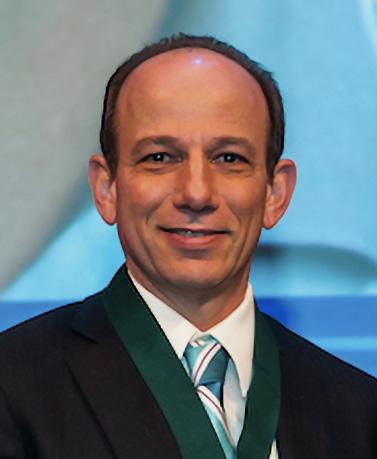
Our research is largely aimed at addressing the country’s most pressing challenges: coastal security, clean energy, and advances in disease diagnosis and treatment.”
- Gregg Fields, Ph.D.
TOTAL SPONSORED RESEARCH EXPENDITURES
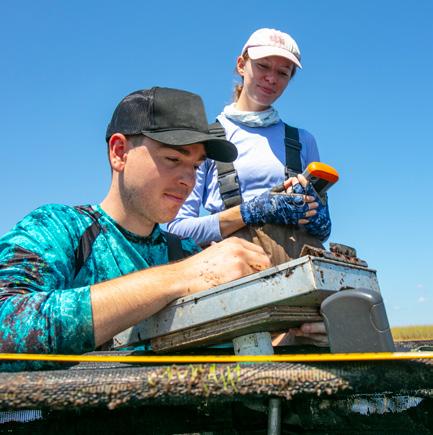
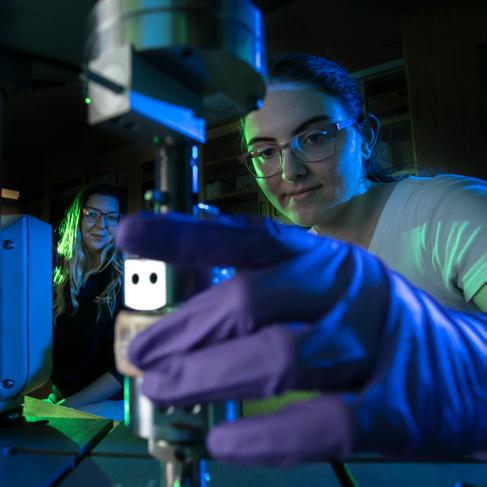

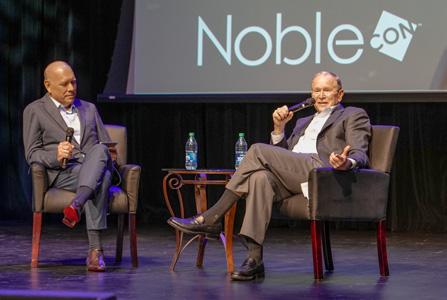
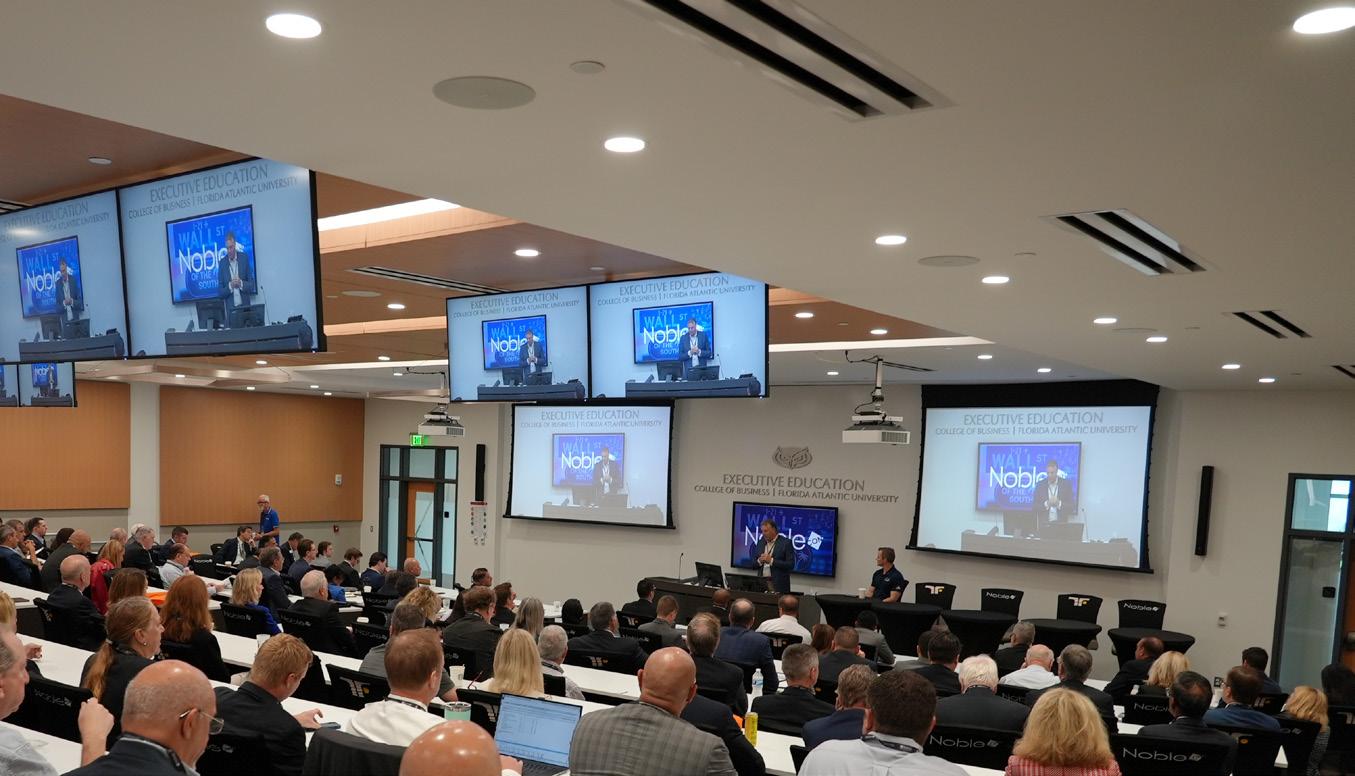
Former U.S. President Paints a Picture of the Future of Business
Florida Atlantic University recently hosted an hour-long fireside chat with former U.S. President George W. Bush at NobleCon19, an annual investor conference renowned for connecting high-growth companies with vital capital. NobleCon19 spanned two days and welcomed 1,400 participants.
Florida Atlantic faculty, staff and students; members of the community; and conference participants gathered in the Carole and Barry Kay Auditorium on the Boca Raton campus to listen to Bush conduct a casual dialogue with moderator Michael Kupinski, director of research at Noble Capital Markets, headquartered in Boca Raton.
Bush reflected on the importance of his parents and family, his time in the White House, and his post-presidential pursuit of painting as a hobby. The conversation covered his administration’s work reforming America’s education system and his strategic efforts to keep America safe after the terrorist attacks on 9/11. He also shared his thoughts on the upcoming presidential race, global geo-political events, immigration and the national debt.
In addition to the fireside chat with Bush, NobleCon19 featured investors and industry leaders from technology, media, medicine, manufacturing, retail and transportation discussing market challenges and opportunities, as well as political advertising spend
and artificial intelligence. There were more than 80 company presentations, breakouts, keynotes and panelists including:



Dusty May, former Florida Atlantic men’s basketball head coach, who spoke about empowering leadership in teams.
Steven Cress, head of quantitative strategies at global investing community Seeking Alpha, who shared insights about making informed investment decisions.
Michael Williams, veteran news anchor at NBC’s WPTV NewsChannel 5, who hosted an economic perspectives panel.
Florida Atlantic finance students also attended the conference and observed real-world investment pitches, and learned about what is happening in the marketplace, as well as current industry trends.
“NobleCon19 showcased great companies and great opportunities, and hosting President Bush’s chat was a real highlight,” said Daniel Gropper, Ph.D., dean of Florida Atlantic’s College of Business. “Our financial industry is an integral part of the economy, and I can’t think of a better way to expose our students to the importance of emerging growth companies than to host 100-plus executive teams on our campus.”
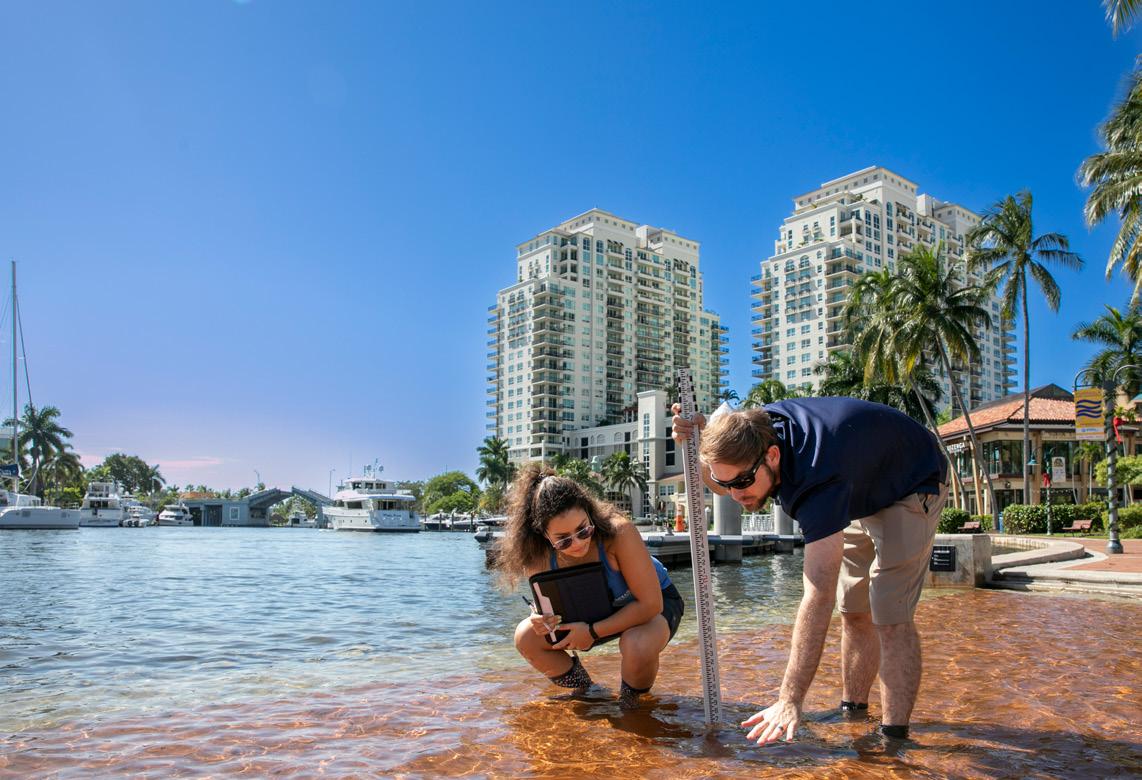
New School Creates Hub for Environmental Sustainability
Florida Atlantic University recently launched an innovative new school within the Charles E. Schmidt College of Science to help address the critical intensification of environmental risks that are particularly acute in South Florida, but also affect communities across the globe.
The School of Environmental, Coastal, and Ocean Sustainability (ECOS) is comprised of an array of existing disciplines and units to augment Florida Atlantic’s research, teaching and community engagement, while creating an environmental hub at the university. The school also creates a stronger link between the scientific discovery underway at Florida Atlantic’s northernmost campus – Harbor Branch Oceanographic Institute in Fort Pierce – and the academic mission of the university.
“Our expert faculty and scientists at the Schmidt College of Science and Florida Atlantic Harbor Branch are forging a path
that leads to a resilient future, both with research and through training the next generation of scientists, problem solvers and policymakers,” said Valery E. Forbes, Ph.D., dean of the College of Science.
“We are in a prime location to study the environment and its intersection with urban areas – with the Atlantic Ocean, the Indian River Lagoon, the Everglades and numerous freshwater ecosystems converging in the largest metropolitan area in the state.”
ECOS serves as an umbrella for graduate degrees in environmental science, marine science and oceanography.
The school also serves as a connector for numerous preexisting educational programs at the undergraduate and
graduate levels, and as a platform for engaging external partners from the private sector, government and nongovernmental organizations.
Colin Polsky, Ph.D., professor of geosciences and the director of Florida Atlantic’s Center for Environmental Studies, was named the founding director of ECOS.
“FAU has long been a strong contributor to advancing environmental knowledge in South Florida,” Polsky said. “Now that we have a ‘school of the environment’ to amplify our interdisciplinary work, we can compete at the highest levels for the top faculty and students.”
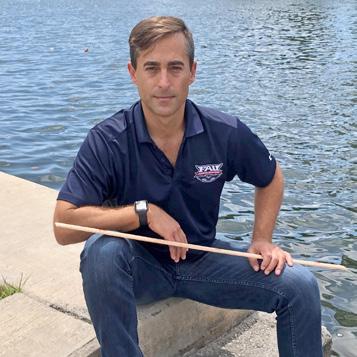
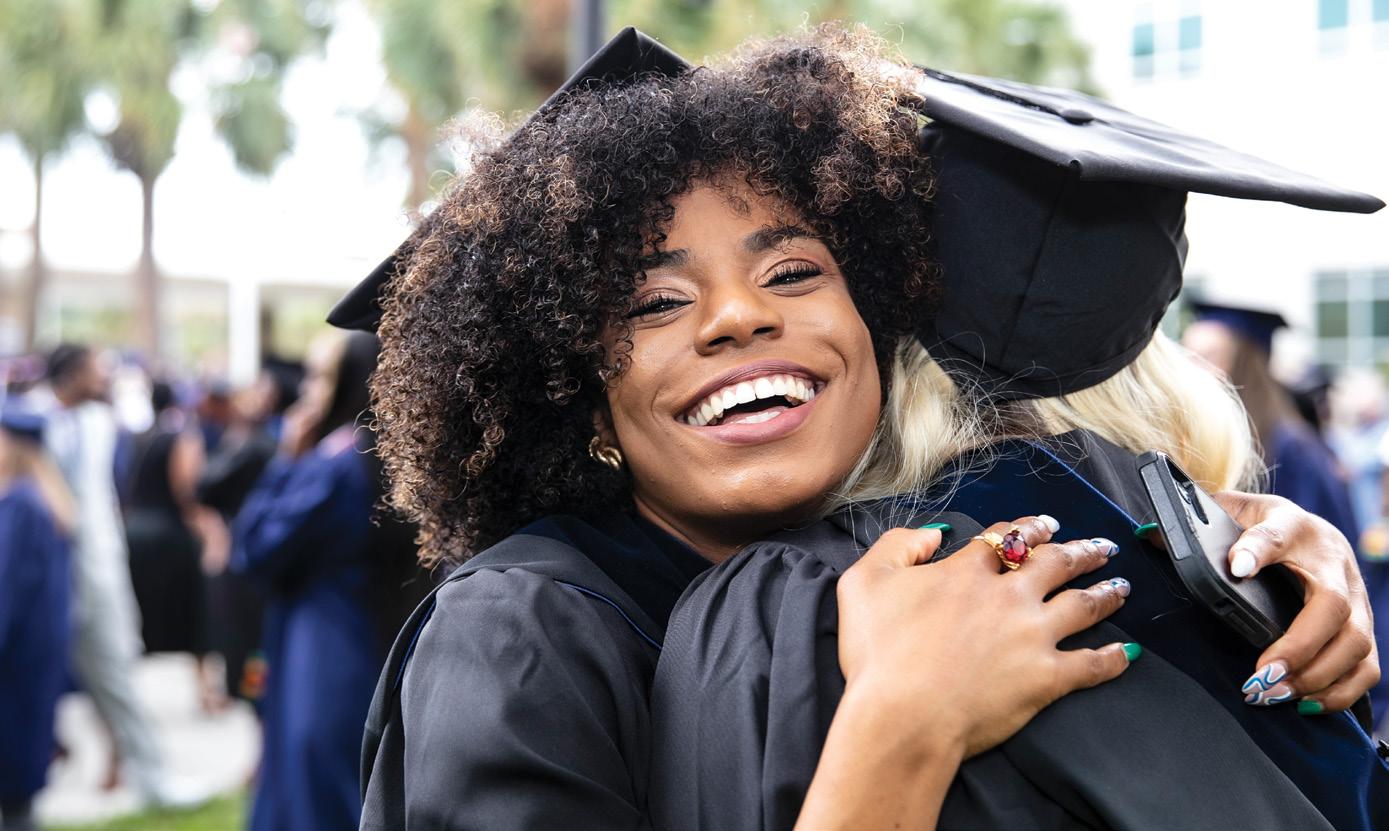
At Florida Atlantic, there are more than 30,000 students pursuing degrees in 170+ courses of study across six South Florida campuses. More than a third of Florida Atlantic’s students are the first in their families to obtain a college degree. Through scholarships that expand opportunity, our students are propelled further than they dreamed possible.
By investing in scholarships, you are helping to empower promising students while also supporting the talent pipeline for South Florida employers, which strengthens our economy and our community.
For more information and to make your contribution, visit transcendtomorrow.fau.edu.



$2.6 Million Grant Launches Cybersecurity Scholarship Program
Cybersecurity professionals work in nearly every sector and industry, including public and private, and from banking and finance to health care and government. However, the United States is facing a major talent gap. In fact, there are more than 570,000 open cybersecurity positions in the U.S. with an increase of 35 percent in just the last year.
To maintain a leading role in cybersecurity, the U.S. needs a robust cybersecurity workforce to develop the next generation of infrastructure and technologies.
Florida Atlantic University’s College of Engineering and Computer Science, in collaboration with its College of Business and Charles E. Schmidt College of Science, received a $2.6 million grant from the National Science Foundation (NSF) to establish a scholarship program in the burgeoning and critical field of cybersecurity. The NSF’s CyberCorps® Scholarship for Service program seeks to increase the number of qualified cybersecurity professionals working for federal, state, local, territorial and tribal governments. The program is managed by the NSF in collaboration with the U.S. Department of Homeland Security. Florida Atlantic is one of only six universities to receive the NSF CyberCorps award this year.
Designed to increase the volume and strength of the nation’s cybersecurity workforce, the program provides full scholarships and stipends to students pursuing studies at the intersection of cybersecurity and AI.
“This dynamic program will help to address an immense shortage of highly trained experts in the field of cybersecurity,” said Hari Kalva, Ph.D., principal investigator, interim chair and professor in Florida Atlantic’s Department of Electrical Engineering and Computer Science. “We have a longstanding commitment to our students as well as robust course offerings related to cybersecurity to make this program a success. We are excited to contribute in developing a highly skilled cybersecurity workforce to address the needs of our nation and state.”
Students recruited for this program will receive a two-year scholarship and training that prepares them for competitive employment in the federal and/or state cybersecurity workforce. In addition to gaining a broad understanding of cybersecurity opportunities, students will be trained to secure jobs in the federal government. They will graduate with deep skills and will serve the nation’s security needs by completing a service obligation for the same duration as their scholarship support.
“This prestigious NSF-funded project, spearheaded by Professor Kalva in collaboration with an outstanding project team, is a testament to the quality of research, academics, collaboration and outreach at FAU,” said Stella Batalama, Ph.D., dean of the College of Engineering and Computer Science. “As cyber threats continue to become increasingly complex, our project will help to prepare a well-trained cybersecurity workforce in Florida that will serve the federal and state government.”
South Florida is host to more than 9.7 million acres of farmland with a revenue of more than $7 billion in recent years. However, there are unique challenges in this region including climate change, extreme weather events, poor soils, pests and disease, and workforce shortages. As such, there is a critical need to train a diverse workforce with new sets of tools and skills to confront these emerging challenges.
To help address the complex issues facing traditional agriculture — and the declining interest of the next generation in food, agriculture and natural resources careers — Florida Atlantic University received a $1 million grant from the United States Department of Agriculture (USDA) to establish the Florida Atlantic Microbiome Innovation Center. It is the first of its kind in South Florida.
The center will develop an innovative curriculum in holistic plant health that will engage undergraduate and graduate students from Florida Atlantic and Florida International University. It also will create a culture collection of indigenous beneficial bacteria whose many applications are at the nexus of environmental, agricultural and public health. The project will integrate soft skill development, stipends and multi-tiered mentoring with experiential learning in cutting-edge microbiome research.
“Growing challenges of food safety, biosecurity and agricultural productivity, or emergence of new pathogens such as citrus greening devastation, plant invasion, climate change and depletion of soil fertility, all have a microbiome undertone that needs to be promptly
addressed by training competent cross-disciplinary professionals,” said Nwadiuto Esiobu, Ph.D., project director, professor of biological sciences, and director of the Esiobu Microbial Biotech Laboratory in Florida Atlantic’s Charles E. Schmidt College of Science. “In virtually every field of science, microbiomes are emerging as key priority themes.”
The grant also will procure a bench top DNA sequencer to drive development of a curated collection of indigenous beneficial microbes from South Florida. Students will isolate, sequence and curate their strains as part of the research experiential programs. The collection will become a valuable asset in customizing probiotics for specific plants in specific ecologies such as wetland grasses, which are experiencing salinity and flooding stress. Currently, there is no such collection in the region.
“Students will experience firsthand applications of emerging technologies working in faculty mentors’ labs, at internship visits with our partners, and shadowing USDA programs and conferences,” said Valery Forbes, Ph.D., dean of the College of Science. “All of these activities will be focused on problem-solving, developing critical thinking skills, and preparing students for careers in the food, agriculture and natural resources fields.”
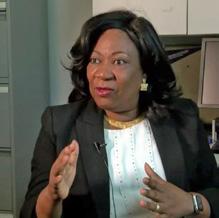

In virtually every field of science, microbiomes are emerging as key priority themes.”
-Nwadiuto Esiobu, Ph.D.
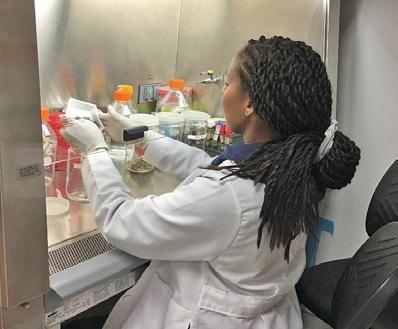


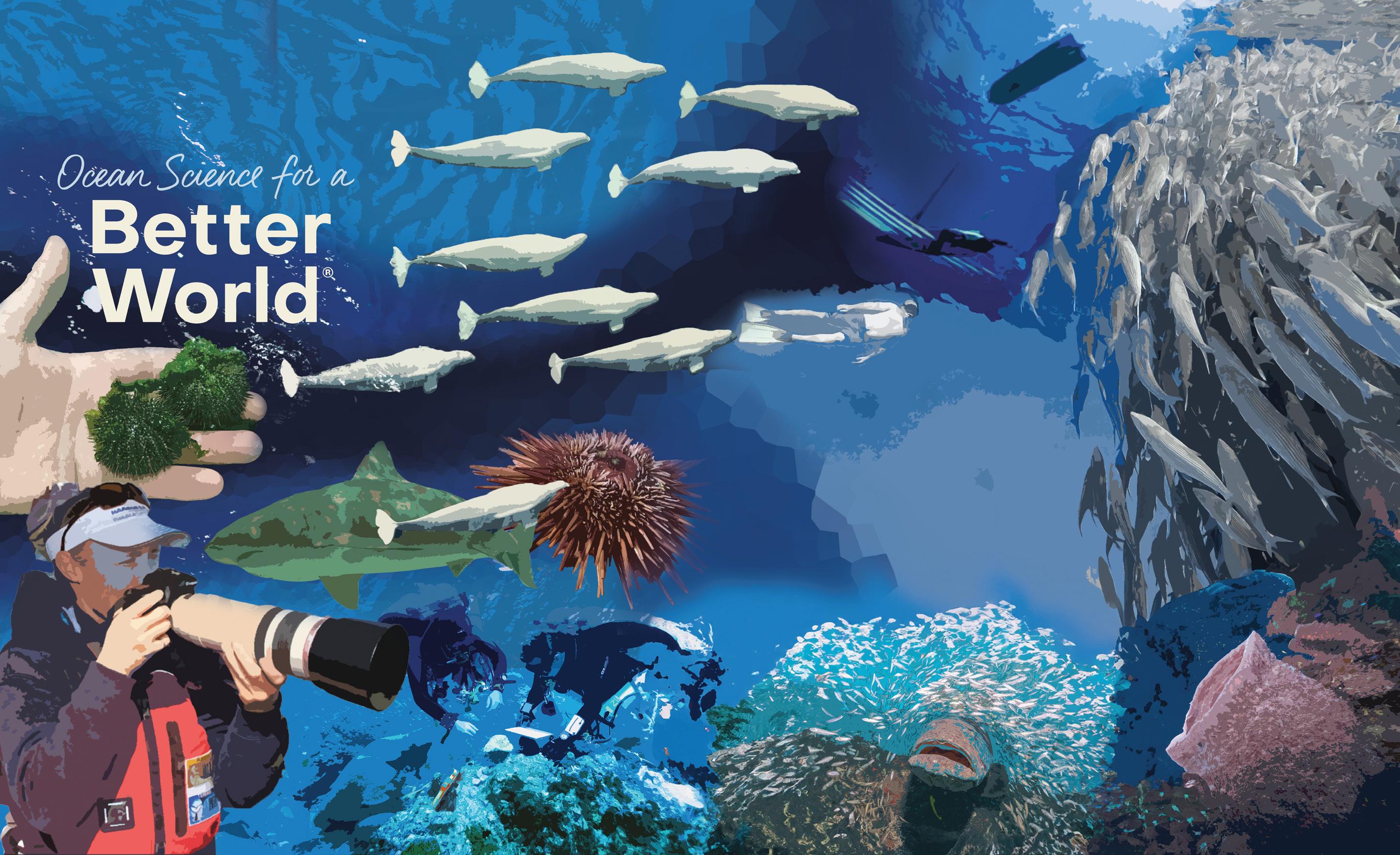
Florida Atlantic Harbor Branch Oceanographic Institute prioritizes solution-oriented research addressing critical issues affecting coastal zones, oceans and human well-being. Research scientists take a global approach, conducting studies worldwide in varying climates, ecosystems and cultures, studying everything from tiny deadly bacteria and harmful algal blooms to critically endangered North Atlantic right whales.
Engineering advanced technology is critical to providing enhanced security across the nation. Harbor Branch works with major defense contractors as well as the U.S. Department of Defense on coastal security projects to improve the Navy’s ability to detect foreign enemies and other ocean-borne threats.

fau.edu/hboi
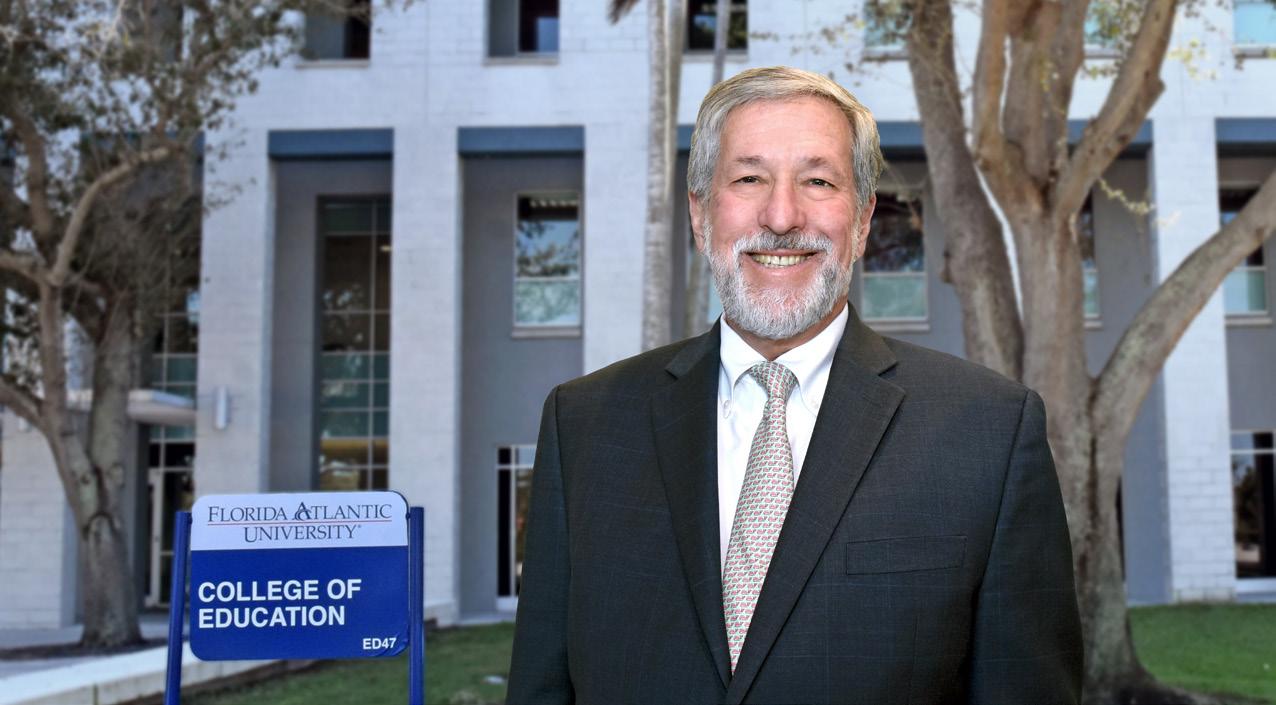
Dean Dedicated to Preparing Effective Instructors
In the world of education, Stephen Silverman, Ed.D., is not just sculpting minds; he’s building the architects of tomorrow’s learning landscape. With a career spanning four decades dedicated to unraveling the art of effective teaching, Silverman continues his mission at Florida Atlantic University’s College of Education as its dean, preparing teachers for the future.
Silverman’s pedagogical path, which began in educating physical education teachers, helped bring in $12.4 million in research grants last fiscal year. That’s the second-highest grant production of any college at Florida Atlantic.
“We need to base what we teach our students on evidence of effective
instruction and other professional practice,” Silverman said. “[Research benefits] our students and the people they work with in their professional practice. Society benefits if we have good teachers, school leaders, counselors and speech pathologists. The college prepares teachers; school leaders; mental health, clinical rehabilitation and school counselors; and speech pathologists based on practical empirical evidence so professionals in that field can apply it or make informed decisions about their practice.”
Before coming to Florida Atlantic in 2019, Silverman taught for 21 years at Teachers College, Columbia University, where he was a professor, department chair and senior advisor to the provost for research preparation. He is now a
professor emeritus. He previously held faculty positions at Louisiana State University, The University of Texas at Austin, and the University of Illinois at Urbana-Champaign.
Florida Atlantic’s College of Education became the first public provider of educational professionals in South Florida in 1964. It currently has the largest teacher education school leaders’ program in Florida’s State University System, according to Silverman.
Under Silverman’s guidance, the Florida Department of Education has recognized the college multiple times as Florida’s top-rated teacher preparation program in elementary education, English as a second language and reading.
Stephen Silverman, Ed.D., dean of Florida Atlantic’s College of Education, is a world-renowned scholar in his field. He has:
• Been cited more than 21,500 times, according to Google Scholar.
• Co-authored 18 books related to teaching and research methods.
• Presented at more than 300 international, national and regional events.
• Published more than 150 chapters and papers, including more than 100 refereed research articles.
• Served as editor of two research journals, including as editor-in-chief of Research Quarterly for Exercise and Sport
• Delivered numerous prestigious lectures, including the 2018 Society of Health and Physical Educators Curriculum and Instruction Scholar Lecture.
• Served in various leadership capacities, including on the Spencer Foundation task force that developed guidelines for the preparation of educational researchers.
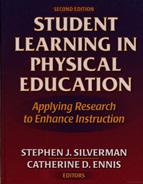
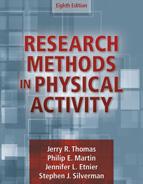
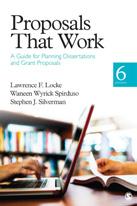
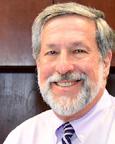
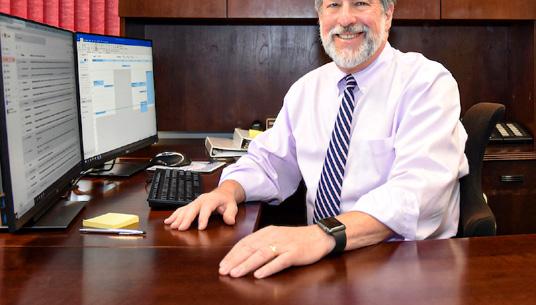

Additionally, the college’s graduate programs were ranked No. 117 in U.S. News & World Report’s list of “Best Graduate Programs” for 2023-24, moving up 46 spots in just two years.
“We’re moving in the direction of a research-based College of Education that produces graduates at the bachelor’s, graduate, specialist and doctoral levels to be practitioners, researchers and university faculty members,” said Silverman. “[My vision is to] keep moving forward at doing professional preparation, scholarship and service to the community and profession at higher levels each year and continue to be recognized as one of the top graduate schools of education in the country.”

Cigarette smoking remains the leading avoidable cause of premature death in the U.S., accounting for approximately 500,000 deaths or 1 in 5 deaths annually. According to the U.S. Department of Health and Human Services, most adults who smoke cigarettes started before age 18, so preventing cigarette smoking in adolescents is important to reducing smoking in adults.
Encouragingly, research from Florida Atlantic University’s Charles E. Schmidt College of Medicine found a dramatic decline in teen smoking from 1991 to 2021. The research was conducted among a large sample of U.S. adolescents in grades nine to 12. It also explored differences by gender as well as race/ethnicity.
Cigarette smoking measures included: ever tried cigarette smoking, which was defined as taking even one or two puffs; currently smoked cigarettes occasionally; currently smoked cigarettes frequently; and currently smoked cigarettes daily.
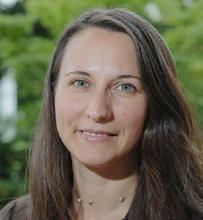
The substantial decrease in cigarette use among U.S. adolescents spanning three decades is an encouraging public health achievement.”
- Panagiota “Yiota” Kitsantas, Ph.D.
The researchers discovered that cigarette smoking in all usage categories (ever, occasional, frequent and daily) significantly decreased throughout the three decades. Key findings from the study revealed:
• Ever use cigarettes significantly decreased from 70.1 percent in 1991 to 17.8 percent in 2021, an almost fourfold decline.
• Occasional cigarette use significantly decreased from 27.5 percent in 1991 to 3.8 percent in 2021, a greater than sevenfold decline.
• Frequent cigarette use significantly decreased from 12.7 percent to 0.7 percent, a greater than eighteenfold decline.
• Daily cigarette use decreased from 9.8 percent in 1991 to 0.6 percent in 2021, a greater than sixteenfold decline.
Interestingly, while all grades experienced a significant decline in cigarette use, 12th graders consistently reported the highest percentage of occasional smokers compared to the other school grades, even in 2021. This finding suggests that while smoking has decreased across all age groups, older adolescents might still be more prone to experimenting with cigarettes than their younger counterparts.
“The substantial decrease in cigarette use among U.S. adolescents spanning three decades is an encouraging public health achievement,” said Panagiota “Yiota” Kitsantas, Ph.D., professor and chair of the Department of Population Health and Social Medicine in the College of Medicine. “This decrease underscores the importance of continued vigilance, research and intervention to further reduce tobacco use and its associated harms.”

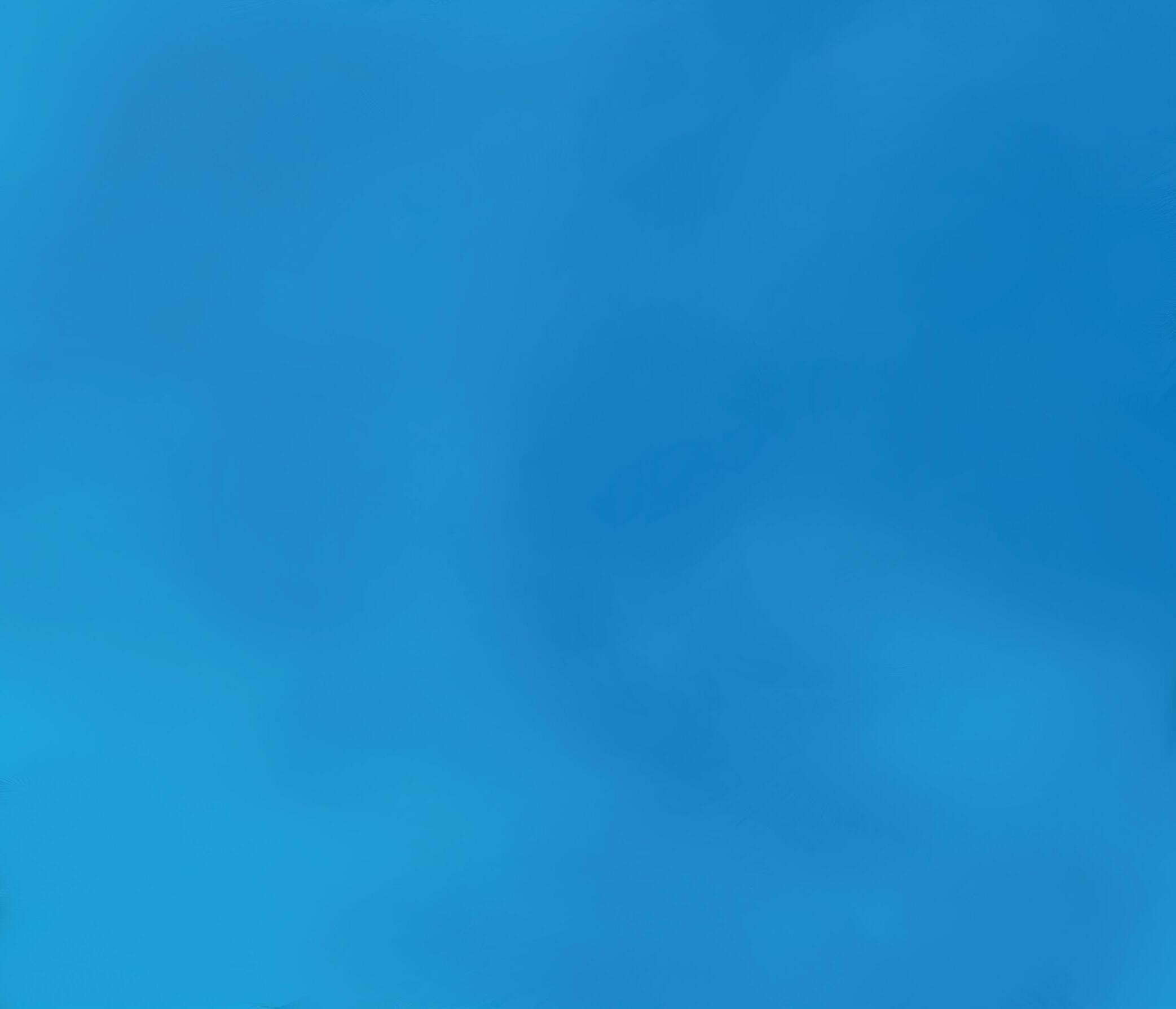
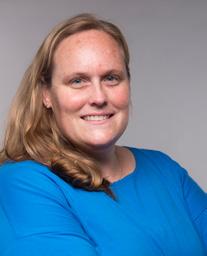
You’ve got this shark doing extreme yoga. What does its backbone look like to make that happen? The ability to CT scan and look at all this 3-D morphology and 3-D anatomy made the current moment a great time in anatomical exploration and discovery.”
Marianne Porter, Ph.D., associate professor of biological sciences in the Charles E. Schmidt College of Science, to The New York Times on her study on the mechanics of “tail-whipping” in thresher sharks.

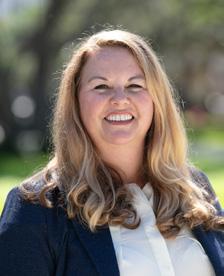
I think we’re all committed to this idea that one of the ways we judge whether we’re worthy is whether we’re busy, whether we’re hard at work, and I think that just extends over into illness. There’s something really embedded in our American psyche that being sick is seen as being weak and choosing to take care of yourself is the wrong priority.”
professor in the
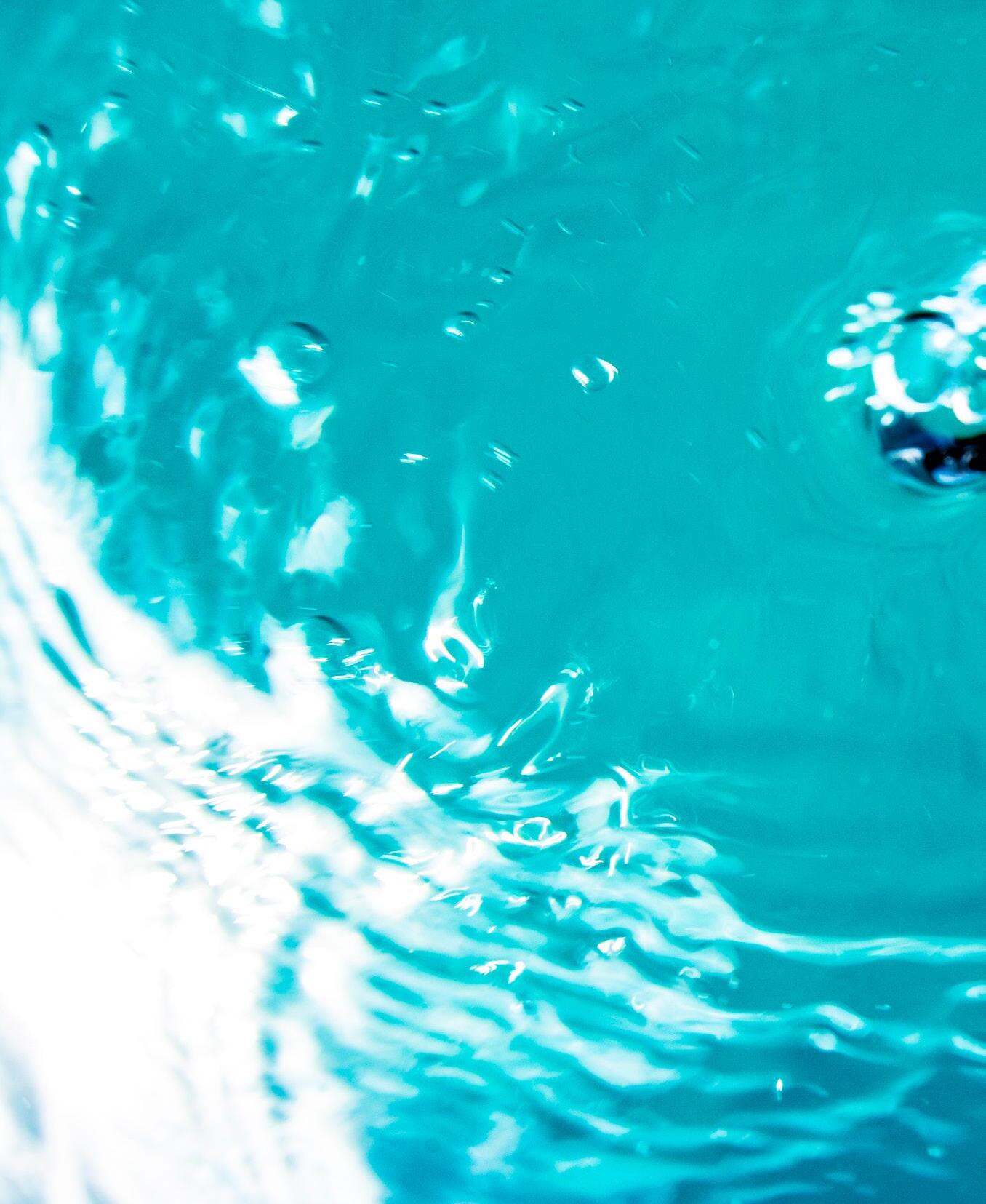
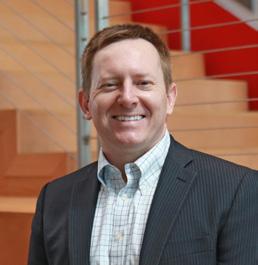
The influx of residents in states like Florida and Texas exacerbates demand for limited resources, particularly housing. Beyond housing, energy prices in Southern regions have also seen an uptick. Despite a nationwide decline in gasoline prices, Southern Florida has seen rising energy costs, which is a product of the influx of residents that have moved to Florida.”
William Luther, Ph.D., associate professor of economics in the College of Business, to Bloomberg on the impact of the influx of residents in states like Florida and Texas, especially on housing.
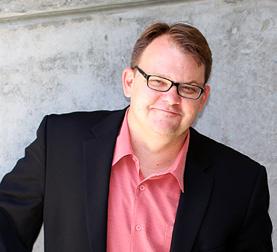
Right turns on red introduce extra movements into the intersection. This leads to drivers crashing into pedestrians who see a green light and think it’s safe to cross, trucks hitting bikers because they can’t see bicyclists making a right turn and rear-end collisions. Banning right on red is not a ‘panacea’ for pedestrian safety problems. But could help prevent pedestrian and car accidents in busy intersections.”
Eric Dumbaugh, Ph.D., professor of urban and regional planning in the Charles E. Schmidt College of Science, to CNN on why the United States has right-on-red turns and whether it is time to stop allowing them.
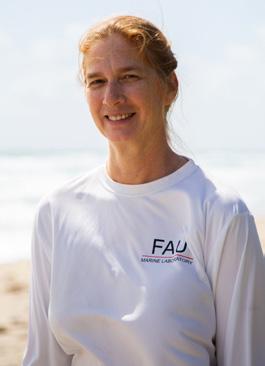
This is a real concern with climate change because there’s already fewer leatherbacks than other turtles, they already have a lower hatchling success, but now we know they actually are going to be impacted by these higher temperatures.”
Sarah Milton, Ph.D., chair and professor of biological sciences in the Charles E. Schmidt College of Science, to the Miami Herald on her study on the impacts of heat and climate change on leatherback sea turtle hatchlings in South Florida.
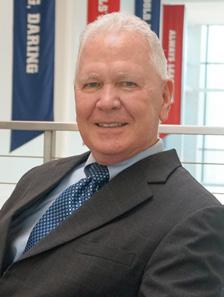
This is going to go on for at least a year, where NPLs (non-performing loans) continue to rise, followed by charge-offs – it’s going to be really ugly. I’m sure that banks are trying to avoid selling their worst properties because that’s going to force them to take a larger write-off, and because every property that’s sold becomes a comparable sale for the appraisers that value the properties.”
Rebel A. Cole, Ph.D., the Lynn Eminent Scholar Professor of Finance in the College of Business, to Reuters on the continued reporting by banks on issues affecting commercial real estate loans.
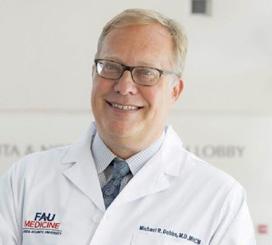

AI isn’t there to replace your doctor, it’s there for us to give you better access and possibly even better outcomes. It should make health care more accurate and more efficient. You should kind of think of it as a smart helpful assistant for your physician.”
Michael Dobbs, M.D., chair of clinical neurosciences and the FairfaxWood Endowed Chair of Clinical Neurosciences in the Charles E. Schmidt College of Medicine, to CBS12 on the promise of artificial intelligence to help fight “silent” killers such as aneurysms.

For the average person, 10,000 steps a day can be a great goal, for others it’s a starting place, and for some it could be too lofty. Ten thousand is not a magic number. There are very few things in health and fitness that have a magic number. If you are fit and do 10,000 low intensity steps and replace that with 8,000 vigorous steps, it probably will be better for you. If 10,000 steps is a benchmark to keep you motivated, go for it.”
Michael Zourdos, Ph.D., chair and professor of exercise science and health promotion in the Charles E. Schmidt College of Science, to the Sun Sentinel on the myth of 10,000 steps a day and if there’s a better walking regimen for your health.
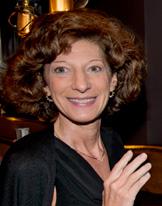
Not everyone can sustain a healthy weight, meet protein and other nutrient needs [like iron], and stay on a vegan diet. Many people on vegan diets are healthy and meeting all their nutrient needs, however, vegans can be at increased risk to suffer from hair loss and general fatigue due to protein or iron deficiencies.”
Sareen Gropper, Ph.D., professor of nutrition in the Christine E. Lynn College of Nursing, to Women’s Health on how much protein women really need.
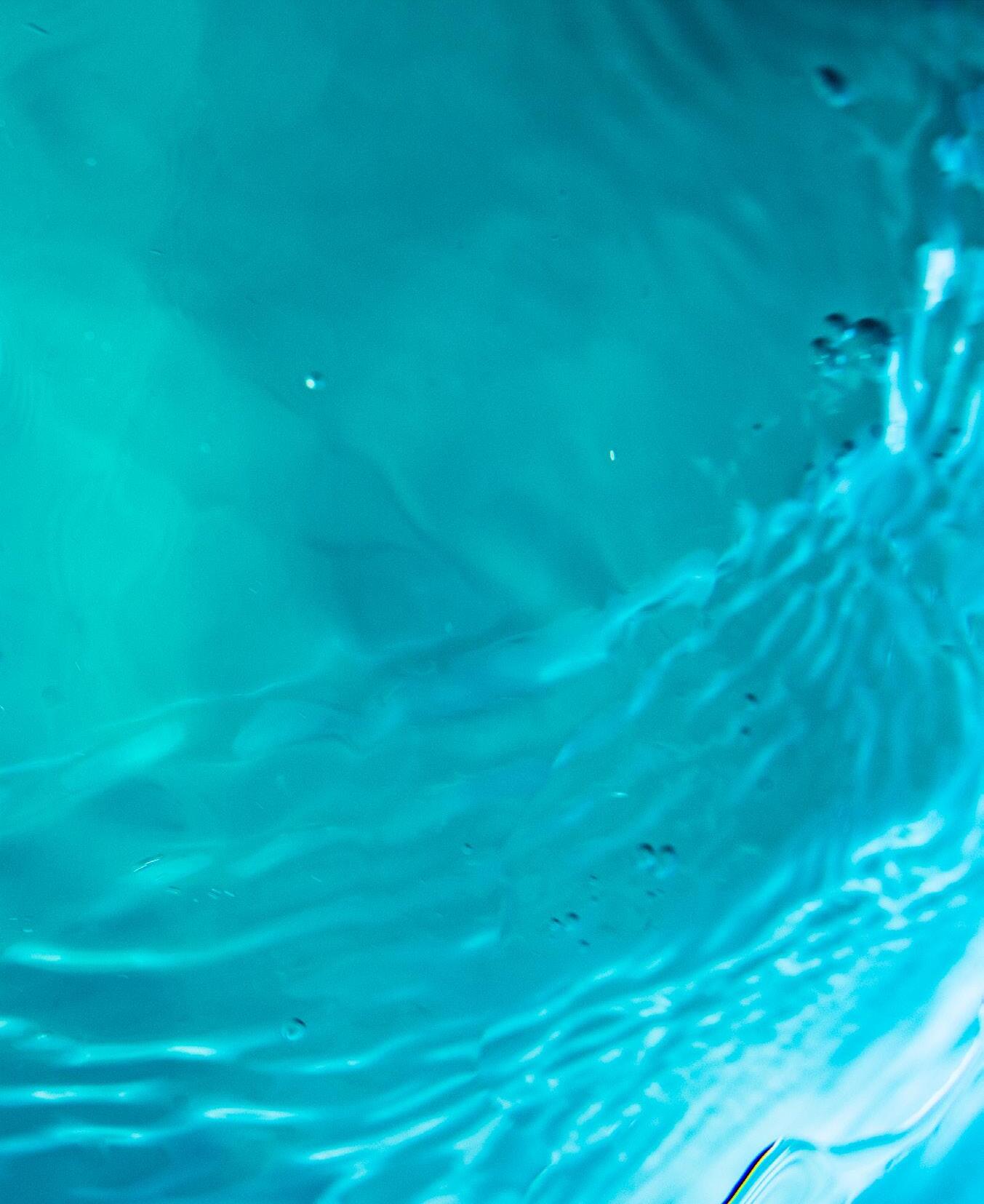
Support for labor unions in Florida is higher than some might expect. My guess is that you’ve seen some union success in the auto industry and of course in Hollywood, and I suspect a lot of people look at that and say … that might be able to raise my income as well. I do think that many Floridians are being squeezed by a number of costs including the high cost of living, housing, insurance, and the union victories suggest some avenues of improving their position.”
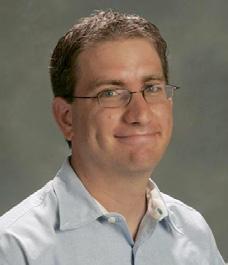
Kevin Wagner, Ph.D., professor of political science in the Dorothy F. Schmidt College of Arts and Letters, to the Sun Sentinel on an assessment based on results of a poll of Florida voters who were asked about unions.
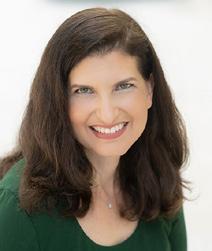
If you can’t picture what an ingredient might look like growing in nature, such as maltodextrin or guar gum, that food is ultra-processed. Almost any food you will get at a fast-food restaurant is going to be ultra-processed, but there are some exceptions. If you are going to get a burger, if you just get the meat and veggies and avoid the bread and sauces, you are eating something much less processed and probably better for you.”
You can’t completely rule it out, but a rogue wave’s formation depends upon storm system and fetch, which means the distance traveled by waves or wind over open water. It’s unlikely for us [in Eastern Florida], but if three swells come together the right way in the right place, it could result in a random sudden event.”
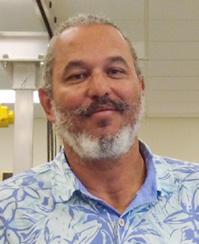
Laurent Chérubin, Ph.D., associate research professor at FAU Harbor Branch Oceanographic Institute, to TCPalm on the possibility of a rogue wave event happening along Florida’s Atlantic Coast.
Despite the prevalence and intensity of cyanobacterial blooms in South Florida, there’s very little data on what happens to people who are exposed. By developing tools to measure concentrations of harmful algal bloom toxins in the environment and multiple human tissues, we will gain a better understanding of health-related outcomes and health needs in Florida and elsewhere.”
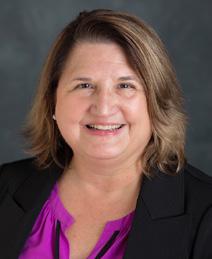
Rebecca Koszalinski, Ph.D., associate professor of nursing in the Christine E. Lynn College of Nursing, to the Sun Sentinel on a study she is spearheading about the effects of toxic algae on human health.

$680M
Florida SBDC at Florida Atlantic University (since 2018) and other Innovation Business Development Programs helped clients acquire $680M through investments, loans, grants and government contracts, through July 2023.
The Florida SBDC at Florida Atlantic University is a member of the Florida SBDC Network, a statewide partnership program nationally accredited by the Association of America’s SBDCs and funded in part by the U.S. Small Business Administration, Department of Defense, State of Florida, and other private and public partners, with the University of West Florida serving as the network's lead host institution. Florida SBDC services are extended to the public on a non-discriminatory basis. Language assistance services are available for limited English proficient individuals.
Florida APEX Accelerator at Florida Atlantic launches as part of the Innovation and Business Development pipeline.
APLU Innovation and Economic Prosperity Universities appoint a Florida Atlantic representative to its committee.
550+
Community members and 25 organization supported between 2021 to 2023 by social innovation and grassroots programs.
12
Locations with consultants, mentors and professionals serving Florida Atlantic’s Innovation and Business Development pipeline.
10K+
Number of businesses that received Florida SBDC at Florida direct business consulting, since 2018.
Florida Atlantic is highly ranked by several leading authorities and is a nationally recognized leader in student success.
#4
MASTER’S IN NURSINGNURSE PRACTITIONER - FAMILY
U.S. News & World Report Best Online Programs
#15
EDUCATIONAL ADMINISTRATION AND SUPERVISION SPECIALTY
#32
#43
MASTER’S IN BUSINESS PROGRAMS (NON MBA)
#49
#20
MASTER’S IN BUSINESS PROGRAMS FOR VETERANS (NON MBA)
BACHELOR’S PROGRAM IN BUSINESS #52
The Princeton Review and Entrepreneur Top programs for entrepreneurship studies
UNDERGRADUATE PROGRAMS:
No. 24 NATIONALLY
No. 2 AMONG PUBLIC UNIVERSITIES IN FLORIDA
No. 5 IN THE SOUTH
Excellence Award from NASPA, the national organization for Student Affairs Administrators in Higher Education
FIRST YEAR CONNECTIONS MENTORING PROGRAM
SILVER HONOREE IN THE CATEGORY FOR COMMUTER, OFF-CAMPUS, MILITARY-CONNECTED, NON-TRADITIONAL, AND RELATED
MASTER’S IN EDUCATION
MASTER’S IN NURSING PROGRAMS Best Colleges Most Affordable Online Colleges #6 IN THE NATION College Consensus The 50 Best Online Colleges & Universities for 2024 #43
GRADUATE PROGRAMS: No. 42 NATIONALLY No. 8 IN THE SOUTH

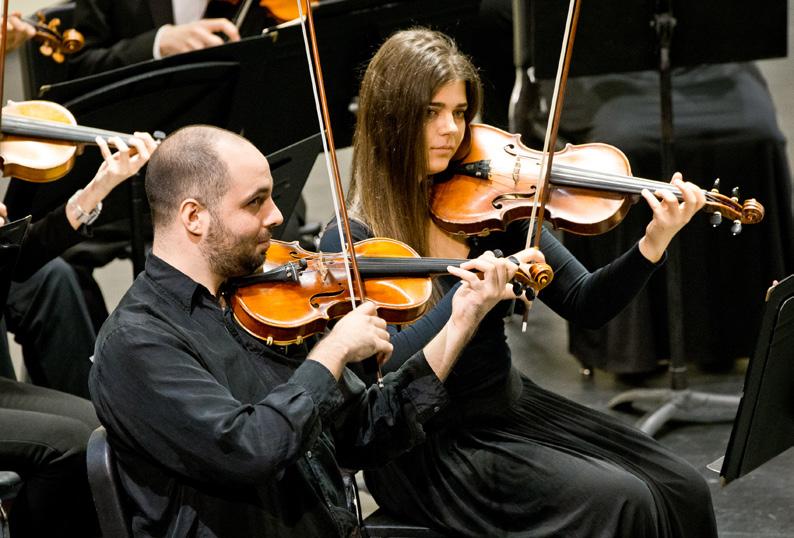

Thanks to a $5 million gift, the musical legacy of The Palm Beach Pops and its founder and music director, the late Bob Lappin, will play on through Florida Atlantic University’s music programs. The gift was donated by the Legacy Foundation of Palm Beach County, an extension of The Palm Beach Pops. It includes assets and an extensive music library of more than 1,600 titles and scores of The Palm Beach Pops.
“For the past three decades, The Palm Beach Pops was an integral part of the performing cultural arts and music education in South Florida,” said Jon Lappin, president and executive director of the Legacy Foundation of Palm Beach County. “This music must be heard and taught, not only because of its rich American roots, but also because it is the result of the massive collaboration of so many musicians, supporters and students. This donation preserves the legacy and extraordinary accomplishments of the maestro – my father, the late Bob Lappin –and The Palm Beach Pops.”
Florida Atlantic’s Department of Music will establish the Bob Lappin and The Palm Beach Pops Music Legacy Endowment to fund scholarships, graduate fellowships and other student financial aid to recruit and retain top music students. The gift also provides financial support for students to purchase higher quality instruments, as well as specialized instruments and pianos within the music department.
“We are extremely grateful to the Legacy Foundation of Palm Beach County and The Palm Beach Pops for this important gift to our Department of Music,” said FAU President Stacy Volnick. “The Palm Beach Pops brought entertainment and joy to listeners of all ages, and we’re proud to recognize its impact and uphold its mission of music education. This gift benefits not only our students but the larger community.”
The Palm Beach Pops music library collection includes archival recordings and programming records of all 30 years of Palm
Beach Pops concerts, including an album and arrangements produced by Michael Zager, renowned Florida Atlantic Dorothy F. Schmidt Eminent Scholar in the Performing Arts, and director of the University’s Commercial Music Program and its Hoot/ Wisdom Recordings label.
In honor of Lappin and The Palm Beach Pops, the University will host an annual legacy concert in which former Pops musicians could perform alongside student musicians. Additionally, Florida Atlantic will establish a public tribute to Lappin and The Palm Beach Pops in the University Theatre lobby with artifacts, photographs and other items on permanent display.
“Bob Lappin and The Palm Beach Pops made an indelible mark on music for both students and the community, and we are proud to carry forward his legacy through our Department of Music,” said Michael Horswell, Ph.D., dean of Florida Atlantic’s Dorothy F. Schmidt College of Arts and Letters.
Green Macroalga Dominates the Indian River Lagoon
Florida’s Indian River Lagoon is in distress. The 156-mile-long estuary was considered one of the last “unpolluted coastal lagoons” back in the 1970s. Now, more than 50 years later, the lagoon is impaired because of nutrients from human waste, fertilizers, stormwater runoff, agriculture, rainfall and submarine groundwater discharge.
As a result of these external sources of nutrients, parts of the lagoon have experienced harmful algal blooms and catastrophic seagrass losses. It also is the epicenter of Florida manatee starvation and deaths.
To better understand factors related to seagrass losses in the Indian River Lagoon, researchers from Florida Atlantic University’s Harbor Branch Oceanographic Institute conducted a unique, long-term monitoring study that examined the cover of seagrass and macroalgae in the lagoon from 2011 to 2020 compared to factors such as nutrients and the chemical composition of macroalgae. Data from the study provide important insight into the drivers of change in the lagoon,
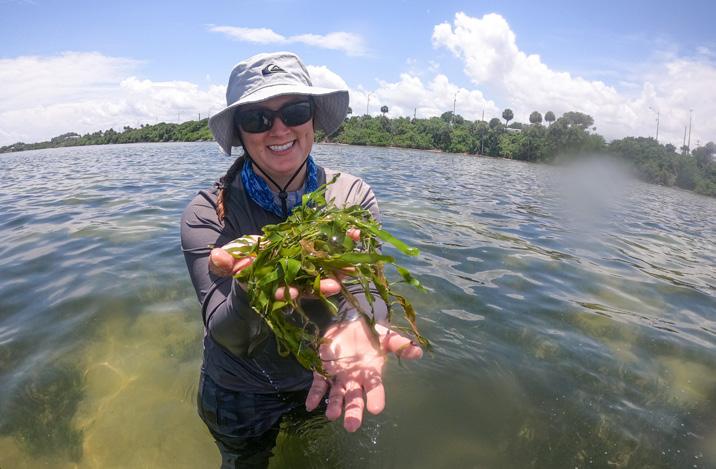
which are necessary for managers seeking to mitigate habitat losses, facilitate recovery and improve resilience.
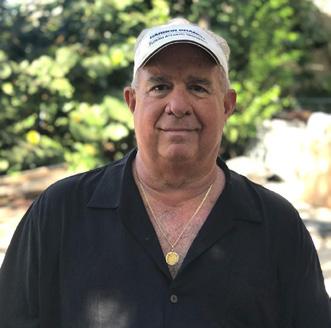
The change in primary benthic cover from seagrass to green macroalgae has the potential to cause cascading ecological effects.”
- Brian Lapointe, Ph.D.Results of the study, published in the journal Ecological Indicators, reveal that since the 2011 blue-green “super bloom,” benthic cover in large parts of the Northern Indian River Lagoon and Banana River has significantly changed from primarily the seagrass Halodule wrightii until 2015, to primarily the green macroalga Caulerpa prolifera after While native to the Indian River Lagoon, C. prolifera acts as an invasive species that can move into new spaces and dominate due to its competitive ability in impaired habitats. Though with the low seagrass cover, competition was likely not a factor in this replacement.
“The change in primary benthic cover from seagrass to green macroalgae has the potential to cause cascading ecological effects, both directly and indirectly,” said Brian Lapointe, Ph.D., research professor at FAU Harbor
Branch. “Caulerpa prolifera produce a toxic bioactive chemical compound that is transformed into more toxic and deterrent oxytoxins and are not a suitable replacement for seagrass in manatee diets. The changing benthic cover in the lagoon also has profound effects on the survival of these important herbivores.”
The increase in C. prolifera was associated with four years of high ammonium concentrations and macroalgal nitrogen isotope values, linking the blooms with the influence of human waste. Ammonium is the predominant form of nitrogen in septic tank effluent that flows into groundwaters and ultimately the lagoon.
“Loss of seagrasses in urbanized estuaries is common, as they are highly susceptible to watershed nutrient and sediment inputs, making seagrasses effective biological sentinels,” said Rachel Brewton, Ph.D., research scientist at FAU Harbor Branch. “Reducing stormwater runoff and inputs of human waste and the associated nutrient load will help promote the recovery of seagrasses in the Indian River Lagoon. Importantly, our study findings have implications for urbanized estuaries experiencing seagrass losses globally.”
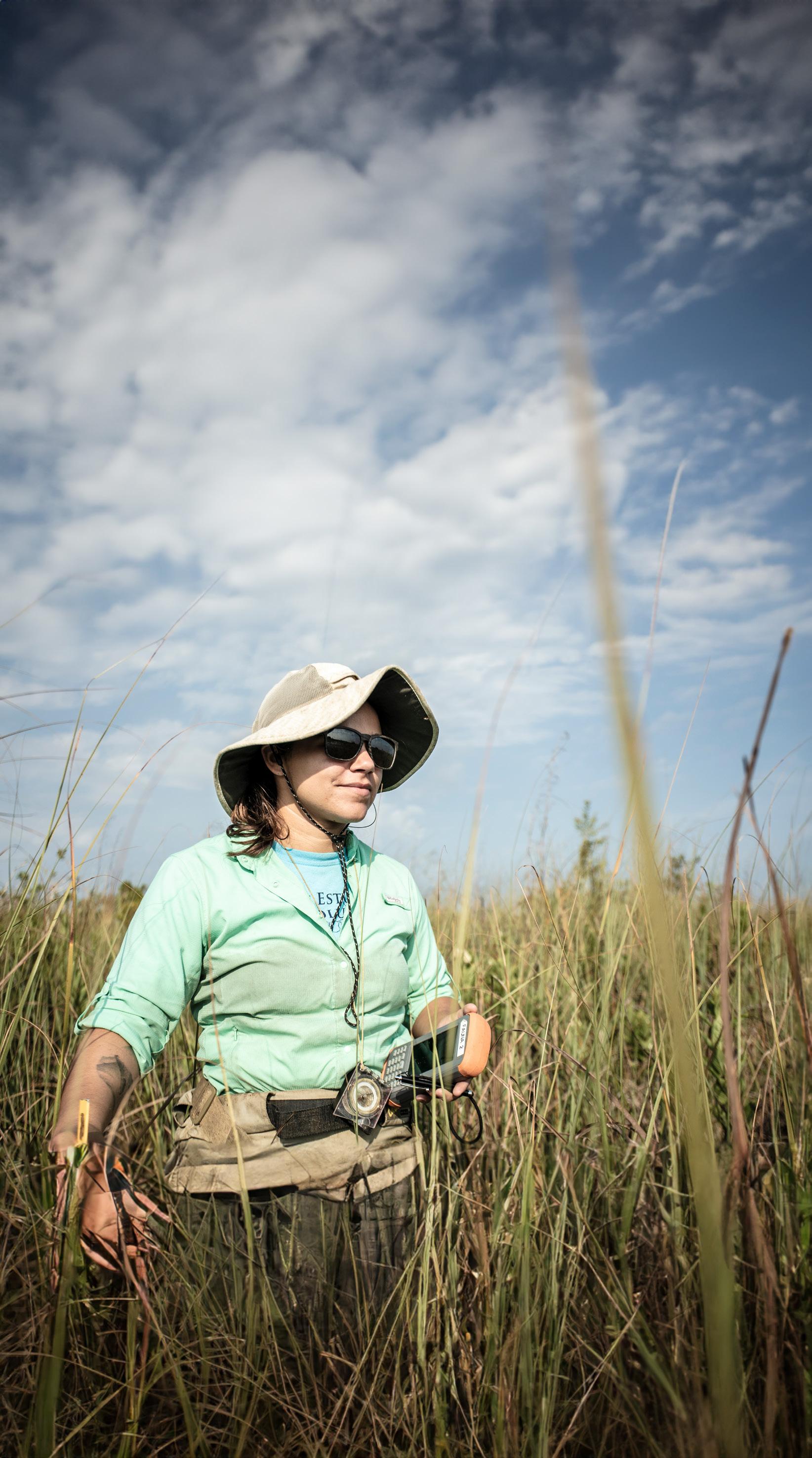

FLORIDA ATLANTIC UNIVERSITY ECOS serves as a comprehensive environmental hub at Florida Atlantic, providing leadership to enhance the resilience of South Florida’s ecological systems and human population with its robust multi-disciplinary programs in environmental education, research, and community engagement. fau.edu/ecos

First Student-managed Investment Fund Launches
Students planning careers in investment management will have the opportunity to practice the craft with a fund created as the result of a $250,000 gift from Dan Davidowitz and Polen Capital Management, LLC. The gift, coupled with a match of $250,000 from the FAU Foundation, launched The Polen Capital-Florida Atlantic University Foundation Student Investment Fund. This marks the first student-managed investment fund (SMIF) for the university.
SMIFs are funds students use to research and invest in stocks, bonds or other financial assets to build a well-diversified portfolio. Students decide which assets to buy or sell with the assistance of faculty or volunteers from investment firms. By providing students with experiential training in investment portfolio management, the college can enhance student placement in competitive internships and permanent positions at large financial institutions.
“Managing a portfolio valued at $500,000 is an amazing learning experience and an excellent conversation starter for students in job interviews,” said Daniel Gropper, Ph.D., dean of Florida Atlantic’s College of Business. “Our proximity to Palm Beach County’s thriving financial hub makes FAU an ideal training ground for future money managers.”
Coined “Wall Street South,” Palm Beach County has experienced massive investment industry growth during the past few years. There are now more than 2,400 financial service firms, including Polen Capital, which is headquartered in Boca Raton.
Polen is a global investment powerhouse with $64 billion in assets and more than 30 years of experience. It also is dedicated to charitable giving and received the 2022 Best Philanthropic Initiative Award from With Intelligence. The firm and Davidowitz, Polen’s lead portfolio
manager, have supported initiatives in the College of Business and the Dorothy F. Schmidt College of Arts and Letters for nearly a decade, including Davidowitz’s service on the College of Business’ advisory board. This most recent gift is the firm’s largest contribution to Florida Atlantic.
The College of Business began offering the three-credit hour investment fund course to all business majors in Fall 2023 through an application process. Unlike a simulation, this rigorous course trains students to participate in real-time financial decision-making using real money. At the end of the semester, students present their stock recommendations and participate in trading. The College of Business is among the exceptional business programs nationwide that offer students an opportunity to manage and administer a welldiversified portfolio.
“Through this matching gift, the FAU Foundation is strengthening this public and private-sector partnership, while creating greater opportunity for our FAU business students,” said Brian Poulin, chair of the FAU Foundation Board.
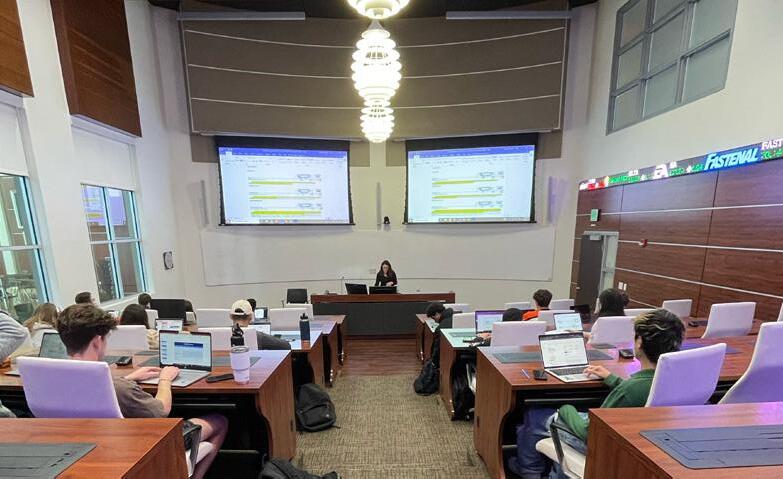



Grant Brings Brain Institute Programs to Broward County
A new partnership between Florida Atlantic University and the Community Foundation of Broward County extends mental health-focused research and educational programs offered by Florida Atlantic’s Stiles-Nicholson Brain Institute, located on the Jupiter campus, to Broward County residents.
Through a four-year, $400,000 grant from the Sharron and Joseph Ashby Hubert Fund of the Community Foundation of Broward, two research projects will be expanded — one focused on stress in early life and one focused on PTSD in veterans. In addition, the grant will expand the Brain Institute’s MobileMinds program, which brings brain science education into classrooms in low-income areas. It also will endow a symposium on advances in brain research and mental health for Broward’s medical professionals and the public.
“The challenges of mental health affect not only individuals but their families and our entire community,” said Sheri Brown Grosvenor, vice president, community impact for the Community Foundation of Broward.
“We’re proud to expand the work of the FAU StilesNicholson Brain Institute to provide education, awareness, and research on mental health challenges to residents in Broward County.”
Over the next four years, the MobileMinds van will expand access to science, technology, engineering
and math (STEM) education in Broward County’s Title 1 middle school classrooms. MobileMinds sparks students’ interest in and understanding of the brain and brain health through hands-on demonstrations of brain structure along with touchscreen and virtual reality-based brain science lessons and activities.

The educational symposium will feature leading researchers on the lifelong consequences of toxic stress — especially in youth and veterans — and paths to resiliency. Planned as an annual event to provide broad access to mental health information, the endowed symposium leaves a legacy for the mission of the Sharron and Joseph Ashby Hubert Fund of the Community Foundation of Broward.
“Finding solutions and providing education are the most effective ways to save and improve the lives of those suffering with mental health and mood disorders, as well as reducing the negative impacts of mental health conditions on people, families and our community,” said Randy Blakely, Ph.D., executive director of the Brain Institute. “Knowledge increases awareness of conditions and symptoms and helps the community recognize when they or someone they know may be at risk.”
Finding solutions and providing education are the most effective ways to save and improve the lives of those suffering with mental health and mood disorders.”
– Randy Blakely, Ph.D.
The United States broke the record for the most mass shootings in a single year in 2023. Because of this staggering statistic, considerable attention has focused on mental illness as a major contributor to these homicides around the country.
Researchers from Florida Atlantic University’s Charles E. Schmidt College of Medicine and collaborators compared deaths from mental illness and gun violence in the U.S., Australia and the United Kingdom and their clinical and public health challenges.
Results, published in The American Journal of Medicine, show that in the U.S., there are approximately 393 million guns owned among the general population of about 335 million people or 1.2 guns per person. In Australia, there are 3.5 million guns among a population of 26.4 million or about 0.13 guns per person, likely a result of new gun laws passed in 2021. In 2022, the U.K. launched a successful gun reform campaign, which included banning assault weapons and handguns.
Findings also reveal that in 2019, self-reports of mental illness were 15.7 percent in the U.S., 17.6 percent in Australia and 13.8 percent in the U.K.

The researchers suggest that the high rates of gun ownership and access to firearms — and not mental illness — seem like more plausible explanations for the disproportionately large number of shootings in the U.S. Furthermore, they opine that if mental illness, which is similar in the three countries, played a major role in gun homicides, one would expect gun homicide rates to be comparably similar. In fact, they are vastly different between the U.S., Australia and the U.K.
“The U.S. is experiencing more than 10 times higher death rates from gun violence than Australia and more than 40 times higher death rates than the U.K.,” said Charles H. Hennekens, M.D., Dr.PH., Sir Richard Doll Professor of Medicine and senior academic advisor in the College of Medicine. “The comparisons between Australia and the U.K. indicate that mental illness is not a major contributor to the increasing trends in death from gun violence in the U.S.”

Medicare insurance fraud topped an estimated $100 billion in 2023, according to the National Health Care Anti-Fraud Association. However, this number is likely much higher due to the number of fraudulent claims that go undetected each year.

Traditional methods of detecting Medicare fraud are time consuming and tedious, with investigators manually inspecting thousands of claims. They have limited time to look for the specific patterns that indicate suspicious behaviors in patient and provider records, and there are not enough investigators to keep up with the various Medicare fraud schemes. Even with technology like machine learning, handling the staggeringly large volume of data remains a significant challenge.
New research from Florida Atlantic University’s College of Engineering and Computer Science addresses this challenge by using artificial intelligence to pinpoint fraudulent activity in the vast sea of Medicare data. And since identification of fraud is the first step in stopping it, this novel technique could conserve substantial resources for the Medicare system.
For the study, which was published in Journal of Big Data, researchers tested two Medicare datasets, Part B and Part D. Part B involves Medicare’s coverage of medical services like doctor’s visits, outpatient care and other medical services not covered under hospitalization. Part D relates to Medicare’s prescription drug benefit and covers medication costs. For both datasets, researchers used a potent data sampling technique and conducted experiments in five scenarios to improve results. The process quickly and successfully identified potentially fraudulent claims.
“Given the enormous financial implications of Medicare fraud, findings from this important study not only offer computational advantages but also significantly enhance the effectiveness of fraud detection systems,” said Stella Batalama, Ph.D., dean of the College of Engineering and Computer Science. “These methods, if properly applied to detect and stop Medicare insurance fraud, could substantially elevate the standard of health care service by reducing costs related to fraud.”
Fluid Dynamics and Deep Learning Could Explain Underlying Causes
Picture it – a life-threatening deluge deposits 20 inches of rainfall within a seven-hour period in the Fort Lauderdale area. While it sounds like a horror movie scene, the historic flash flood in April 2023 was very real, as it wreaked havoc across Fort Lauderdale, Dania Beach and other parts of Broward County. Aside from mass chaos, cars floating down main roadways and hundreds of people stranded, the aftermath of South Florida’s “100-year Flood” also shut down the Fort Lauderdale-Hollywood International Airport for days. Why did this happen?
Identifying the underlying cause of extreme weather events such as floods, heavy downpours and tornadoes is immensely difficult and can take a concerted effort by scientists over several decades to arrive at feasible physical explanations.
At the core of uncovering such extreme events is the physics of fluids – specifically turbulent flows, which exhibit a wide range of interesting behavior in time and space. In fluid dynamics, a turbulent flow refers to an irregular flow whereby eddies, swirls and flow instabilities occur.
Because of the random nature and irregularity of turbulent streams, they are notoriously difficult to understand or to apply order through equations.
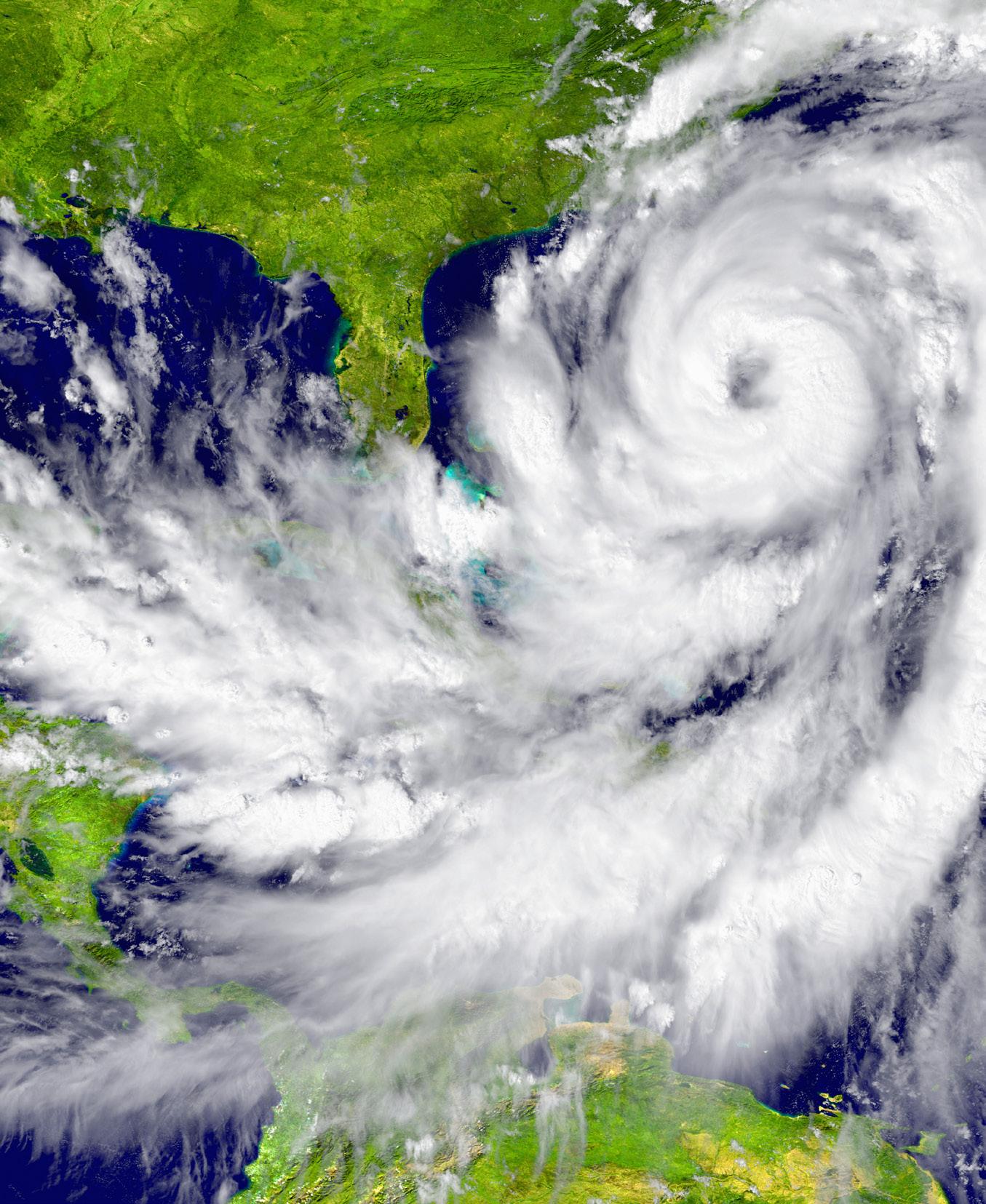
To address these challenges, researchers in Florida Atlantic’s College of Engineering and Computer Science leveraged a computervision deep learning technique and adapted it for nonlinear analysis of extreme events in wall-bounded turbulent flows, which are widespread in numerous physics and engineering applications, and also impact wind and hydrokinetic energy.
Results, published in the journal Physical Review Fluids, demonstrate that the technique the researchers employed can be invaluable for accurately identifying the sources of extreme events in a completely data-driven manner. And the framework they formulated is general enough to be applied to other scientific domains, where the dynamics governing the evolution of critical phenomena may not be known beforehand.
Siddhartha Verma, Ph.D., assistant professor in the Department of Ocean and Mechanical Engineering, was the senior author of the study and Xingquan (Hill) Zhu, Ph.D., professor in the Department of Electrical Engineering and Computer Science, was co-author.
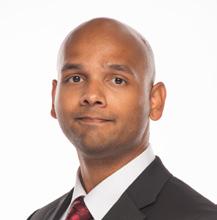
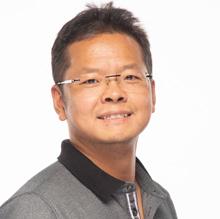 XINGQUAN (HILL) ZHU, PH.D.
SIDDHARTHA VERMA, PH.D.
XINGQUAN (HILL) ZHU, PH.D.
SIDDHARTHA VERMA, PH.D.
Florida Atlantic University’s use of leading-edge student programing has supported students and helped boost graduation rates, highlighting the power of innovation in higher education.”
- Ted Mitchell, president of ACE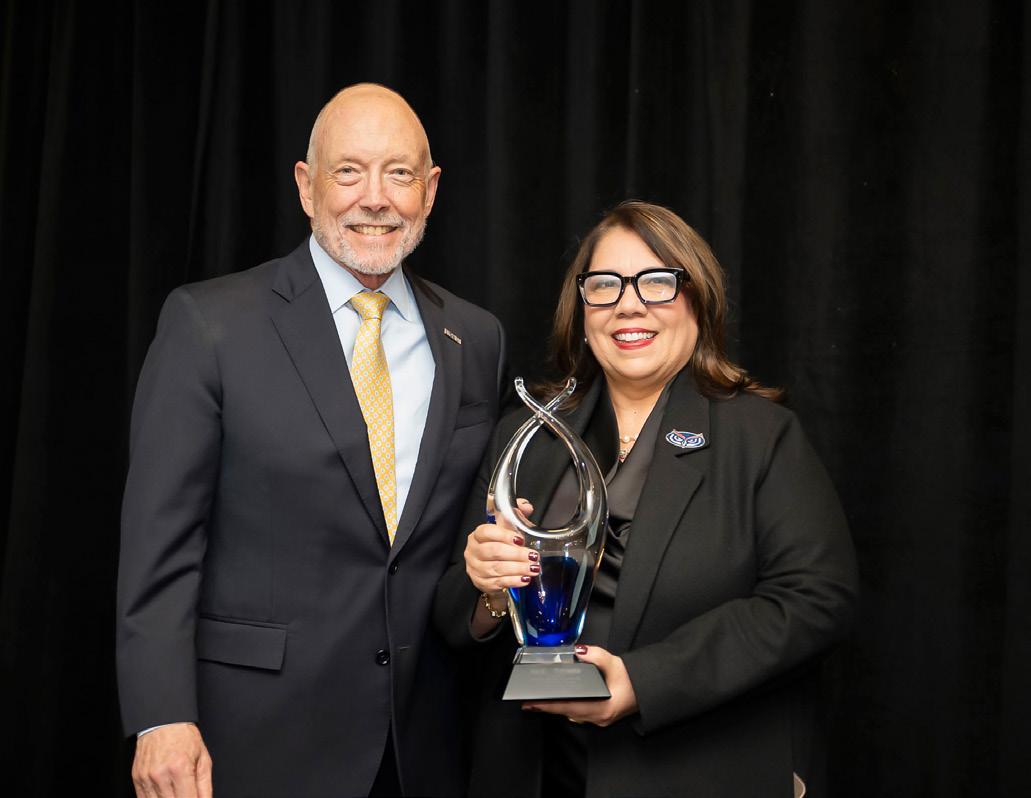
Florida Atlantic Recognized for Innovation in Higher Education
The American Council on Education (ACE) named Florida Atlantic University the winner of the 2024 ACE/Fidelity Investments Award for Institutional Transformation at its Presidents and Chancellors Summit in March. The annual award recognizes two institutions nationwide that, in a period of great change in higher education, have responded to challenges in innovative and creative ways, and achieved dramatic results. Florida Atlantic won in the category of institutions with student populations of at least 12,001. The University of California, Merced was awarded for institutions with student populations up to 12,000.
“I am thrilled to be able to present this award to two outstanding institutions that have flourished in the face of adversity,” said Ted Mitchell, president of ACE. “Florida Atlantic University’s use of leading-edge student programing has supported students and helped boost graduation rates, highlighting the power of innovation in higher education.”
ACE is the major coordinating body for the nation’s higher education institutions, with more than 1,600 members including colleges and universities, related associations, and other organizations in America and abroad. ACE’s mission is to mobilize the higher education community to shape effective public policy and foster innovative, high-quality practice.
“These universities are tackling head-on the challenges being faced by their current and prospective students to both enroll and complete their education programs, and their efforts are truly making a difference in the lives of these students,” said Sangeeta Moorjani, executive vice president and head of tax-exempt business and retirement solutions at Fidelity.
In 2014, Florida Atlantic determined that it needed to take targeted action to increase its retention and graduation rates. Since then, it has seen a steady improvement in both metrics. Using a novel approach called team-based analytics, the University increased the number of bachelor’s degrees awarded by more than 950 annually. Additionally, nearly 3,000 students graduated in the past five years who otherwise would not have finished. As a result, Florida Atlantic’s four-year graduation rate is more than double what it was five years ago, with no student left behind based on income, race or first-generation status.
“It truly is an honor to receive the ACE/Fidelity Investments Award for Institutional Transformation,” said FAU President Stacy Volnick. “I am so proud to accept this award on behalf of Florida Atlantic’s faculty and staff, who work tirelessly to ensure our students succeed. Thank you to ACE and Fidelity Investments for recognizing their efforts.”
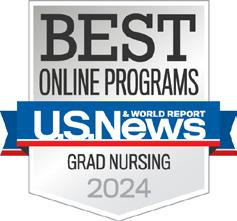
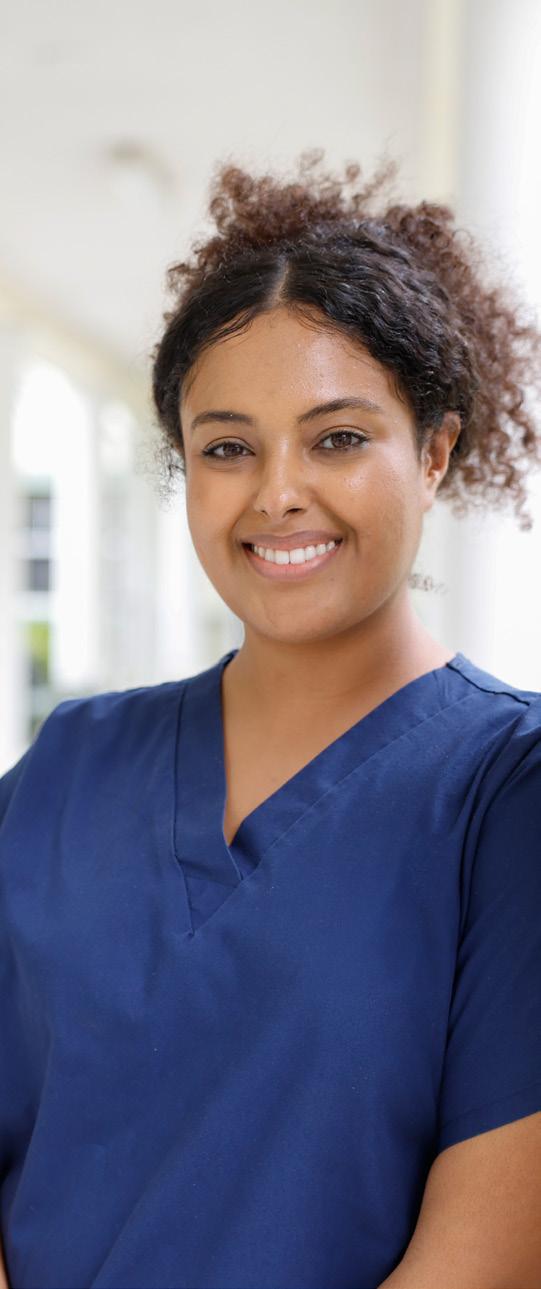
RN-to-BSN (Online)
Master of Science in Nursing
• Advanced Holistic Nursing (Online)
• Nurse Administration and Financial Leadership (Online)
• Nurse Educator (Online and Inperson once a year intensive)
• Nurse Practitioner (psychiatric mental health nurse practitioner, adult/gerontological nurse practitioner, family nurse practitioner)
• Nurse Educator (Online and Inperson once a year intensive)
Doctor of Nursing Practice (DNP)
• Online, part-time post graduate program with classes held one weekend day per month
• Full-time BSN to DNP program in family, adult/gerontological, or psychiatric mental health nurse practitioner
Doctor of Philosophy (PhD)
• Online, with classes held one weekend day per month
Certificate Programs
• Telehealth
• Dermatology CE Program
• Telemetry/Progressive Care
• Compassionate Care of Older Adults at Risk for or Experiencing Dementia




New AI Counting Method Could Help Florida’s Manatees 1 9 10 4 7 8 6 2 3 12 5 11

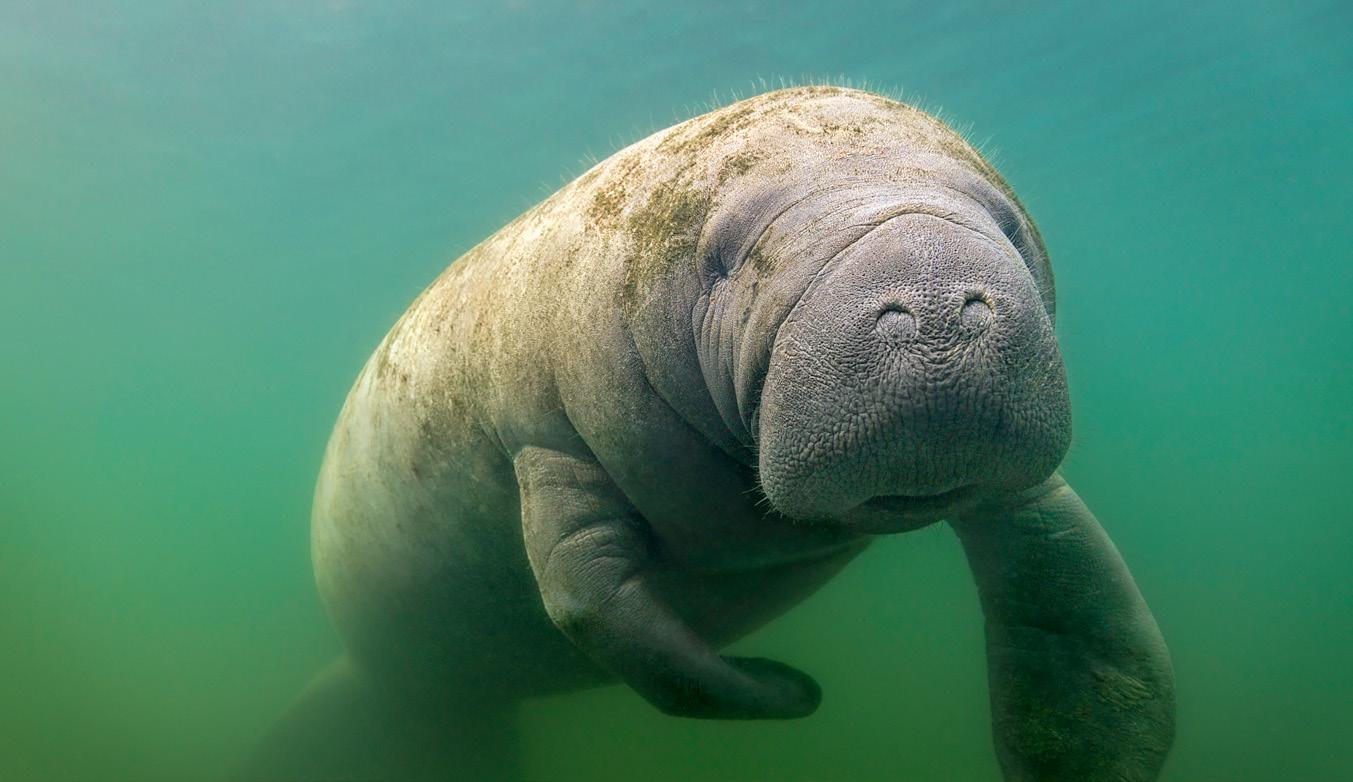
Manatees can be found from Brazil to Florida to the Caribbean islands. Some species, including the Florida manatee, are considered endangered by the International Union for Conservation of Nature.
Manatees have voracious appetites and often spend up to eight hours a day grazing for food within shallow waters, making them vulnerable to environmental changes and other risks.
Accurately counting manatee aggregations within a region is not only biologically meaningful in observing their habitats, but also crucial for designing safety rules for boaters and divers, as well as scheduling nursing, intervention and other plans. Nevertheless, counting manatees is challenging.
Because manatees typically live in herds, they often block each other when viewed from the surface. As a result, small manatees are likely to be partially or completely blocked from view. In addition, water reflections tend to make manatees invisible, and they also can be mistaken for other objects such as rocks and branches.
While aerial survey data are used in some regions to count manatees, this method is time-consuming and costly, and the accuracy depends on factors such as observer bias, weather conditions and time of day. Moreover, it is crucial to have a low-cost method that provides a real-time count to alert ecologists of threats early, to enable them to act proactively to protect manatees.
Researchers from Florida Atlantic University’s College of Engineering and Computer Science harnessed the power of AI to help save the

beloved manatee. They are among the first to use a deep learning-based crowd counting approach to automatically count the number of manatees in a designated region, using images captured from CCTV cameras, which are readily available, as input. Their pioneering study not only addresses the technical challenges of counting in complex outdoor environments, but also offers potential ways to aid endangered species.
To determine manatee densities and calculate their numbers, researchers used images captured from Save the Manatee Club surveillance videos from the water surface. They then used a unique design matching the shape of manatees – Anisotropic Gaussian Kernel (AGK) – to transform the images into manatee-customized density maps, representing manatees’ unique body shapes.
“Our method considered distortions caused by the perspective between the water space and the image plane. Since the shape of the manatee is closer to an ellipse than a circle, we used AGK to best represent the manatee contour and estimate manatee density in the scene,” said Xingquan (Hill) Zhu, Ph.D., professor in the Department of Electrical Engineering and Computer Science. “This allows density maps to be more accurate than other alternatives in estimating manatees’ numbers.”
The new methodology also provides a promising trajectory for broader applications, especially for convex-shaped objects, to improve counting techniques that may foretell better ecological results from management decisions.
Celsius Holdings Inc.’s CEO John Fieldly and nine members of his executive leadership team recently engaged in a town hall discussion with more than 100 Florida Atlantic College of Business students, faculty and staff. The executives spoke about the Boca Raton-based company’s journey to success, giving an insider view into how Celsius evolved from penny stocks to a Wall Street sensation.
Celsius got its start in 2004 with the backing of Florida Atlantic donor and philanthropist Carl DeSantis and has since emerged as a key player in the energy drink market. Celsius took 2023 by storm, breaking records with a reported second-quarter revenue of $326 million, a staggering 112 percent increase from the previous year. The gross profit for the same quarter skyrocketed to $159 million, a substantial leap from $59 million in 2022.
Gaby Rodriguez, a business student and president of Florida Atlantic’s Global Business Association (GBA) – a student organization promoting undergraduate education in international business – met Fieldly during a chance encounter. They exchanged contact information, and thanks to Rodriguez’s tenacity, she and Fieldly eventually connected and he accepted her invitation to speak at Florida Atlantic.
Rodriguez and seven other GBA board members, under the guidance of faculty advisor David Herst, Ph.D., senior instructor in the College of Business, organized the discussion, which took place at the college’s Executive Education facilities.
The Celsius executives shared insights on crucial business topics, including supply chain management, guerrilla marketing, social media impact and maintaining a worklife balance. Beyond financial triumphs, the team also discussed lessons learned through failures, and emphasized the importance of developing a strong work ethic. After a question-and-answer session, students mingled with the executives, experiencing a valuable networking opportunity with industry leaders.
“Enriching exchanges like this one connect our business community with aspiring young minds, giving students a glimpse into the intricacies of running a successful
international corporation,” said Daniel Gropper, Ph.D., dean of the College of Business. “This event exemplifies the collaboration between the business community and the business school that we foster at Florida Atlantic. We thank Celsius’ exceptional leadership team for sharing their valuable time with us as well as their fabulous products. What a great South Florida company.”
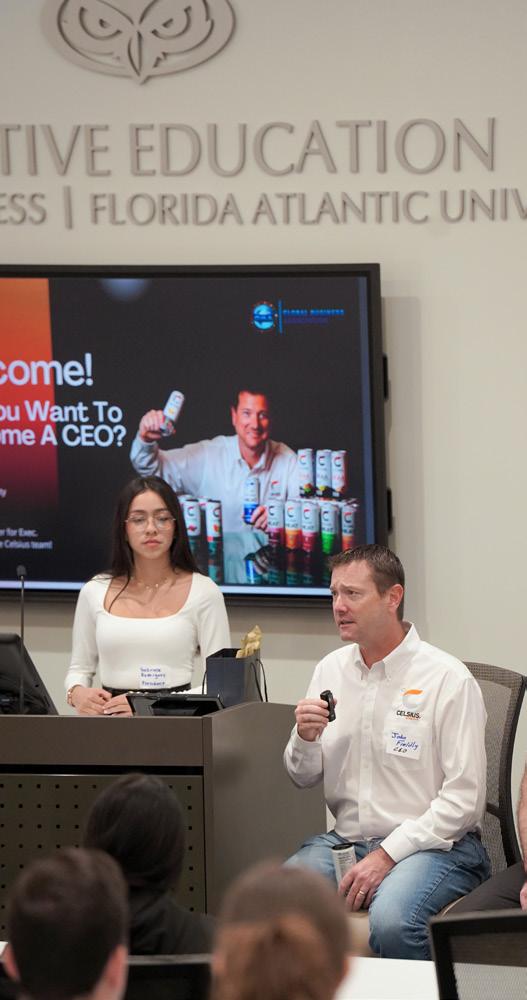
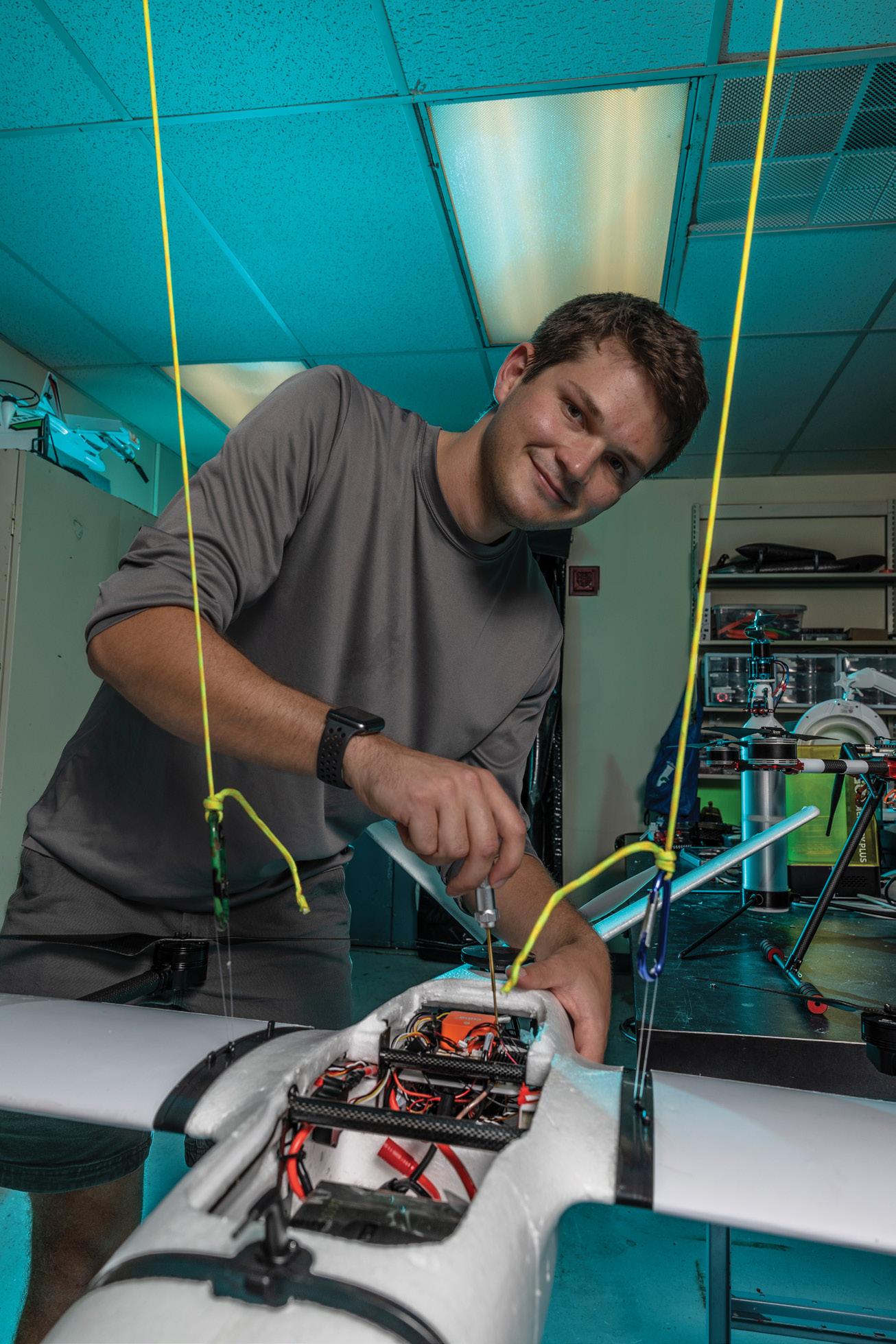
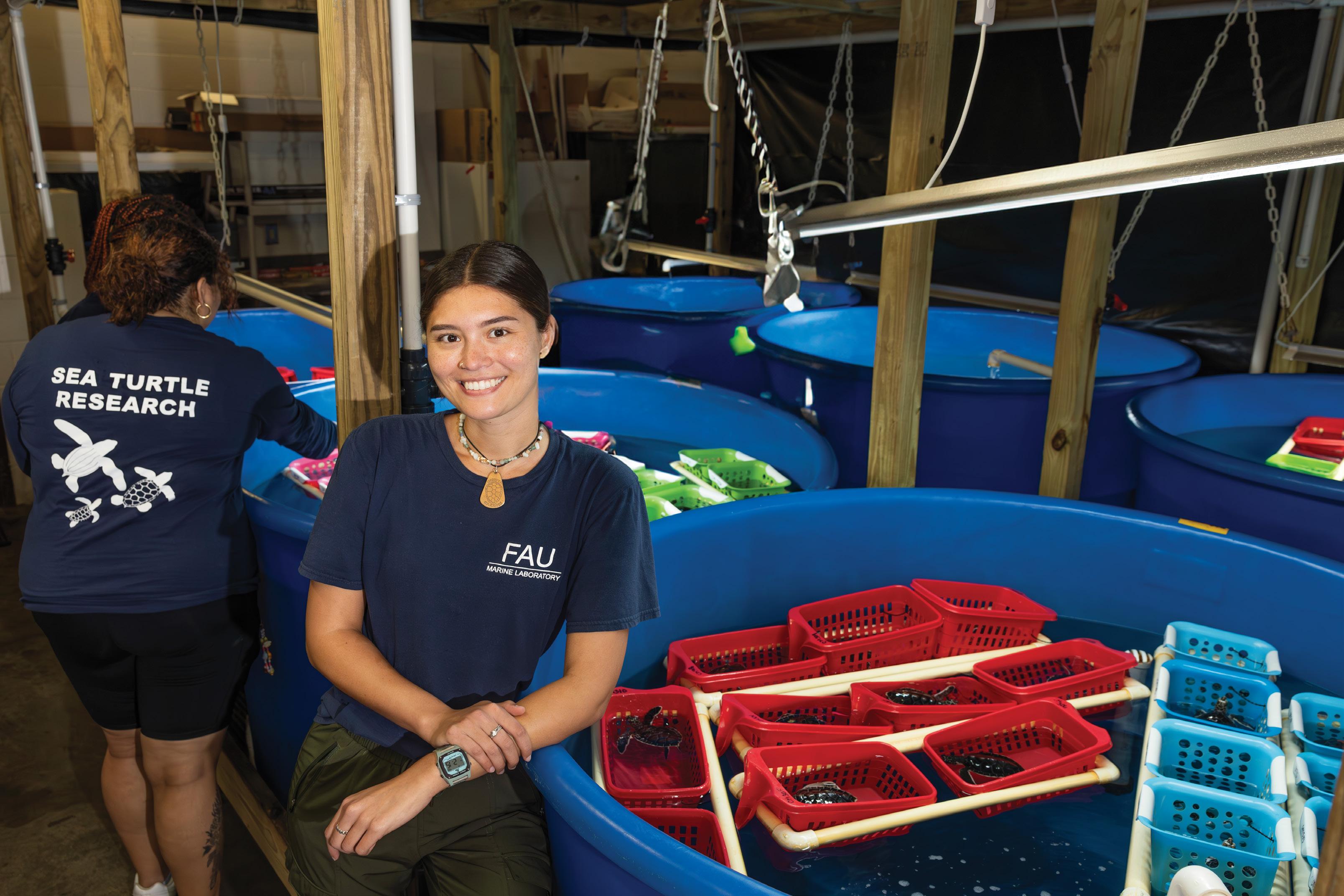
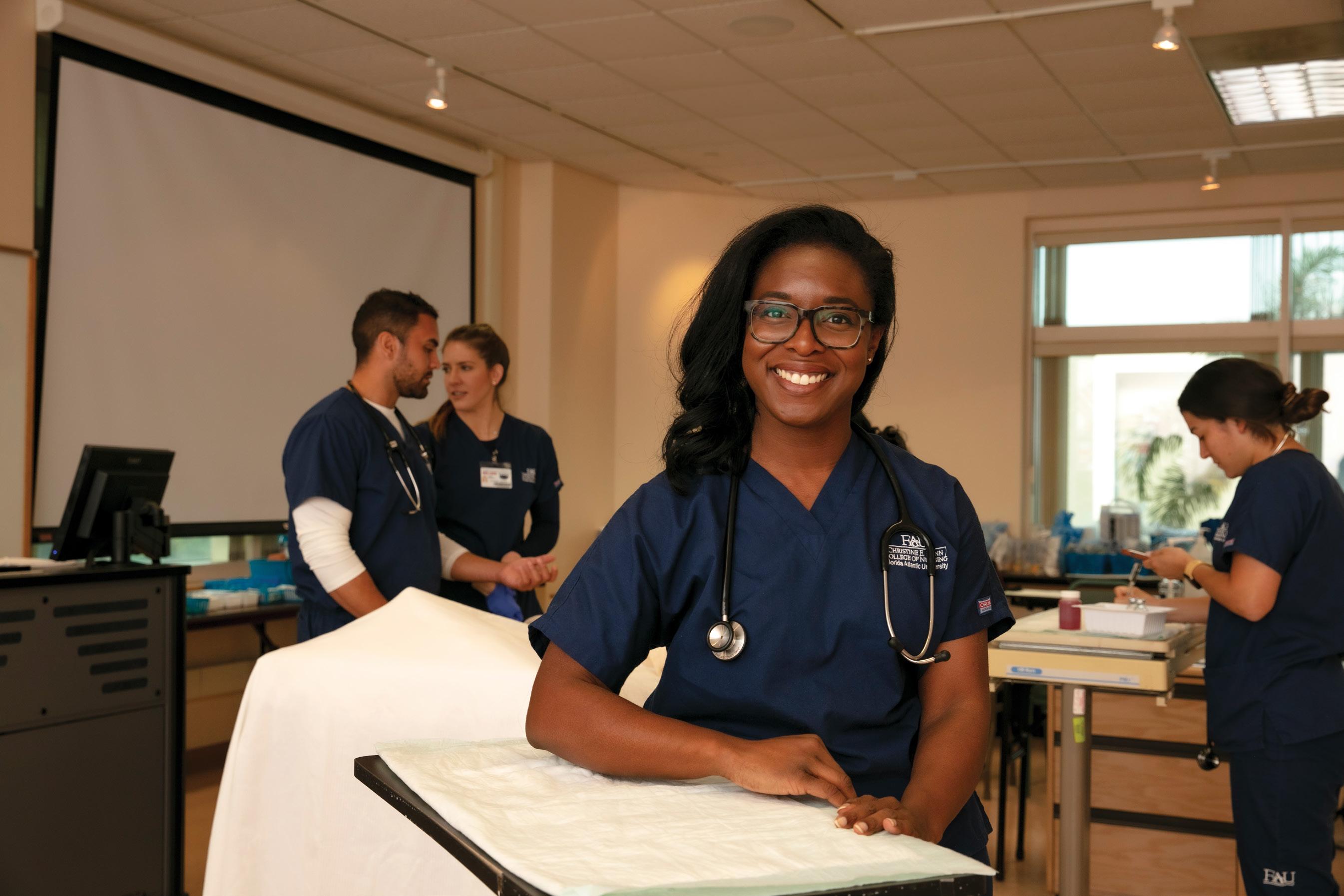



Florida Atlantic faculty, staff and students go above and beyond in the workplace, community and around the world to make a difference. Their work does not go unnoticed. Here’s a look at some of the prestigious accolades and awards earned across Florida Atlantic’s campuses.
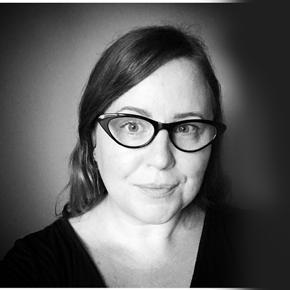
SHARON HART, M.F.A., associate professor of visual arts and art history in the Dorothy F. Schmidt College of Arts and Letters, received a prestigious SECAC Artist Fellowship. SECAC (formerly the Southeastern College Art Conference) is an organization devoted to the promotion of art in higher education through facilitating cooperation among teachers and administrators in universities and colleges‚ professional institutions and the community served by their institutions. Hart’s work explores ecology, ephemerality and collaboration with the natural world through experimental and cameraless photography.
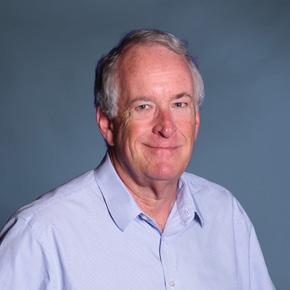
ROLAND KIDWELL, PH.D.,
DeSantis Distinguished Professor of Management/Entrepreneurship in the College of Business, was named a Fulbright U.S. Scholar for the 202324 academic year. He will conduct entrepreneurship research on the “Dysfunctional Behavior in Family Firms” at Hasselt University in Belgium.
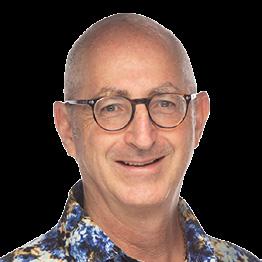
ALLAN BARSKY, PH.D., professor in the Phyllis and Harvey Sandler School of Social Work in the College of Social Work and Criminal Justice, is the 2024 recipient of the Stanley Cohen Distinguished Research Award from the Association of Family and Conciliation Courts (AFCC). The award recognizes research achievement in the field of family and divorce. AFCC is the premier interdisciplinary and international association of professionals dedicated to the resolution of family conflict.

JOSEPH CHOMA, PH.D., director of the School of Architecture in the Dorothy F. Schmidt College of Arts and Letters, received the 2023 Innovative Research Award of Excellence from ACADIA, the Association for Computer Aided Design in Architecture. The ACADIA award recognizes innovative research that contributes to the field of computational design in architecture. It is internationally recognized as one of the highest honors in the field.
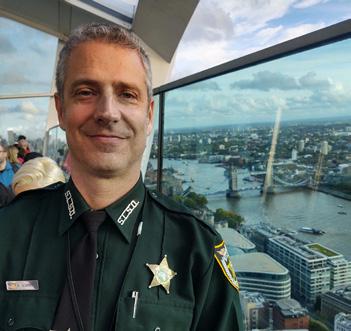
ADAM DOBRIN, PH.D., associate professor in the School of Criminology and Criminal Justice in the College of Social Work and Criminal Justice, was elected second vice president of the Volunteer Law Enforcement Officer Alliance (VLEOA). The VLEOA is the leader in training and support of reserve and auxiliary law enforcement officers worldwide.

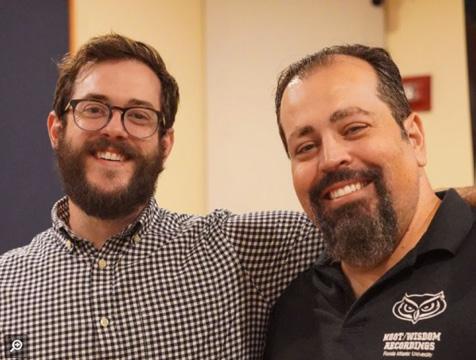
ALEJANDRO SÁNCHEZSAMPER, PH.D., left, professor, and MATT BALTRUCKI, PH.D., associate professor, both in the Department of Music in the Dorothy F. Schmidt College of Arts and Letters, earned a 2023 Latin Grammy nomination for their album “El Trebol Agorero.” Nominated in the Best Folk Album category, the album is by the Quinteto Leopoldo Federico, a tango quintet from Bogotá, Colombia. This is Quinteto Leopoldo Federico’s fourth Latin Grammy nomination for an album that has been recorded by Sánchez-Samper and Baltrucki.
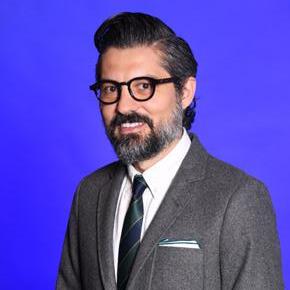
ANIL BILGIHAN, PH.D., associate professor of marketing/ hospitality management in the College of Business, was named a Fulbright U.S. Scholar for 2024. He will conduct research and lecture on “Smart Tourism to Promote the Improvement of Economic, Social and Environmental Tourism” at the Universidad de Las Palmas de Gran Canaria in Spain.
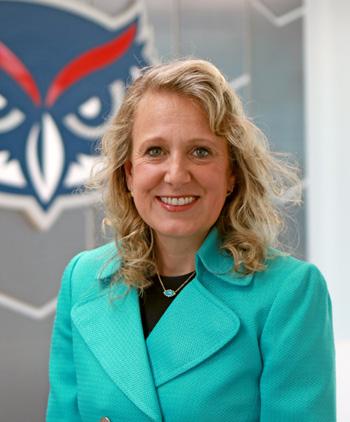
SIRI TERJESEN, PH.D., associate dean for research and external relations in the College of Business, won best article in Academy of Management Perspectives. The article, “Capitalism, Cronyism and Management Scholarship: A Call for Clarity,” focuses on defining capitalism. Additionally, Terjesen, who is founding executive director of the Madden Center for Value Creation and a Phil Smith Professor of Entrepreneurship, received the 2023 Distinguished Researcher award from the Research Park at Florida Atlantic at its annual Awards and Celebration of Entrepreneurship event.
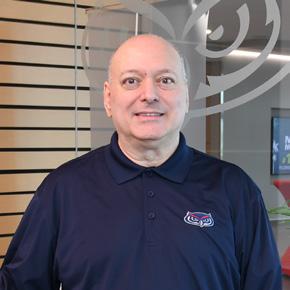
PETER RICCI, ED.D., director of Florida Atlantic’s hospitality and tourism management program in the College of Business, was named to three lists of distinguished professionals in 2023 by the International Hospitality Institute. The Plano, Texas-based organization named Ricci one of the nation’s 100 most influential people in U.S. travel and hospitality; one of the 100 most inspirational people for travel and hospitality; and one of the 30 most influential hospitality educators.
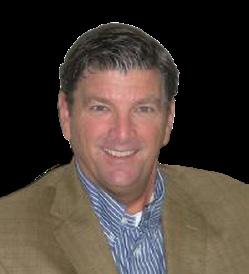
STEVE D. ENGLE, PH.D., professor in the Dorothy F. Schmidt College of Arts and Letters and associate provost for academic personnel for Florida Atlantic, was honored by the Seven & Eight Park Street Foundation and the Union Club of Boston with the Governor Andrew Award for his latest book, “In Pursuit of Justice: The Life of John Albion Andrew,” published by the University of Massachusetts Press. The award is given to promote and recognize scholarship in research and publication to increase the public’s knowledge of the Civil War and the Reconstruction Era.
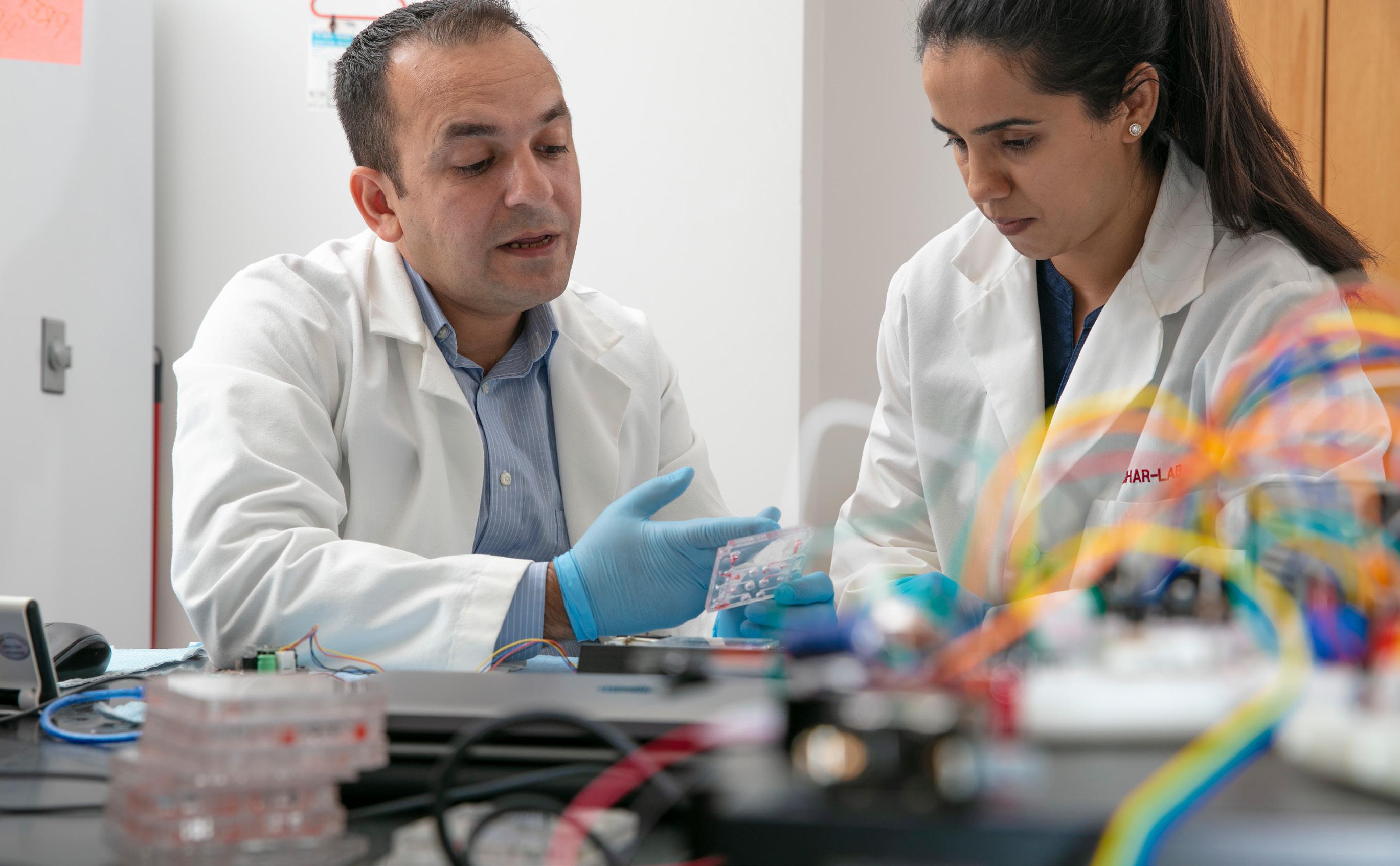

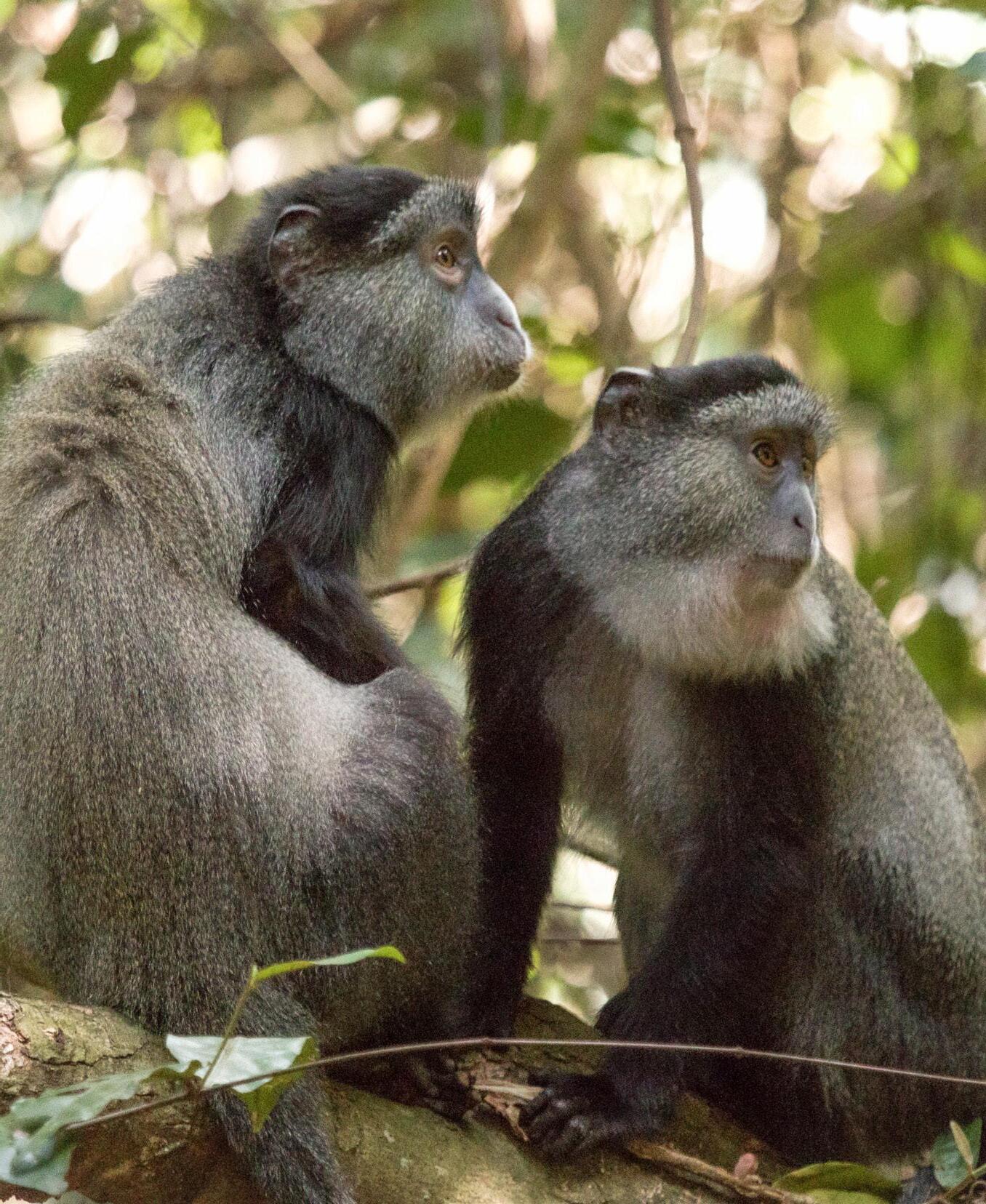
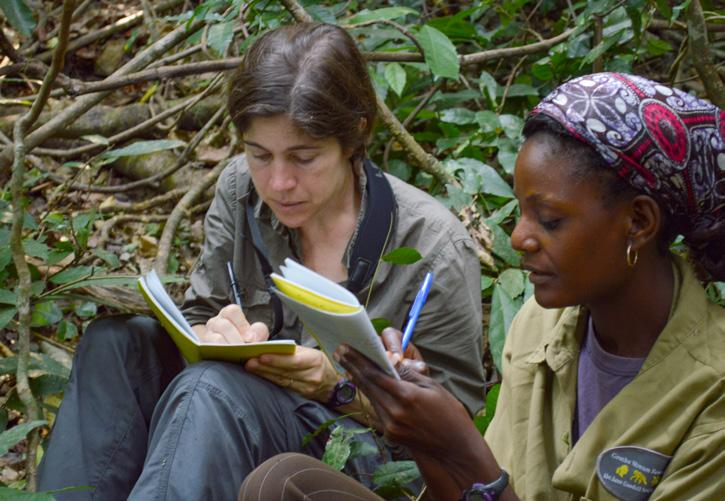

Often likened to the beloved Jane Goodall, Ph.D., Florida Atlantic University primatologist Kate Detwiler, Ph.D., shares a similar path. As conservation trailblazers who meticulously study their subjects in the wild without disturbing them, both also worked in the forests of Gombe National Park in Tanzania, living among chimpanzees and monkeys, and conducting groundbreaking research.
On an invitation from Detwiler, Goodall spoke at Florida Atlantic in 2019 to a sold-out crowd of 2,500. She emphasized the importance of protecting species and the environment, while encouraging others to do their part. Like Goodall, Detwiler, an associate professor of biological sciences in the Charles E. Schmidt College of Science, has an inquisitive spirit. Both credit their parents with encouraging their curiosity.
“As a child, I loved spending time outdoors looking for animals. One of my favorite memories is when I discovered the mating call of frogs after spending hours listening to their calls and watching the whole sequence between females and males unfold,” Detwiler said. “Now, as a primatologist, I still get to do what I loved to do as a kid, but with different species of monkeys in forests far away.”
As an early college student, Detwiler had plans to become a medical doctor. However, her aspirations took a turn during her junior year of college, when she spent a semester studying abroad in Tanzania at the College of African Wildlife Management. Her independent study project introduced her to an intriguing population of hybrid guenon monkeys in Gombe National Park, a tiny Tarzan-like dense jungle in the westernmost region of Tanzania.
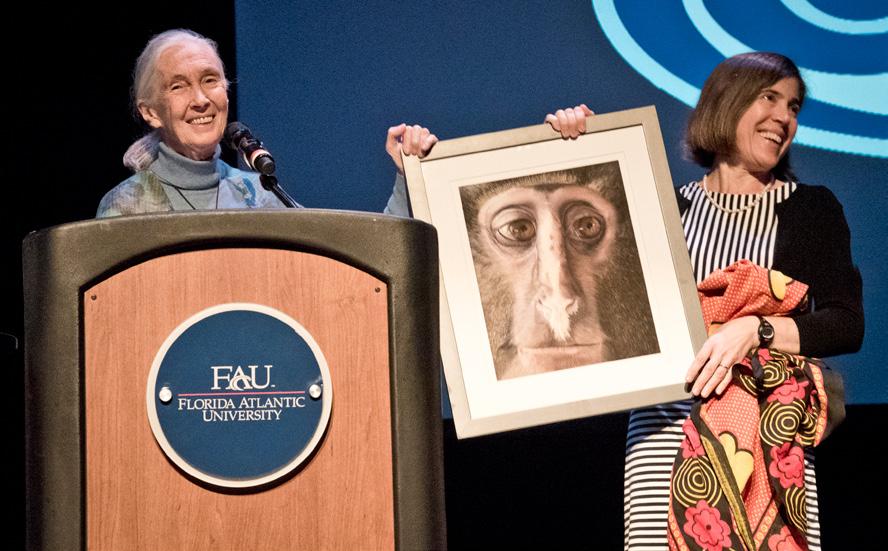
She was instantly hooked, fascinated by the hybrid problem and the evolutionary processes of ecosystems. It was then that she knew her calling was to help protect wild nature so that healthy ecosystems can thrive.
“My early independent study and work on the hybrid monkeys in Gombe introduced me to a problem in nature that needed to be solved,” said Detwiler. “It’s been fascinating to see a shift in biology from thinking that hybridization is not common in animals to now having a better understanding of how hybridization is an important process in animal evolution. Gombe is an exceptional example of a rare natural laboratory and evolution in action, as it has a lot of successful hybrid monkeys to study.”
In addition to much-needed conservation efforts during her illustrious career, Detwiler and her team also have worked to solve the evolutionary puzzle of different species of monkeys using genomic research. In 2012, Detwiler’s research led to the discovery of a new species of monkey, Cercopithecus lomamiensis – locally known as the lesula – in the forests of the middle Lomami Basin in central Democratic Republic of the Congo. At the time, this was only the second new species of African monkey discovered in the last 28 years, which played a large role in the conservation of this endangered species.
This massive rainforest in the middle basin of the Lomami River was established as Lomami National Park in 2016. With its high biodiversity and ecological complexity, the park is home to numerous endemic and rare species, including lesula monkeys and dryas monkeys. Lomami National Park spans nearly 2.2 million acres, about 50 times larger than Washington, D.C., and is almost the size of Yellowstone National Park.
Gombe is an exceptional example of a rare natural laboratory and evolution in action, as it has a lot of successful hybrid monkeys to study.”
- Kate Detwiler, Ph.D.
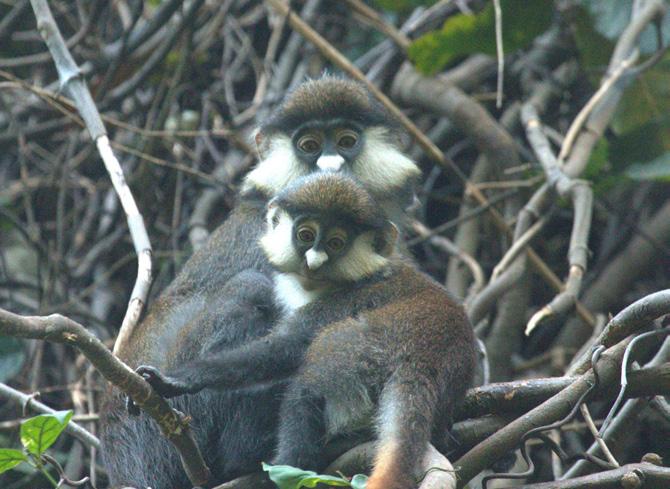
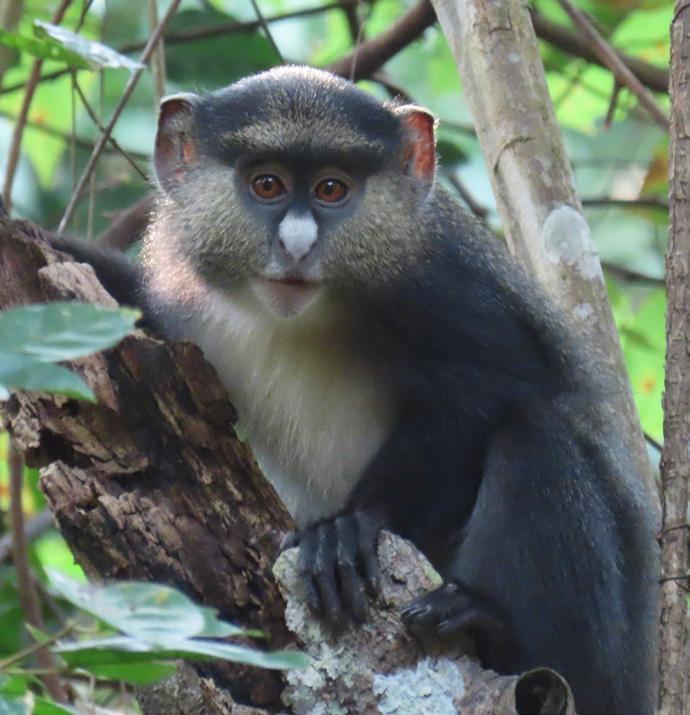
Detwiler also was the first to document that two genetically distinct species of guenon monkeys in Gombe National Park produced hybrid offspring. Using mitochondrial DNA from fecal samples, she examined the extent and pattern of genetic transfer or gene flow from “red-tailed” monkeys (Cercopithecus ascanius) to “blue” monkeys (Cercopithecus mitis) due to hybridization.
What she discovered was a lot of promiscuity. Red-tails were mating with blues, blues were mating with red-tails, blues were mating with blues, red-tails were mating with red-tails, and hybrids were mating with everyone. Yet, Detwiler didn’t find any negative consequences from these two very different species repeatedly mating and producing offspring on an ongoing basis.
“The Gombe hybrid population is extremely valuable because it can be used as a model system to better understand what hybridization looks like and how genetic material moves between species,” Detwiler said. “We have this amazing laboratory in nature to help us answer many questions about hybridization and how species boundaries are maintained. Our ongoing research is very timely because hybridization often occurs in response to environmental changes, as we are seeing with climate change and modified landscapes — it is nature’s way to respond.”

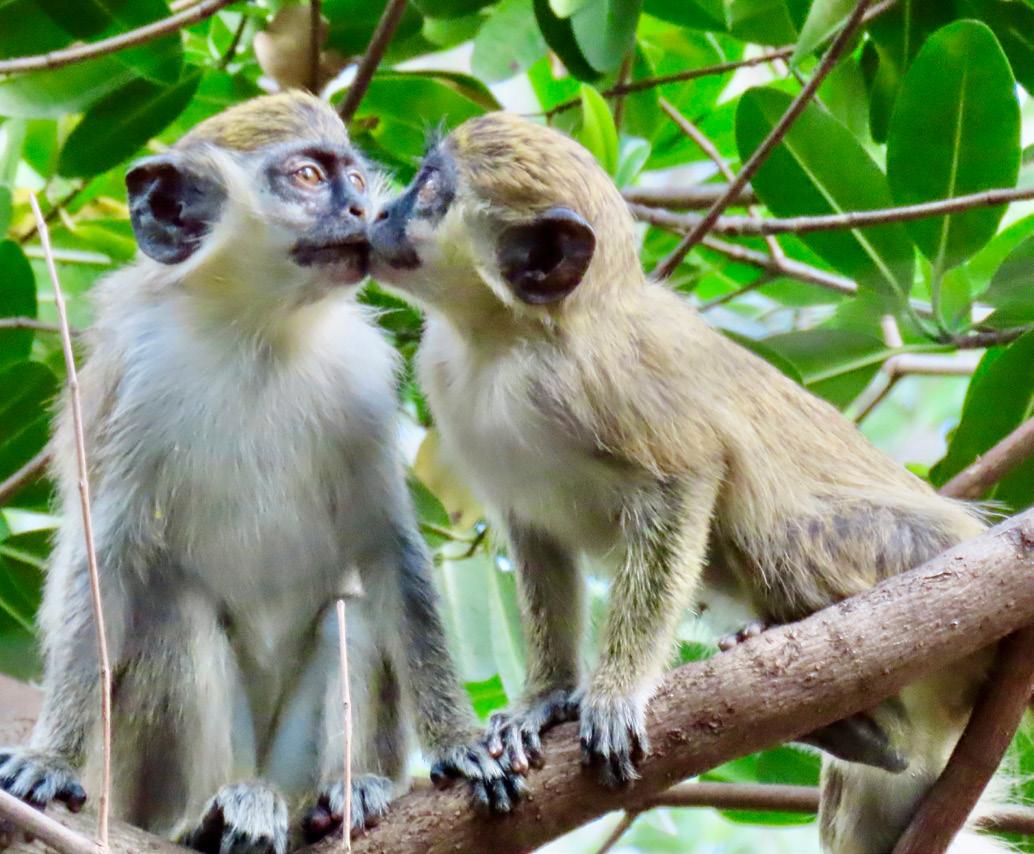
Sometimes, monkey business even follows Detwiler home. Her first doctoral student’s research project on a population of notorious monkeys in South Florida ultimately led to the confirmation of their origin. In 2021, using robust data and genetic research, Detwiler and Deborah “Missy” Williams, Ph.D., published their study findings. This research provided important evidence on the colony of non-native wild African vervet monkeys that landed in Dania Beach more than 70 years ago and settled in a thick mangrove forest near the Fort Lauderdale-Hollywood International Airport. Results of the study were widely shared by media nationally and internationally, delighting audiences near and far.
“Despite being non-native to the state of Florida, this group of African vervet monkeys has thrived for more than 80 years living in a swampy patch of forest adjacent to the airport,” said Williams, who founded the Dania Beach Vervet Project, a nonprofit organization dedicated to promoting awareness and conservation of the colony.
“They originally escaped from a breeding facility in the 1940s called the Dania Chimpanzee Farm, which was both a research facility and a zoo. Since then, they have adapted incredibly well to life in the Sunshine State. Because they’ve been fed by people who offer snacks like fruits, nuts and seeds, they’re comfortable around humans and urban life.”
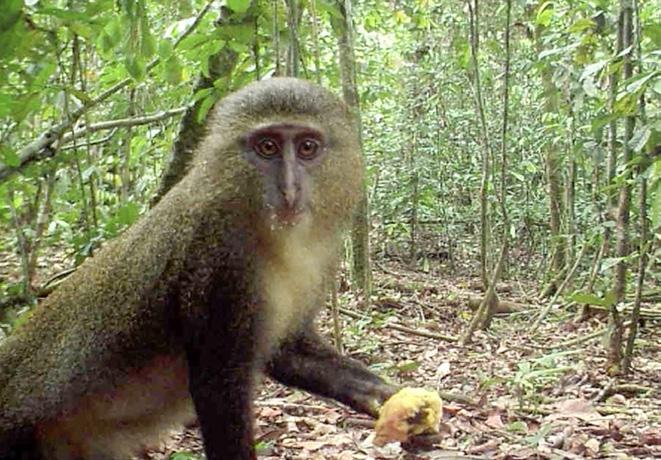
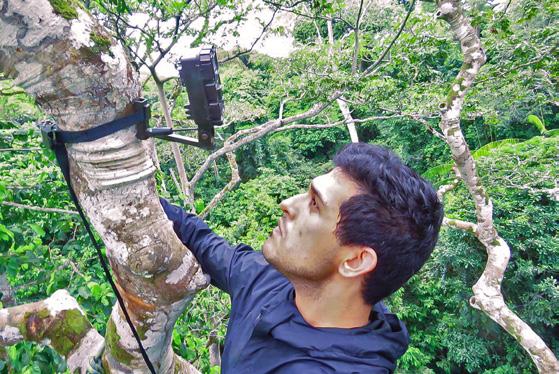
Whether Detwiler is extracting mitochondrial DNA from monkey feces in the lab or immersed deep in Central Africa’s rainforests with her students and collaborators, much of her research involves camera traps embedded in various habitats. These camera traps are equipped with infrared sensors to automatically and noninvasively capture videos without any disturbance to the monkeys and their social groups.
Although camera traps are widely used to detect and survey cryptic species, Detwiler, in collaboration with her students and colleagues, had to develop specific camera trap methods and placements for reliable and effective detection in one of the most remote regions in the world.
In 2017, using these specially designed remote sensing cameras, the research team was the first to capture rare video footage of the dryas monkey, a critically endangered species about the size of a cat. However, attempting to capture these dryas monkeys on camera was no easy feat and required unusual tactics. Detwiler solicited the help of her then-graduate student, Daniel Alempijevic, Ph.D., who received professional training to climb tall trees to strategically set up the cameras.

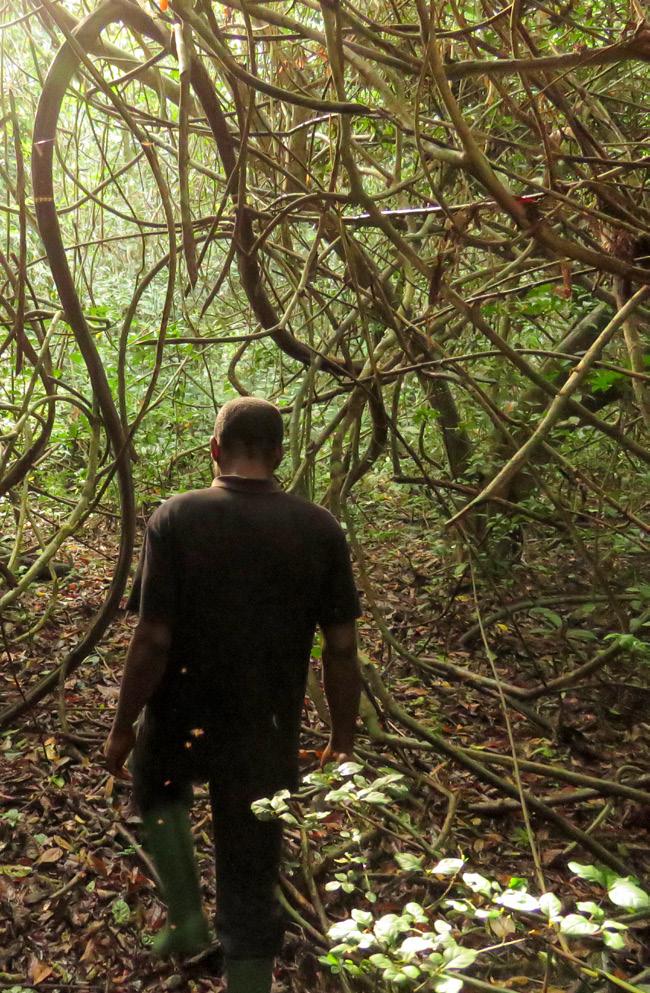
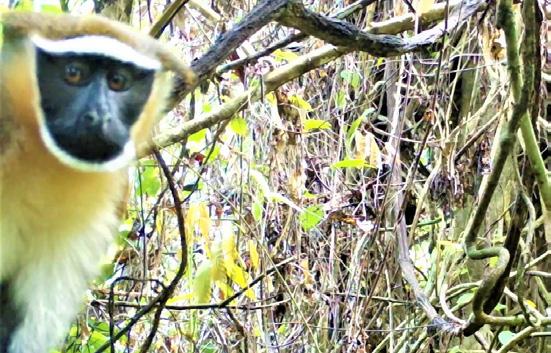
The picture-perfect details they obtained from these camera traps confirmed the occurrence of the elusive dryas monkey species at seven locations in both Lomami National Park and its buffer zone — spanning a total area of 3,453 square kilometers, based on opportunistic reports provided by local village residents and park patrols. Video footage also provided vital information on an array of other charismatic animals such as the bonobo, pangolin, African palm civet, and potto, which also inhabit the Lomami National Park.
“The Congo Basin rainforest is the second-largest rainforest in the world and contains some of the least-known species on the planet, many of which are threatened from hunting pressure and deforestation,” Detwiler said. “Our goal was to document where new dryas populations live and to develop effective methods to monitor population size over time to ensure their protection. Knowing where they live is important, because the animals living inside the Lomami National Park are protected, as it is illegal to hunt.”
Most recently, Detwiler published research findings on camera traps that documented — for the first time — the lesula’s terrestrial movement, daytime activity pattern, birth seasonality, group size and social organization. For the study, a research team
established two systematic camera trap grids inside Lomami National Park and one outside the park in the buffer zone, where the animals are heavily hunted. They conducted three systematic, terrestrial camera trap surveys and accumulated 598 independent events of lesula over 5,960 camera trap days from 92 camera traps over a three-year period.
They discovered that the lesulas’ locomotor behavior is highly terrestrial, they have a daytime activity pattern, and they live in medium to large groups with one adult male, multiple adult females and their juveniles. The average group size from three surveys combined was 7.7 individuals.
Researchers recorded a total of 2,298 individuals: 1,163 were mature adult males and females, 696 were juveniles/infants/ immature males and females. Lesula groups were comprised of multiple females with their infants and juveniles. Researchers also recorded single males and male-only groups comprising up to three males, which they identified as “bachelor” groups. Lesula groups mostly contain single males; however, some larger groups contained two mature males. Overall, 45 percent of all males identified were either lone males or in male-only groups.
“Our studies in the field truly illustrate how camera traps are a highly effective wildlife survey and research tool that provide a ‘behind the scenes’ method to obtain accurate information on the distribution of many different species, their activity patterns, habitat use and their abundance,” Detwiler said. “Because camera traps can run independently when field researchers aren’t around, they also contribute to conservation efforts by providing new approaches to collect life history and behavioral data, which can be applied to wildlife management.”
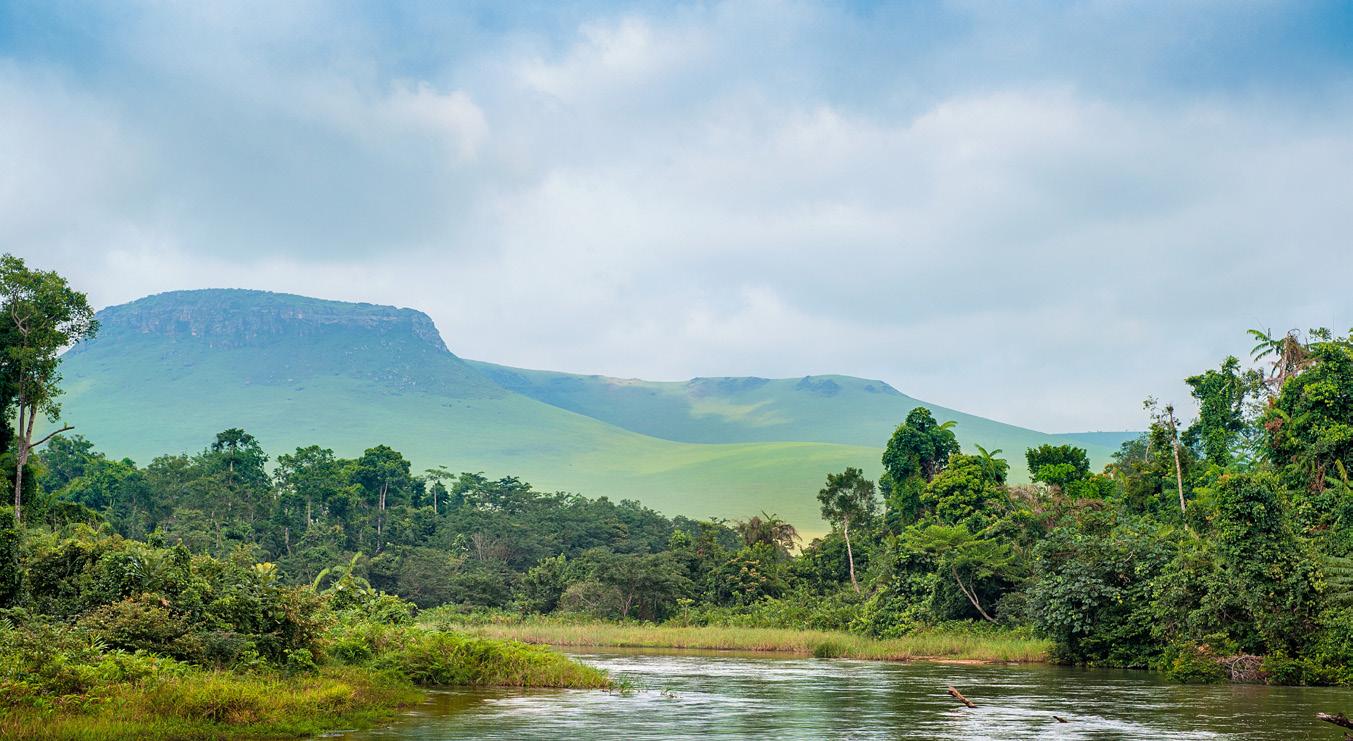
Throughout her career, Detwiler’s innate curiosity about animal behavior and passion for primatology have led to achievements far beyond her field. In addition to advancing knowledge of her primate subjects, her emphasis on ecological conservation has helped to protect their lives and habitats. And despite a growing body of information available about the natural world, Detwiler’s work proves there are still mysteries to be solved and species to be discovered.
An image of a rare dryas monkey captured by a camera trap in Lomami National Park.With a rise of antisemitism and increasing tensions around the world, the Holocaust, Jewish Studies and human rights education offered at Florida Atlantic University is more important than ever. Encouragingly, a 2020 survey by the Echoes & Reflections organization found that students who receive Holocaust education are more likely to challenge incorrect or biased information, confront negative stereotyping and stand up to those who display intolerant behavior. The programs in Florida Atlantic’s Dorothy F. Schmidt College of Arts and Letters take up this charge through meaningful and intentional curricula.
This begins with the Peace, Justice and Human Rights (PJHR) initiative, which highlights a key platform of the University’s strategic plan that aims to develop programs advancing the acceptance and understanding of diverse cultures. As a multiand interdisciplinary enterprise, the overarching goal is to create positive change locally, nationally and internationally through research, teaching and community engagement. Core components of the PJHR initiative include the Arthur and Emalie Gutterman Family Center for Holocaust and Human Rights Education (CHHRE), and the Leon Charney Diplomacy Program.
“Florida Atlantic’s platform for Peace, Justice and Human Rights highlights the University’s strategic efforts to cultivate cooperation across cultures and academic disciplines,” said FAU President Stacy Volnick. “It is an essential component for the creation and advancement of knowledge that benefits all of society.”
The CHHRE supports this goal by training Florida’s educators to effectively deliver the state’s required Holocaust instruction. Each year, the center serves more than 500 K-12 teachers and 350 FAU students through professional development workshops, the annual Holocaust Summer Institute for Educators, travel-study opportunities and community programs. For every teacher who participates in these trainings, at least 150 students benefit from the lessons they impart.
Significant philanthropic contributions from the Guttermans, as well as Jay and Marilyn Weinberg, and Dan and Shoshana Davidowitz have helped fortify the CHHRE’s impact throughout the University and community. Supporters of the center consider it a deeply meaningful initiative with the capacity to create profound change for current and future generations.
“As a grandchild of Holocaust survivors, I know the human rights atrocities that my own family and millions of others endured,” said Dan Davidowitz. “The education enabled by FAU and the Gutterman Family Center for Holocaust and Human Rights Education does immeasurable work in providing our teachers and students everything that they need to bring tolerance, understanding and open-mindedness from the lessons of intolerance, persecution and hate.”
Florida Atlantic’s undergraduate students have further demonstrated that they are not only motivated to create change, but well-equipped to do so. The Leon Charney Diplomacy


In a world where education thrives, hate is eliminated.
This is the compelling concept for the Holocaust and Jewish Studies programs, centers and initiatives offered in the Dorothy F. Schmidt College of Arts and Letters.

Program has won six titles in the National Model United Nations (MUN) competition, the world’s largest and most prestigious MUN program. In 2021, the program achieved an unprecedented triumph in the competition’s 95-year history by winning first place at both the Washington, D.C. and New York conferences in the same academic year. To date, participants have received 75 national and international awards for academic excellence. Many of them intend to leverage their diplomacy training and experiences in fields such as law, public service, foreign relations and international business.
The late Leon Charney’s confidence in the program “transformed it into a multi-college, university-wide endeavor,” said Jeffery Morton, Ph.D., professor of political science and director of the Leon Charney Diplomacy Program. Charney’s legacy as a lawyer, businessman and diplomat who helped facilitate the Camp David Accords also serves as a great source of inspiration for the student delegates who advance his cause of championing peace around the world.
Another path toward peace takes shape through Florida Atlantic’s Jewish Studies degree program, which enables undergraduates to engage with Jewish history, religion and culture in a dynamic and inclusive environment. By nature of its interdisciplinary approach, students can explore areas of language, politics, history, religion and other subjects that provide a foundation for them to become leaders in the Jewish community, or in an array of fields such as academia, advocacy and curation.
The Herbert and Elaine Gimelstob Eminent Scholar Chair of Jewish Studies plays an important role in the program by helping students and the community combat antisemitism while recognizing Jewish contributions to the world. Rachel Harris, Ph.D. serves as the Gimelstob Chair as well as director of the Jewish Studies program. Additionally, the Raddock Family Eminent Scholar Chair for Holocaust Studies, which was the first Holocaust chair established in the state of Florida, plays a distinct role in the program by advancing education about the Holocaust. Alan Berger, Ph.D. serves as the Raddock Family Chair and directs the Center for the Study of Values and Violence After Auschwitz.
“As survivors of the Holocaust pass, we’re going to rely on educators to keep their stories alive,” said Michael J. Horswell, Ph.D., dean of the Dorothy F. Schmidt College of Arts and Letters. “And with the rise in antisemitism that we’ve seen around the world in recent years, it is more important than ever that these lessons are taught. Thanks to our generous donors, future generations can obtain knowledge and understanding of the Holocaust, and an appreciation and respect for human rights for all, at Florida Atlantic.”
“As a grandchild of Holocaust survivors, I know the human rights atrocities that my own family and millions of others endured. The education enabled by FAU and the Gutterman Family Center for Holocaust and Human Rights
Education does immeasurable work in providing our teachers and students everything that they need to bring tolerance, understanding and openmindedness from the lessons of intolerance, persecution and hate.”
-Dan Davidowitz
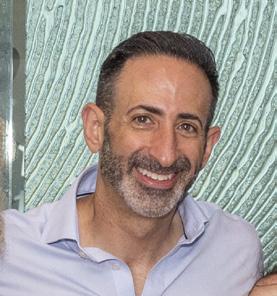

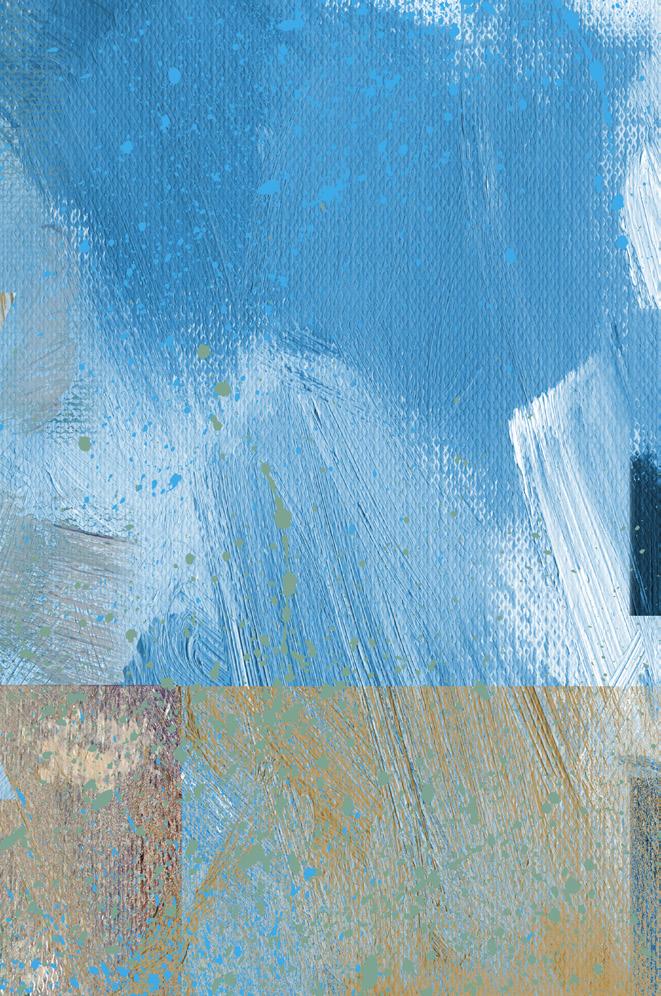

While Florida Atlantic has a long history and commitment to Holocaust and Jewish Studies, its future will be guided by the remarkable vision of the late Kurt Wallach and his wife, Marilyn Wallach.
In 2020, the Wallachs donated $20 million, the largest gift in University history at the time, to create the Kurt and Marilyn Wallach Institute for Holocaust and Jewish Studies within the Dorothy F. Schmidt College of Arts and Letters. A portion of the gift will be used to construct the Kurt and Marilyn Wallach Holocaust and Jewish Studies Building on the Boca Raton campus, which will serve as a hub for Holocaust, human rights and Jewish
education. Their gift also supports endowments for a new research institute with a mission to deter hate, bias and discrimination, and to fund educational outreach activities, fellowships, scholarships, study abroad opportunities, research and more.
The motivation behind the Wallachs’ transformational gift was a matter of personal significance. In 1933, at 7 years old, Kurt Wallach and his family fled Magdeburg, Germany to Holland when his father was targeted for assassination by the Nazis. As antisemitism spread, Wallach and his family made the difficult decision to flee again in 1936, securing passage on the Queen Mary to the United States and settling in Cleveland. In 1944, on Wallach’s 18th birthday, he enlisted in the U.S. Navy. He served for two years during World War II as a “frogman” on Underwater Demolition Teams in Panama and the Pacific.
After his service, Wallach received his bachelor’s and master’s degrees, and achieved ongoing success as a business owner in multiple industries, including real estate and construction. Compelled to tell his story, Wallach wrote several books about his life, including a biography of his father detailing the tribulations under Nazi oppression. Additionally, he authored three textbooks on the Holocaust: “The Killing of the Jews;” “Murder Beyond Madness;” and “Man’s Inhumanity to Man.” He was 87 years old when he wrote the first book and 93 when he wrote the third.
With a staunch passion to educate, the Wallachs served as founding supporters of the U.S. Holocaust Memorial Museum in Washington, D.C., where Kurt Wallach’s oral history interview and family records remain archived. Wallach also delivered a sixpart lecture series for Florida Atlantic’s Osher Lifelong Learning Institute about his first-hand experience with the Nazis’ rise in Germany. In recognition of his lifelong dedication to Holocaust education, Wallach received a gold medal from the U.S. Holocaust Memorial Museum in 2008 and was awarded an honorary doctorate in humane letters from Florida Atlantic in 2020.
“We speak for those who cannot speak. We remember all the victims, including our family members who perished needlessly,” he said during the gift announcement. “No one should ever be subjected to such horror. We hope that through the education we can provide that lives will be saved and history will not be repeated.”
With their significant contribution to Florida Atlantic, the Wallachs ensured their steadfast commitment to Holocaust education will remain relevant in perpetuity. Their son, FAU alumnus Mark Wallach ’04, also carries forward their legacy. Spanning three generations, the Wallach family has built a crucial bridge from an unimaginable past to a new horizon of understanding and hope.
Kurt Wallach passed away in September 2021, but the Wallach Building and Institute will carry out his desire to educate the community about the Holocaust and its atrocities. Florida Atlantic ceremoniously broke ground on the building in September 2022 and construction is expected to be completed in 2025.
“Our reason for donating this building is twofold: the first is to honor the memory of the more than 200 members of my husband’s family that were murdered in the Holocaust; the second is the hope that this undertaking will prevent other families from having the same loss that he endured,” said Marilyn Wallach. “Let us hope that our mantra at FAU, ‘Education is Our Best Hope Against Hatred,’ will make a difference!”
The two-story epicenter for Holocaust and Jewish studies will be approximately 18,731 square feet and will accommodate a 150-seat recital/lecture hall, computer lab, multimedia and production
“We speak for those who cannot speak. We remember all the victims, including our family members who perished needlessly. No one should ever be subjected to such horror. We hope that through the education we can provide that lives will be saved and history will not be repeated.”
- Kurt Wallach
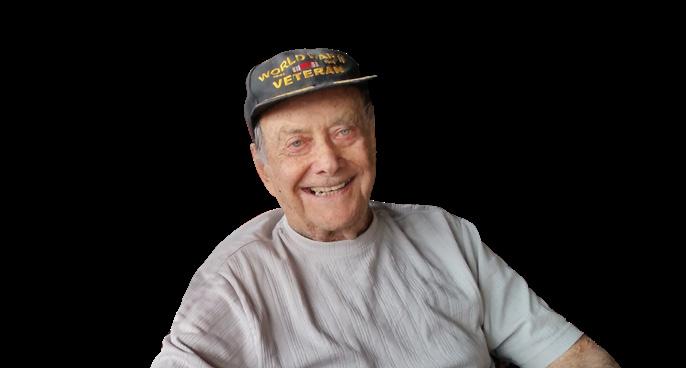


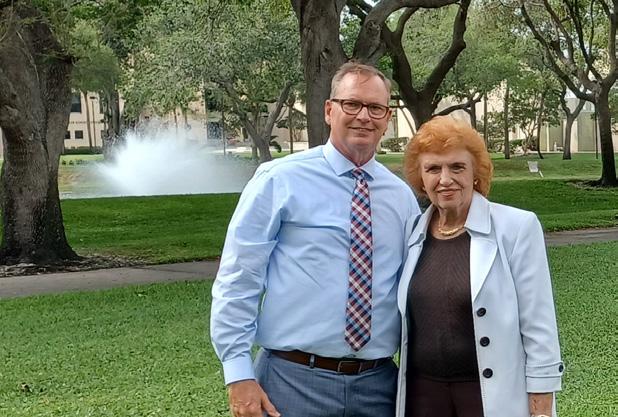
“Our reason for donating this building is twofold: the first is to honor the memory of the more than 200 members of my husband’s family that were murdered in the Holocaust; the second is the hope that this undertaking will prevent other families from having the same loss that he endured.”
- Marilyn Wallach
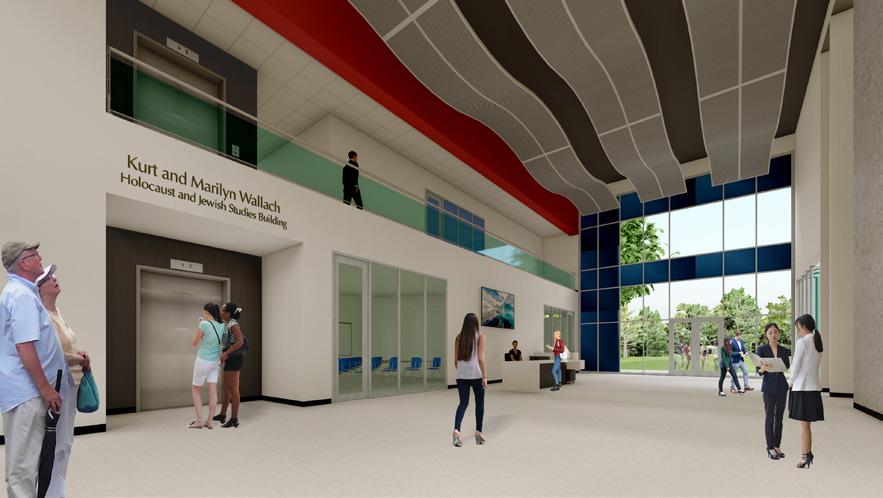

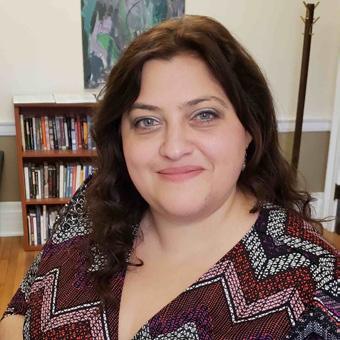
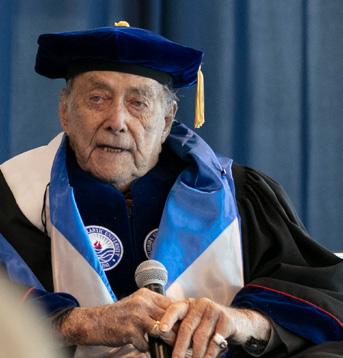



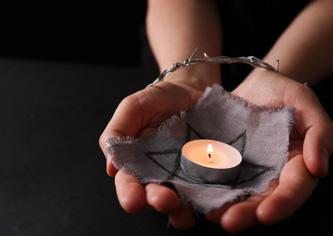

lab, student study room, conference room, classrooms and faculty offices. Additionally, it will include an exhibition area for displays from the U.S. Holocaust Memorial Museum, and the lobby will feature a Wall of Recognition and Remembrance.
Expansive, innovative and mindful of Jewish history and culture, the Wallach building will house the Arthur and Emalie Gutterman Family Center for Holocaust and Human Rights Education; the Center for Peace, Justice and Human Rights; the Jewish Studies program; and the Leon Charney Diplomacy Program. Together, these initiatives will help empower students, educators and society to ensure peace and secure human rights through historical teachings.
“The Wallach building will provide Jewish Studies with a home, and enable us to host programming for students, faculty and the community,” said Harris. “It is an incredible chance for us to expand our current offerings and attract students with unique new opportunities such as oral history projects, media spaces, a research targeted classroom with access to Jewish archival materials and databases, and numerous film and media resources.”
Community not only holds significant value within Jewish culture but also plays a vital role in building the bridges that contribute to lasting peace. One of the most considerable organizations affiliated with Florida Atlantic’s Jewish Studies program and its broader Jewish community is Hillel of Broward and Palm Beach. Since the Levine Weinberger Center for Jewish Life opened on the Boca Raton campus in 2006, Hillel has significantly enriched the University community’s connections to Judaism and Israel through social gatherings, local service projects, trips to Israel, Jewish learning opportunities, Shabbat dinners, mentoring programs and more.
The vibrant and robust Jewish community that’s been cultivated at Florida Atlantic is especially important to the University’s partnerships with Israeli institutions. The Florida-Israel Institute, established as part of a Florida statute to develop academic, economic and cultural connections between postsecondary institutions and foreign countries, has welcomed a multitude of collaborations among students, faculty, researchers and institutional leaders. Today, Florida Atlantic proudly partners with Hebrew University and the Technion – Israel Institute of Technology to tackle the world’s most pressing problems together.
With its current programs flourishing and the construction of the Wallach building on the horizon, Florida Atlantic continues to expand its presence as an epicenter for intercultural dialogue and academic excellence in South Florida and beyond. The University’s vision, driven by the dedication of students, faculty, community partners and supporters, will ensure that education serves to unite nations and eliminate hate in all its forms.
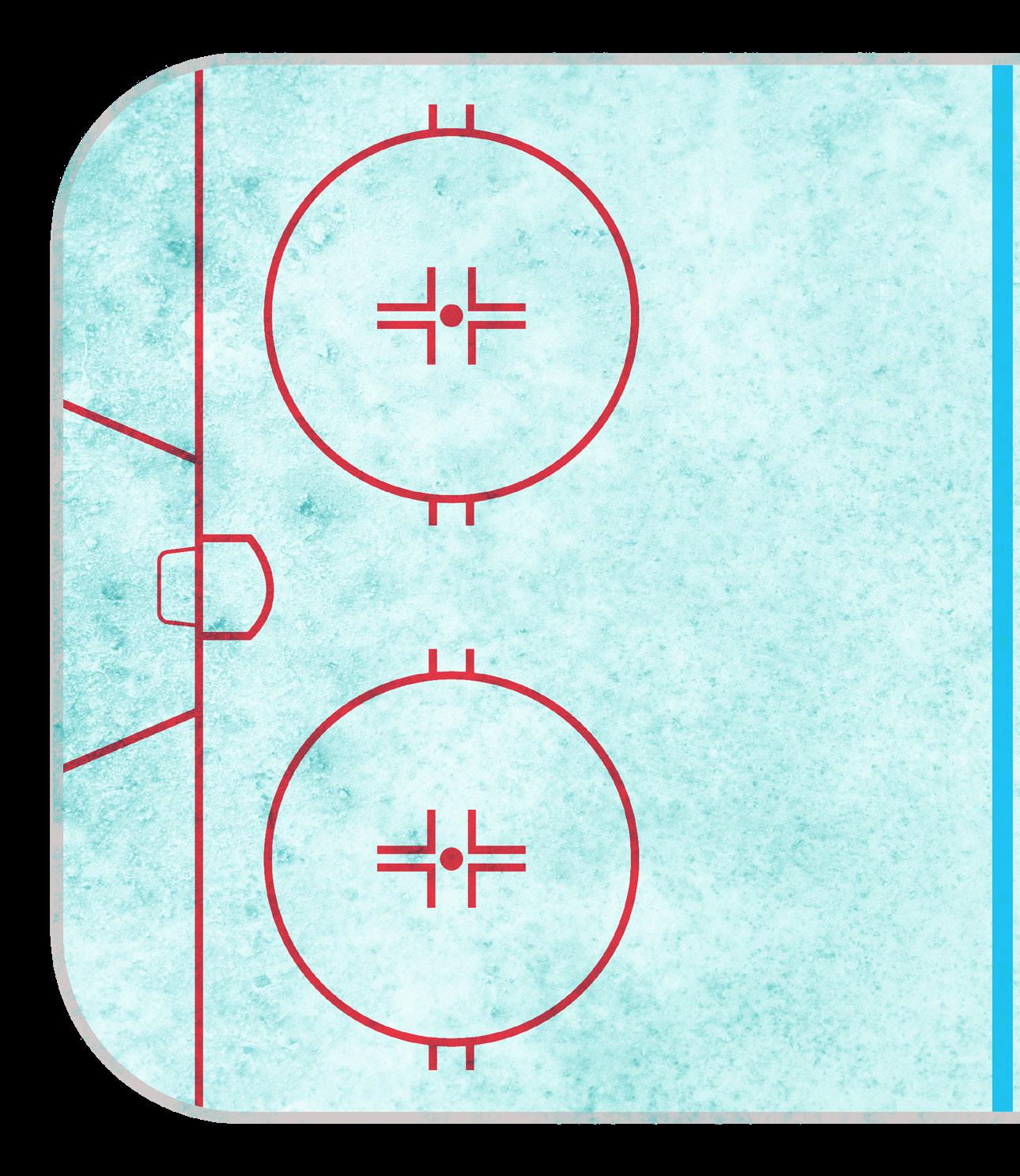

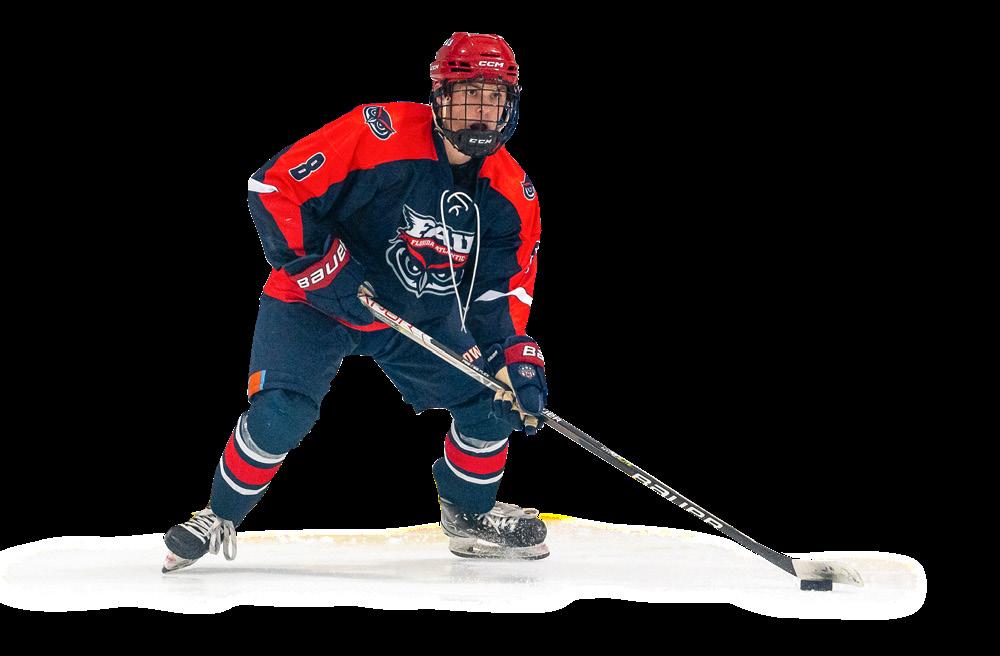
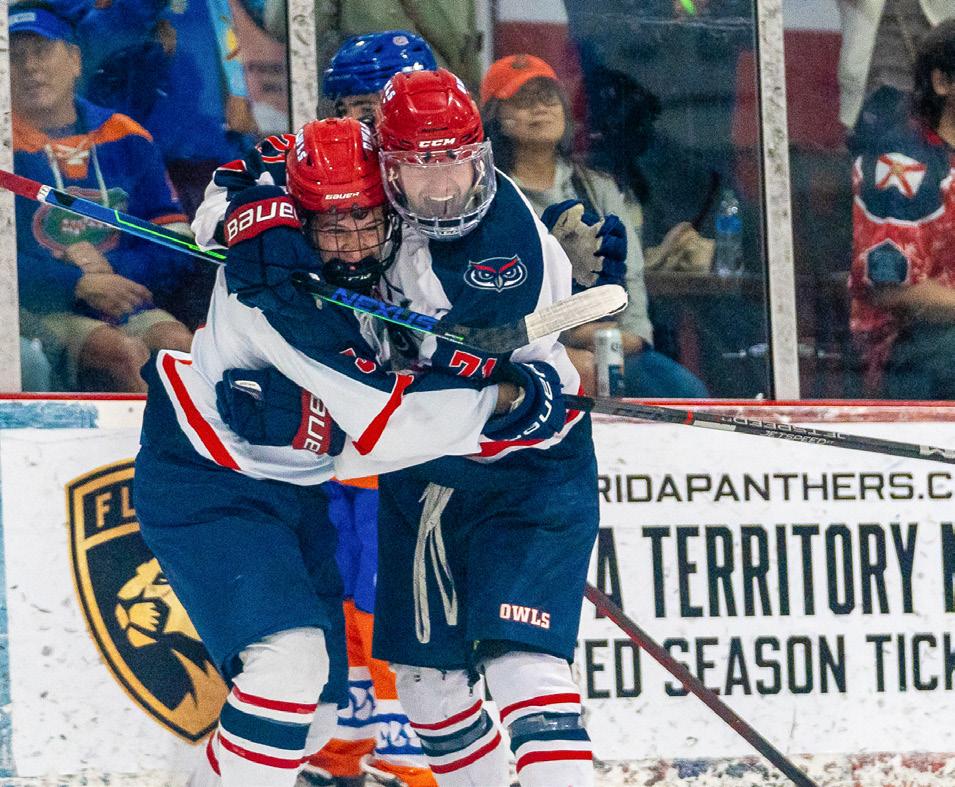
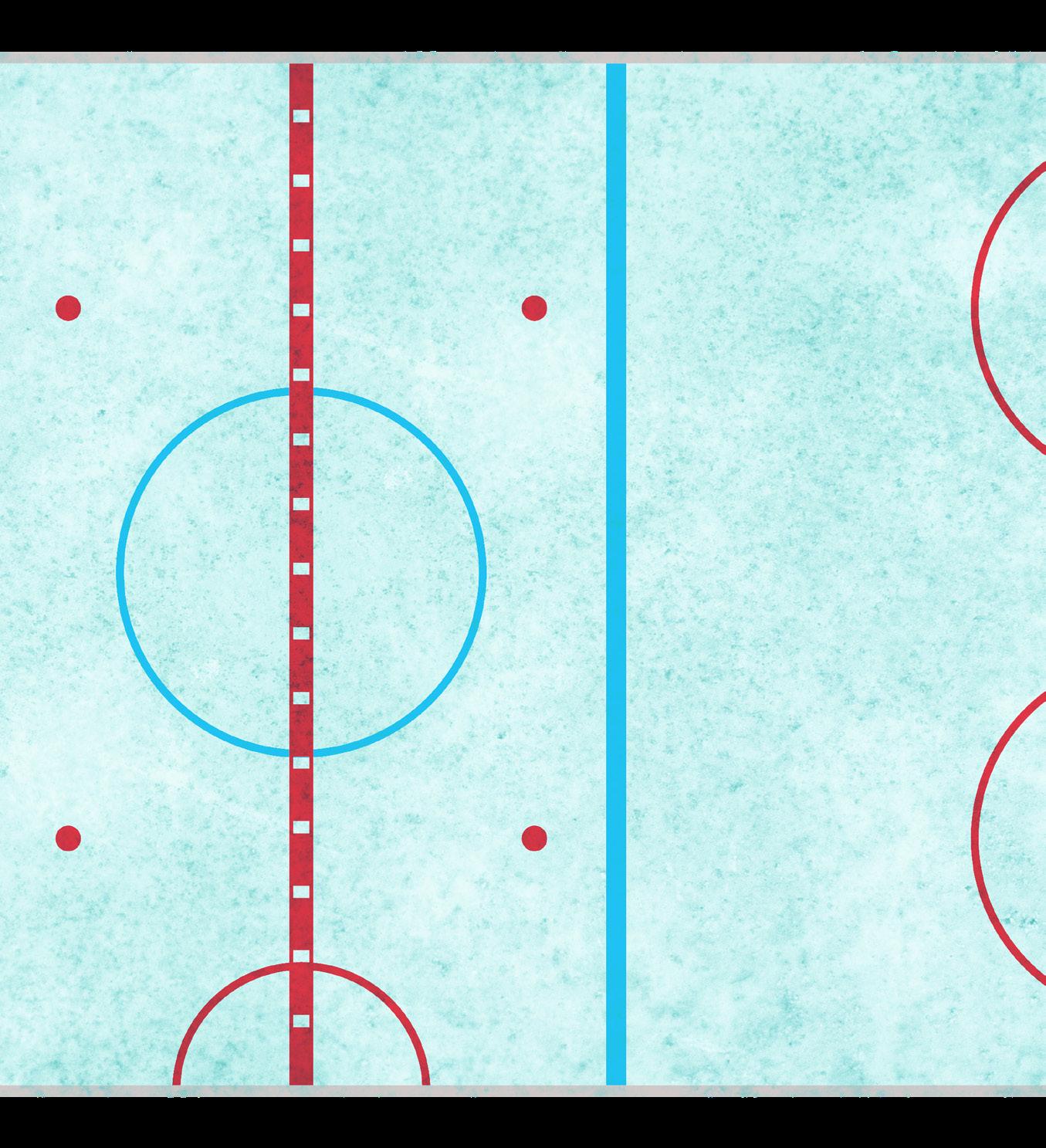
These three words encapsulate how Rocco Bruno felt about the historic 2023-24 season for the Florida Atlantic University Hockey Club.
When talking to the freshman goalie from Springfield, Pennsylvania, it’s easy to understand why.
The team finished No. 1, with a 10-1-1 record in fall 2023 and 13-4 in the spring, skating all the way to the Amateur Athletic Union (AAU) national championship in Westchester, Pennsylvania against the University of
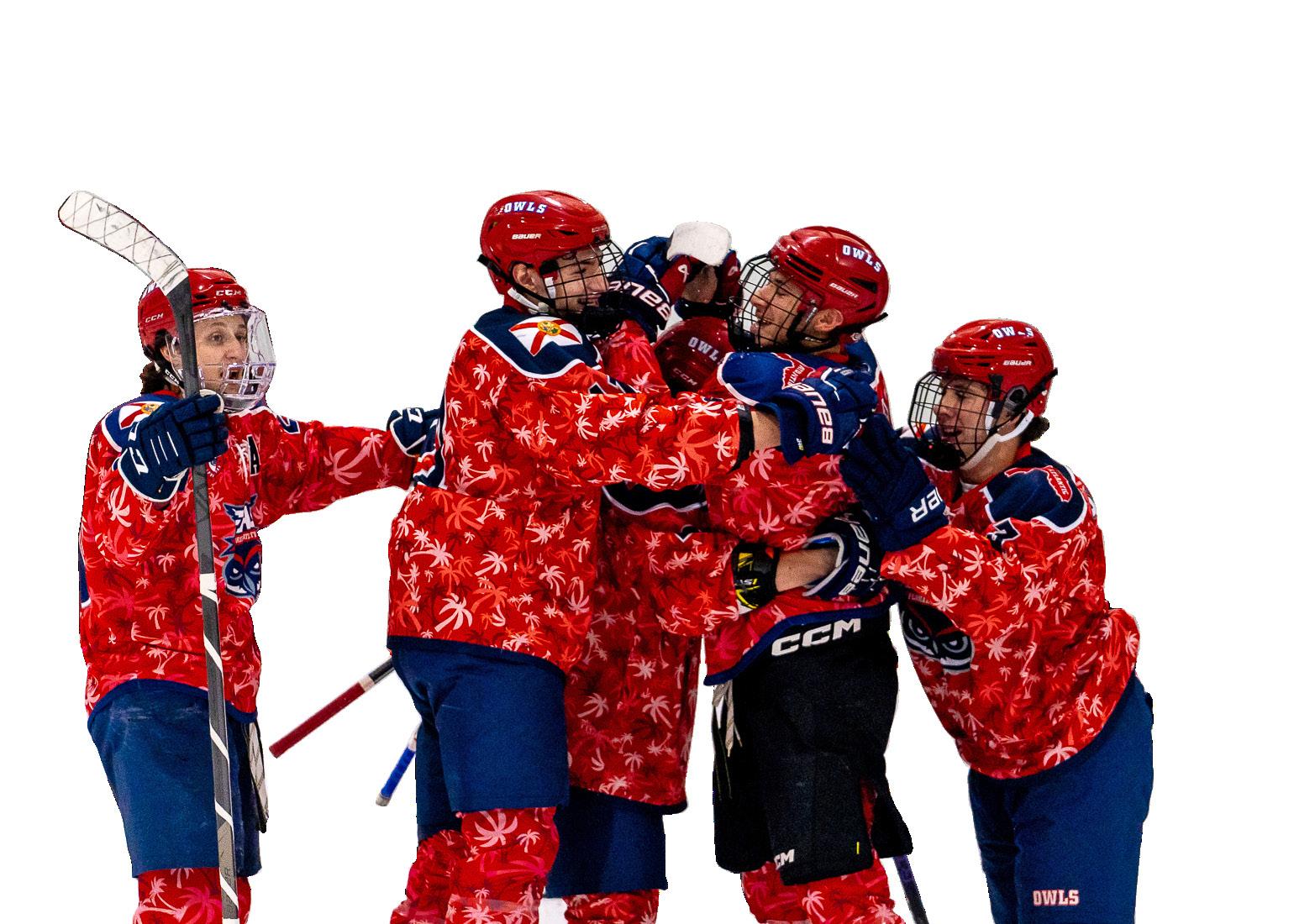

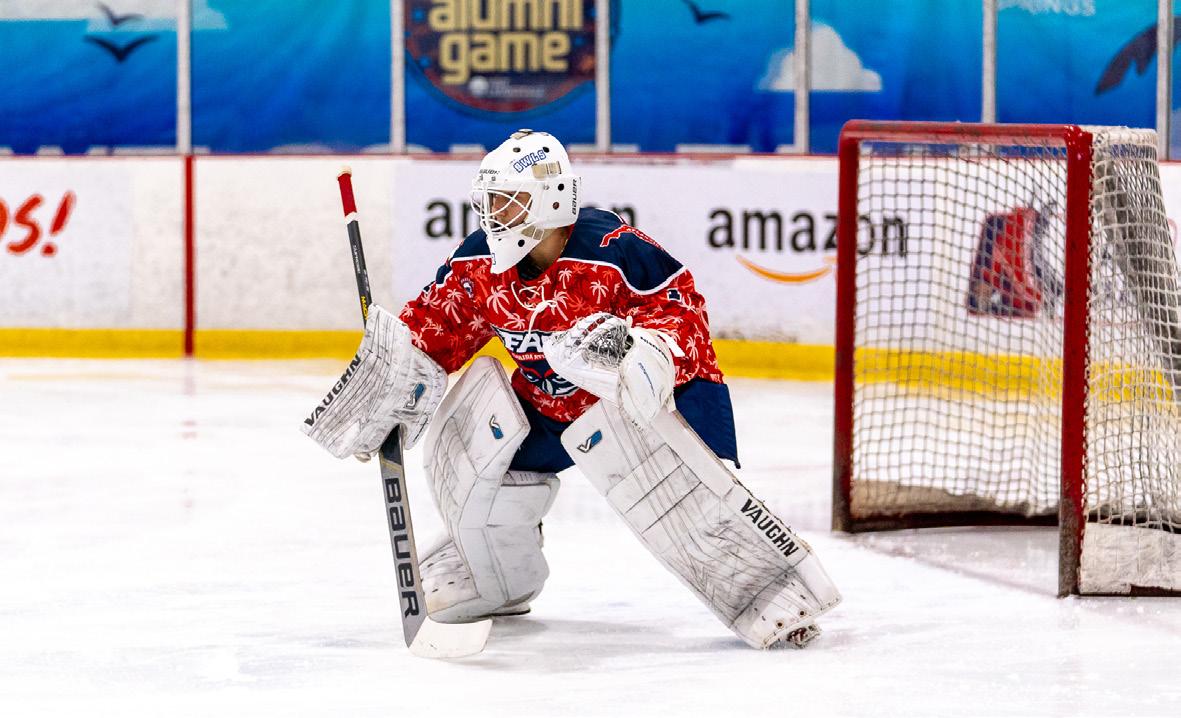

… we came together as a family toward the end of the season. That’s what really gave us the step up to get to the national championship.”
- Rocco Bruno
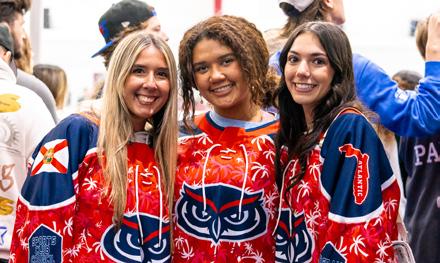
Now in its 20th year, Florida Atlantic Hockey is a collegiate club hockey team made up of 28 active FAU students. It is not NCAA affiliated, but part of the AAU College Hockey League and the College Hockey South (CHS) Division II conference. The CHS currently has 39 teams across four divisions and seven southern states, with plans to grow to 49 teams in the fall.
Before each season begins, interested Florida Atlantic students first attend a meeting and then participate in an extensive three-day tryout. From there, the coaching staff decides who will play on the team during a season that runs from September to March.
“It is a long season, but we all love what we do and love growing the sport of hockey at FAU and in the south,” said Cary de Graaff, director of hockey operations for the team.
Practice and games both take place at the Florida Panthers Ice Den in Coral Springs, but the 20-mile distance from the Boca Raton campus has no impact on attendance. Most games during the 2023-24 season were standing room only, with an average attendance of 600 people for Friday night games and 400 people for Saturday afternoon games. The highest attendance was 907 during a Friday night spring game against Florida. All of this at a rink with a 350-person seating capacity.
“The crowd is a nice mix of students, which is awesome. And also parents, youth coaches and their families, and members
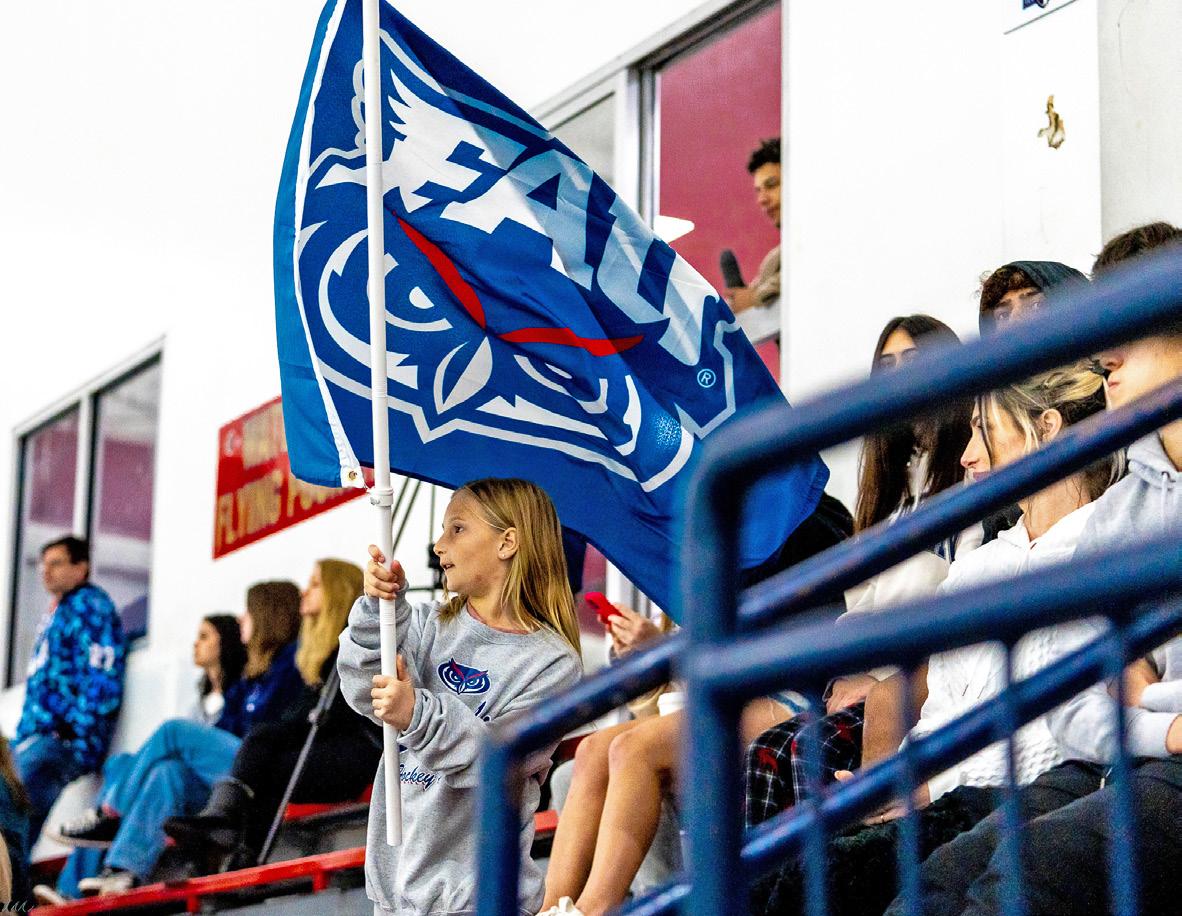
of our community who want to catch a great game,” said Christian Long, head coach of the Florida Atlantic Hockey Club. “The team brings them out of their seat because they are cheering for people they know. The players have developed into role models and the excitement the crowd brings for them is incredible.”
For Bruno, anticipating this experience is what originally drew him to Florida Atlantic, where he ended his freshman season with three shutouts. Highlights include a 42-save shutout at Embry-Riddle and a 24-save shutout at home against the University of Central Florida.
These successes all came together as he and teammates David Israel and Matias Weir were named to the CHS Division II AllConference First Team, while Caleb Owens was named to the CHS Division II All-Conference Second Team.
“That felt great to receive,” Bruno said. “It’s good to see hard work pay off and be noticed by the league, as well as my fellow teammates being noticed and recognized.”
Bruno’s career in hockey started when he was 6, playing the position of forward for the first year. But when a need for
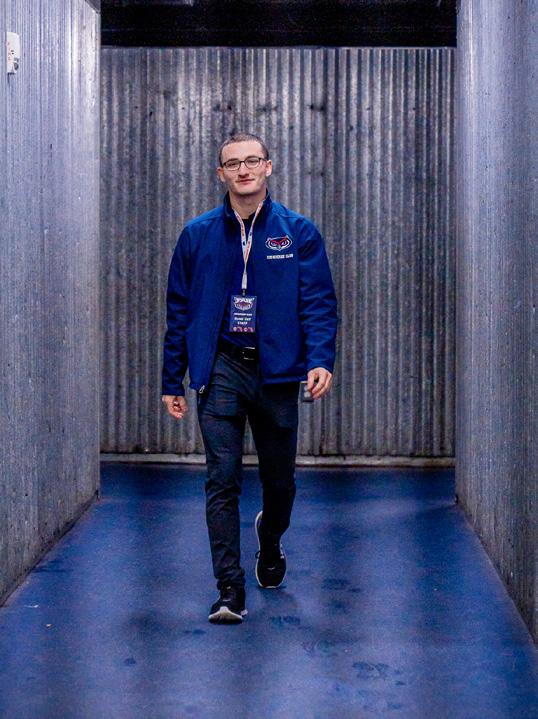
someone to fill in as goalie came about, Bruno dove right in and it was love at first sight. He became a standout goaltender in high school at St. John’s Prep School in Pennsylvania, so continuing in this role in college was his ultimate pursuit.
“My interest in FAU started when I was searching where to go to college my junior year of high school. I really liked the area to begin with. I also researched the business school since my major is in finance,” he said. “I immediately knew my No. 1 choice was FAU. And my experience has been great, honestly. My grades and educational experience have been great. But the guys on the team have been my favorite part. And Christian has been an incredible coach. I’ve learned so much from him.”
In his first year as the head coach, Long echoes that sentiment. He, too, says that being with this team has taught him how to be a better coach.
“I learned how to understand each individual player and their personalities, as well as how to best maintain our staff while pulling those skill sets into creating the best team possible,” Long said. “The ways we were able to layer the skills and personalities to mold this all-encompassing team was inspiring to see. The guys were committed to working hard and making sure to do everything they could to be good teammates. By
the end of this season, they weren’t closing out the games chanting, ‘Go Owls.’ They chanted, ‘Family.’”
With more than 28 years of experience in hockey, Long started with the team as an assistant coach for the 2022-23 season, helping to oversee forwards and special teams units. His own playing career includes four years at Colgate University, where he earned a Bachelor of Arts degree for a double-major in economics and sociology. This was followed by a move to Hong Kong, where he worked as a private equity analyst for Excelsior Capital Asia while simultaneously playing semiprofessional hockey in the China Ice Hockey League (CIHL). He earned a First-Team All-Star selection while also serving as the CIHL’s community relations manager to promote hockey/ athletics, fitness and nutrition in the Greater Hong Kong and Macau regions.
Long also was a two-time Ohio High School State Champion for St. Edward High School in Lakewood, Ohio, and played Junior “A” hockey in Brockville, Ontario for the Brockville Braves. He recorded more than a point per game in his Junior “A” career before earning a scholarship to Colgate University.
This vast knowledge and experience helped carry the Florida Atlantic team to its first-ever CHS Battle at the Beach tournament in Tampa in the fall, where they beat UCF by a
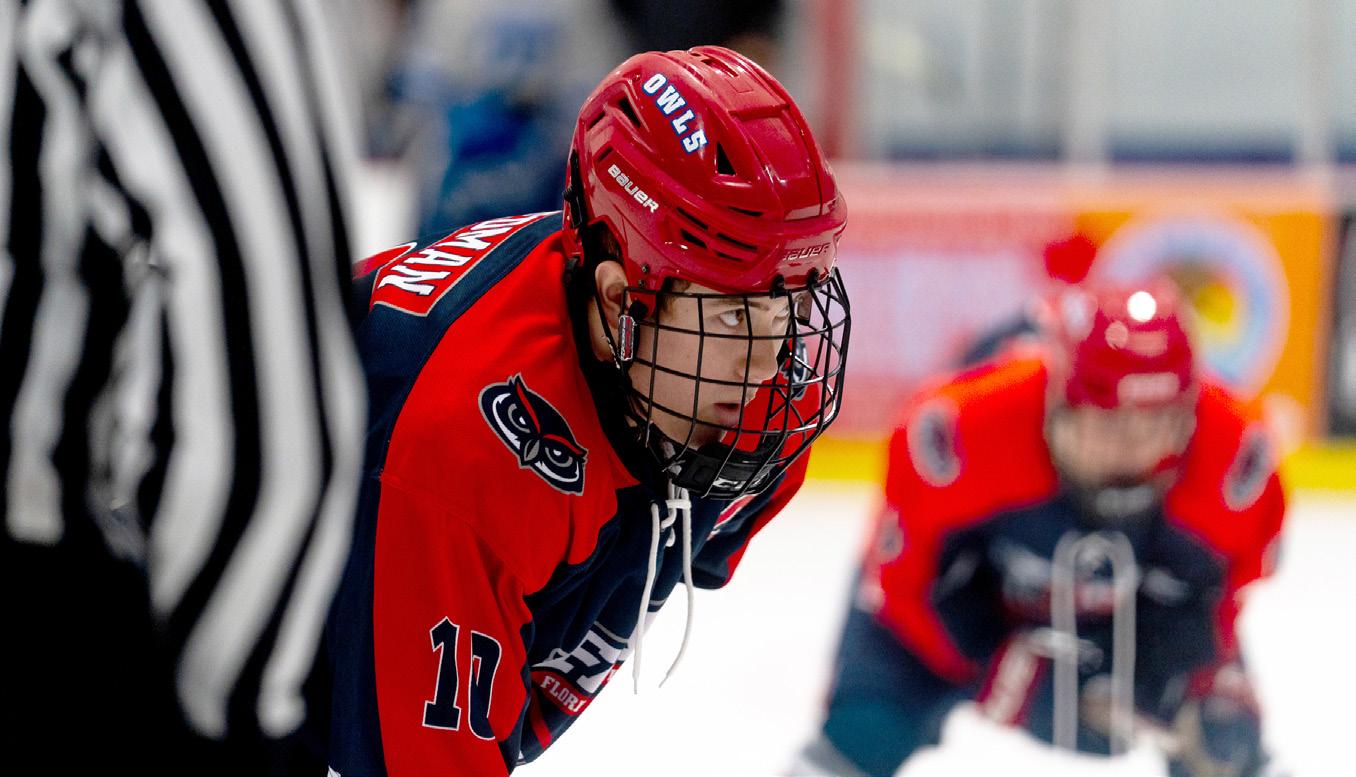
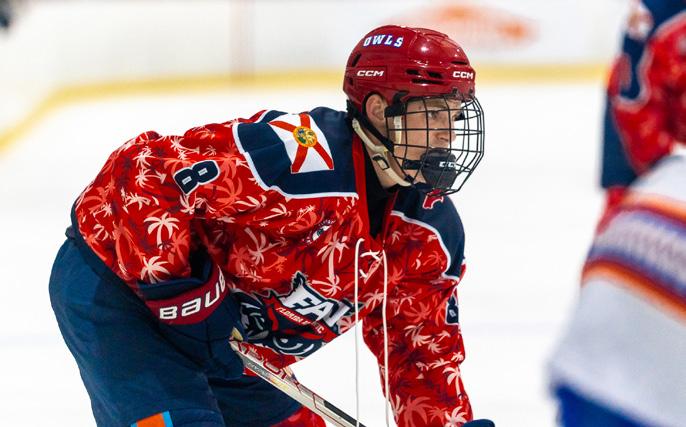
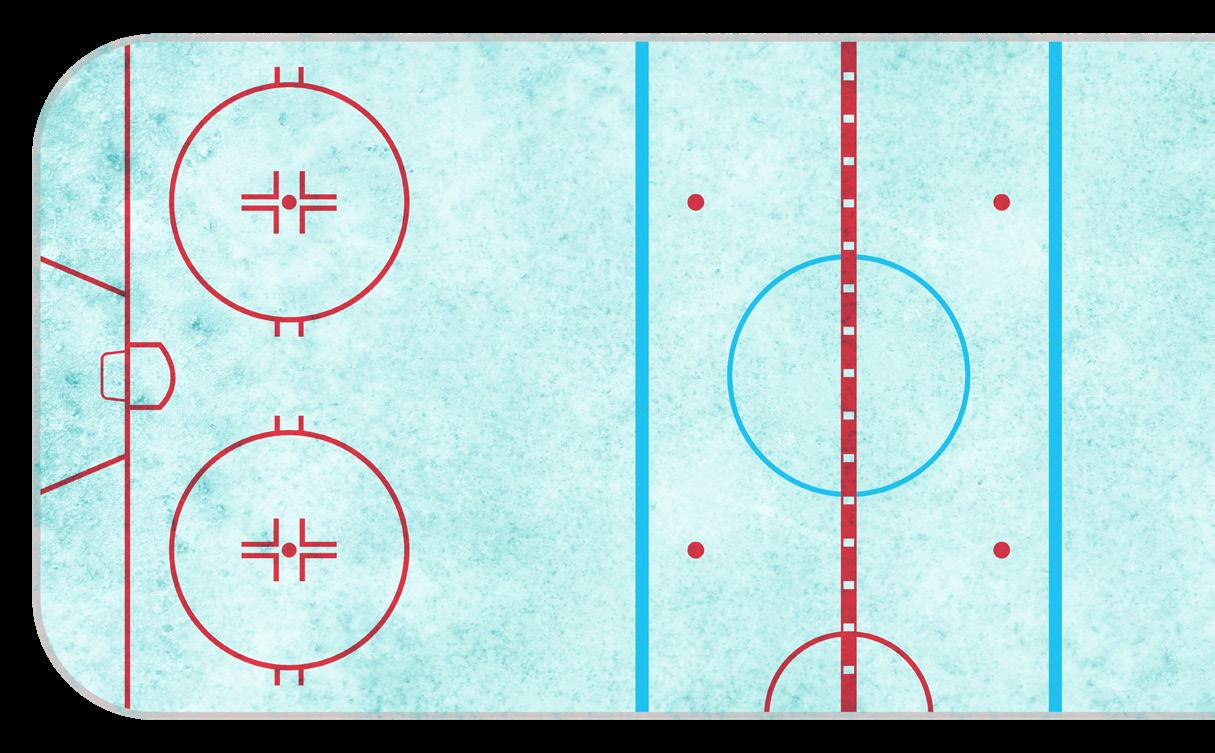
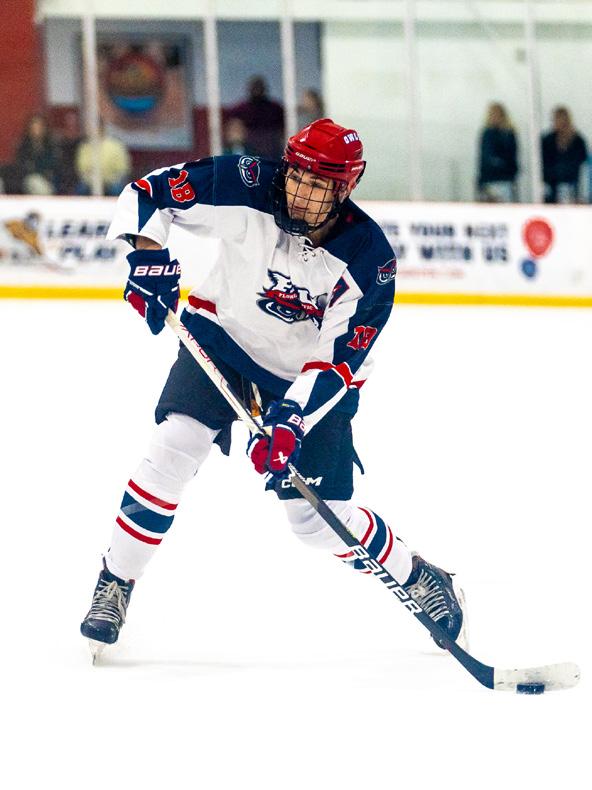
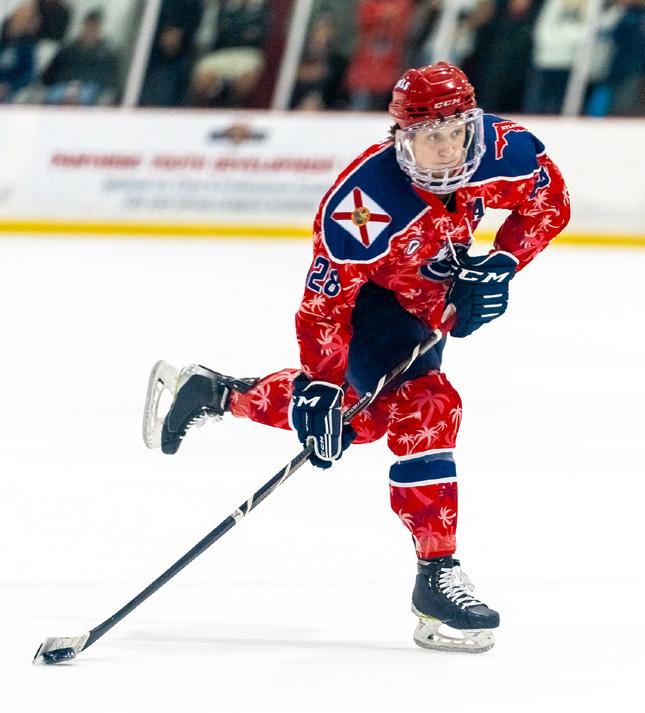
score of 5-2 to capture the Battle at the Beach trophy and first championship title.
“I was surprised to hear that the Battle of the Beach tournament was the first tournament victory for FAU hockey,” Long said. “I was very surprised by that. It’s been a lot of fun and I never thought I’d enjoy it as much. The connectivity of hockey in general has grown so much. South Florida has become such a great place to come play. We’d love to continue to grow that support from the community and the school and grow more awareness around the hockey team.”
The players, coaches, board members and game-day staff also oversee fundraising for the team to have ice time, game ice, travel and other needs paid for, since they do not receive funds from the NCAA. Long credits the success of the team to the buy-in they have received thus far from donors, local corporations, FAU alumni and fans, which has helped shape its chemistry.
“We see this at the rink and away from the rink. The chemistry has grown so much and these guys know they’re doing something to help the team win and they feel it,” he said. “We preach positivity and openness and in turn, they get better every day. And the local support has really brought it to the next level.”
 - Christian Long
- Christian Long
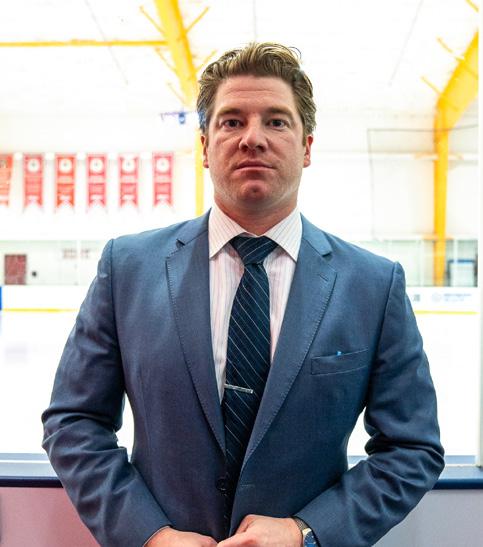
The sudden success of the FAU Hockey Club has not been overlooked, catching the attention of many students at the university. So much so that the team recently revealed plans to add an additional team for the 2024-25 season.
“A Division III team will complement their existing Division II team currently competing in the AAU College Hockey league,” said Scott Grosky, general manager of the FAU Hockey Club. “Over the past several years, the FAU Ice Hockey Club reported an extraordinarily high number of skilled studentathletes who had expressed interest in participating with the club team. With an increasingly stable organizational structure, we feel the time is right to grow.”
For Long and his team, this latest news only adds to the excitement already building for the 2024-25 season.
“We have a ton of pieces to get us to where we want to be next year,” Long said. “Our core is very much intact and going through what we did this year will resonate with the guys returning. We have a burning desire to get back to that national championship and the team is already prepared to do what it takes to get there.”
Bruno agreed.
“I am really looking forward to opening night because it’s the beginning of the new season and a fresh start,” he said. “It will be a new chapter. And we are going to close it off and win the whole thing.”
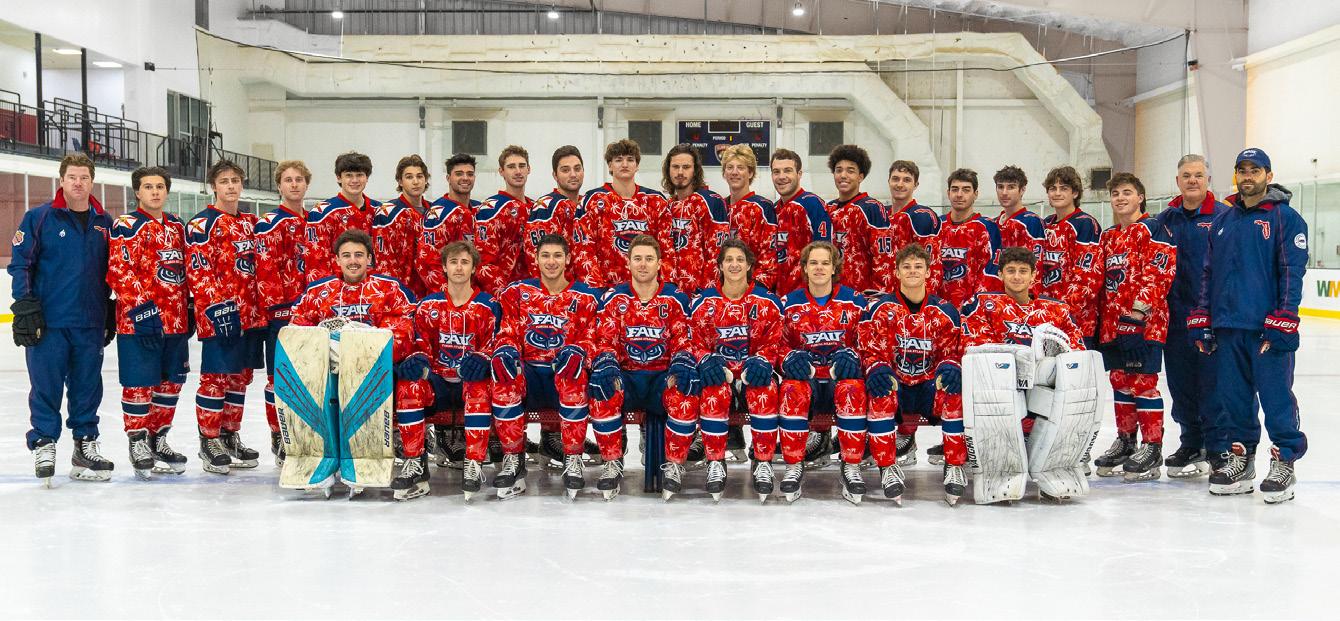
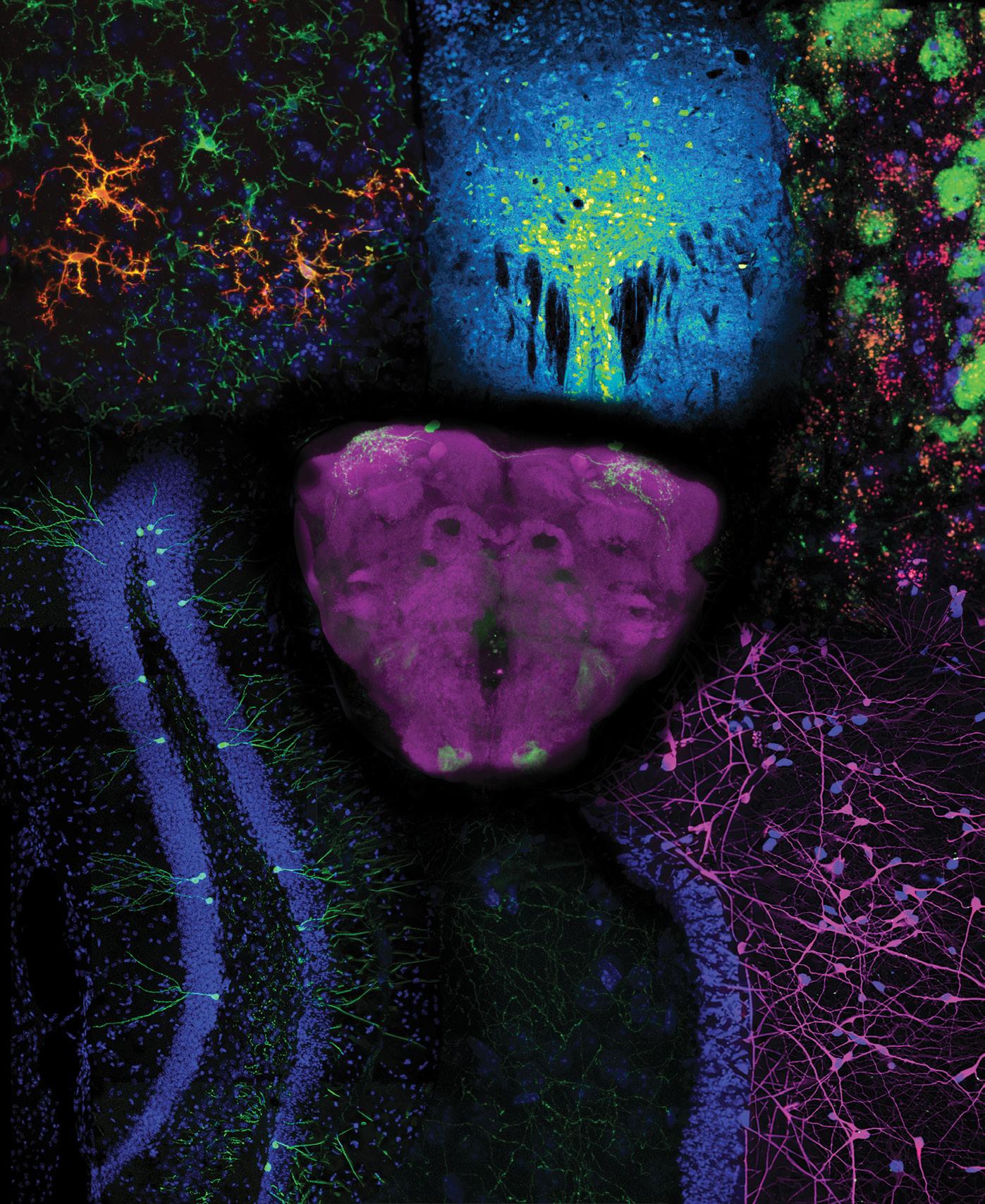


Headlines emerge daily about groundbreaking technologies, breakthrough medical treatments or bestselling new products. And behind all these innovations are ideas. But harnessing those ideas and fostering them through the discovery and development process requires more than creativity and scientific prowess.
At Florida Atlantic University’s College of Engineering and Computer Science, a culture is emerging that places emphasis on the importance of protecting intellectual property (IP) and formulating projects that translate beyond the academic setting to make valuable contributions to the world.
“If you just look at the world, the world is primarily being run on intellectual property,” said Hari Kalva, Ph.D., interim chair and professor in the Department of Electrical Engineering and Computer Science. “We tell students to think about it broadly.

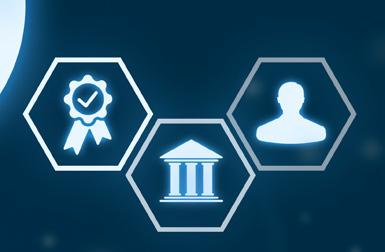
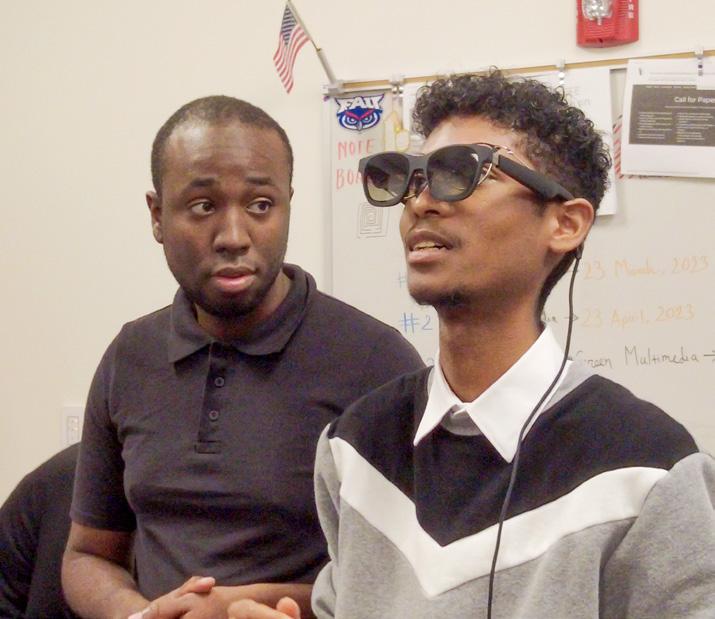
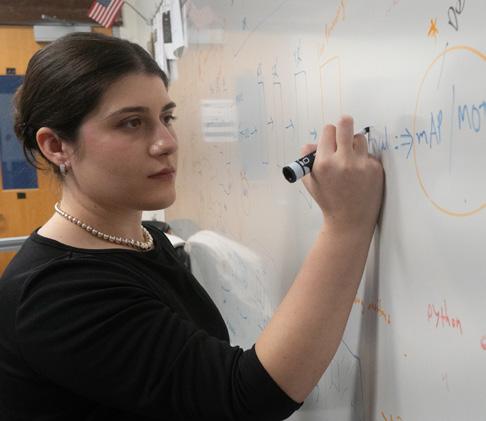

It’s not just a patent. Maybe the valuable code you write or the library you create becomes popular and everybody begins to use it. There may be ways to protect it, and you need to make sure you do that.”
IP can come in a variety of forms: patents, copyrights, trademarks and trade secrets. However, the process of securing IP protection is time-consuming and complicated. By introducing students to the basic concepts of IP as part of their undergraduate or graduate degree curriculum, they enter the workforce with an advantageous tool as they build a career.
“We tell students, you’re creating something valuable, right?” Kalva said. “If you are entrepreneurial, you can create something of your own. Or if you go work for somebody, your employer will appreciate that you care about IP because that’s what creates value in an organization these days.”
The College of Engineering and Computer Science began incorporating IP education several years ago. More recently, the college and Florida Atlantic’s Office of Technology Development formed a partnership with the National Academy of Inventors (NAI) and the Michelson Institute for Intellectual Property to incorporate an IP certificate into the curriculum at both the undergraduate and graduate levels.
The certificate was first introduced to undergraduate students in Kalva’s senior design course. In this course, students actively create projects intended to tackle real-world problems with novel ideas. The IP certificate helps students understand that their ideas and innovations don’t have to be relegated to the confines of an academic institution. They could be the groundwork for the next big invention, and they should know how to claim their ownership as soon as possible.

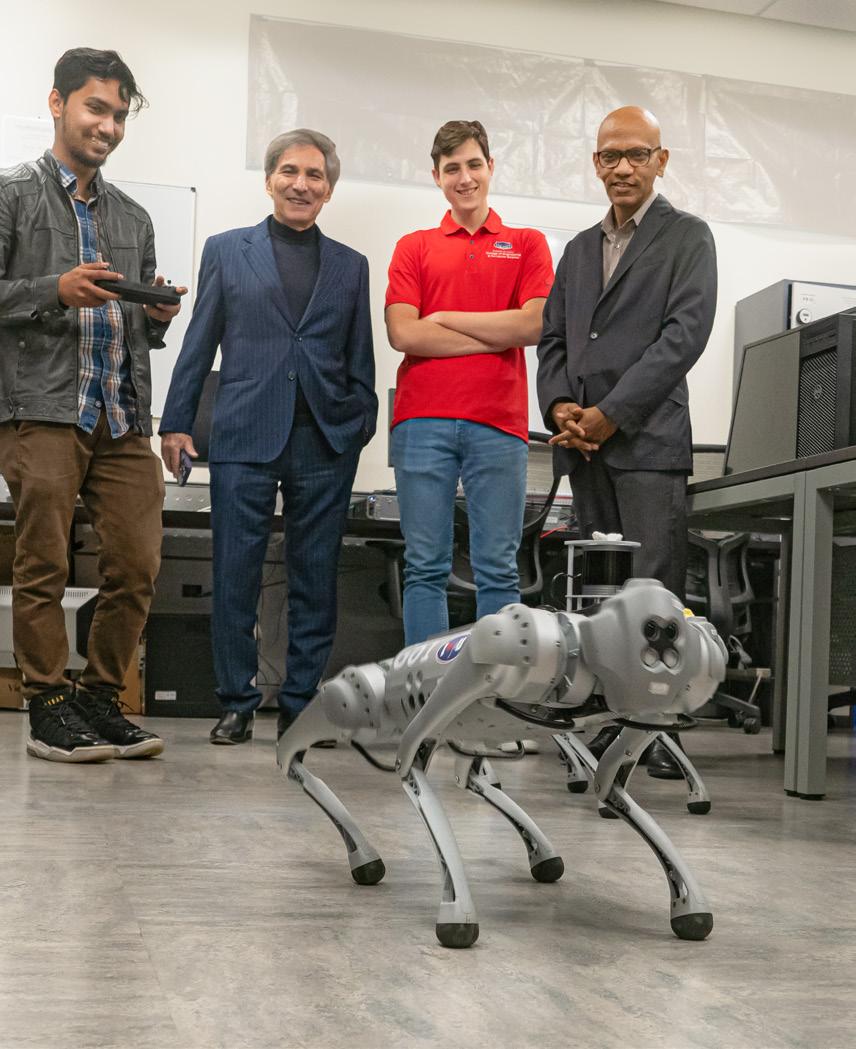

Video compression technology enables streaming-video applications such as YouTube and Netflix to transmit highquality video simultaneously to billions of devices across the globe. Technology developed by Florida Atlantic’s College of Engineering and Computer Science and research sponsor OP Solutions, LLC promises to improve the process of streaming media.
In 2023, Florida Atlantic and OP Solutions announced that university-developed intellectual property protected by 11 United States patents was accepted as part of Versatile Video Coding (VVC),
By graduating all of our students with the value-added skill of intellectual property, I believe that adds to their portfolio and it signals that they can think a little more broadly about value creation.”
Kalva explained that many engineering students are naturally curious. They may write software or develop designs that could be part of a real-world solution, but they don’t naturally have the entrepreneurial understanding of how to harness it and develop it into something bigger.
“We try to emphasize quite a bit to students about identifying intellectual property and that the creative process is worth something, it’s valuable, and they need to think about it that way,” Kalva said. “Until you have an IP framework, people don’t really concern themselves about whether they are producing something of value.”
More than 700 engineering students have graduated with the IP certificate. After seeing the success of the new requirement and the interest it sparked in students, Kalva and his colleagues are developing new strategies to integrate IP concepts as an integral component of the entire degree journey.
- Hari Kalva, Ph.D.
During the Fall 2023 semester, the IP certification coursework was shifted to the Fundamentals of Engineering course, which is required for most undergraduate engineering students. Now, the groundwork is laid at the very beginning so students are prepared when their work transcends simply fulfilling an assignment and becomes something worth owning and protecting.
By the time these students reach the senior design course, they have a foundational understanding of IP. Kalva and his colleagues are currently working with the Michelson Institute and NAI to pilot an innovation commercialization module to help students develop the necessary skills to translate their ideas into business plans that offer real-world solutions.
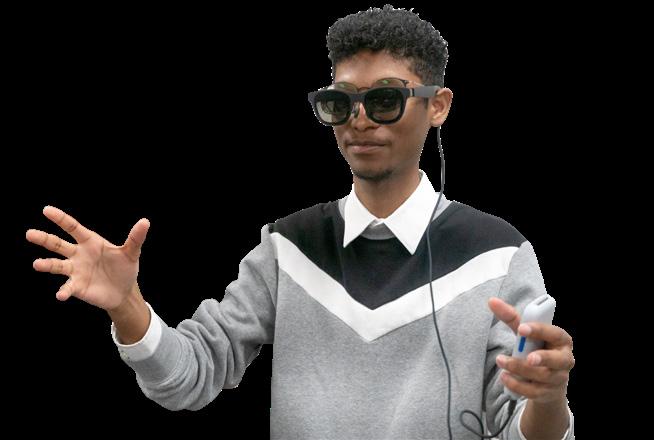
a core technology for next-generation video streaming.
Through the VVC, patent-protected technology that was developed at Florida Atlantic is part of the new global standard for the video-streaming industry. Now, the technology is being deployed across the world. For instance, Mediatek, the No. 1 television chip provider in the world, integrated VVC in their smart TV chips; Sony recently licensed VVC patents; and Brazil has mandated that VVC be part of the country’s broadcast television standard. With VVC deployments accelerating,
inventions developed at Florida Atlantic will soon be incorporated into every new TV and mobile phone.
These efforts are led by Hari Kalva, Ph.D., associate chair and professor, and Borko Furht, Ph.D., professor and director of the National Science Foundation Research Center within the Department of Electrical Engineering and Computer Science.
“Through this work, we are collaborating internationally with researchers from companies, universities and different countries, and FAU is the only U.S.
Graduate students also must complete the NAI IP certification early in their degree programs. As Kalva points out, the entrepreneurial aspects of engineering are often overlooked in undergraduate programs, so many students begin higher-level programs without this skillset in place.
university that’s part of these efforts,” Kalva said.
International visibility opens new opportunities for Florida Atlantic, particularly for graduate students who are involved in VVC projects.
“This is a highly specialized technology. It has a steep learning curve,” Kalva said. “When other research teams are looking for interns, they want them to be able to hit the ground running. Companies know they can hire FAU students because they know they have experience that is highly valuable.”
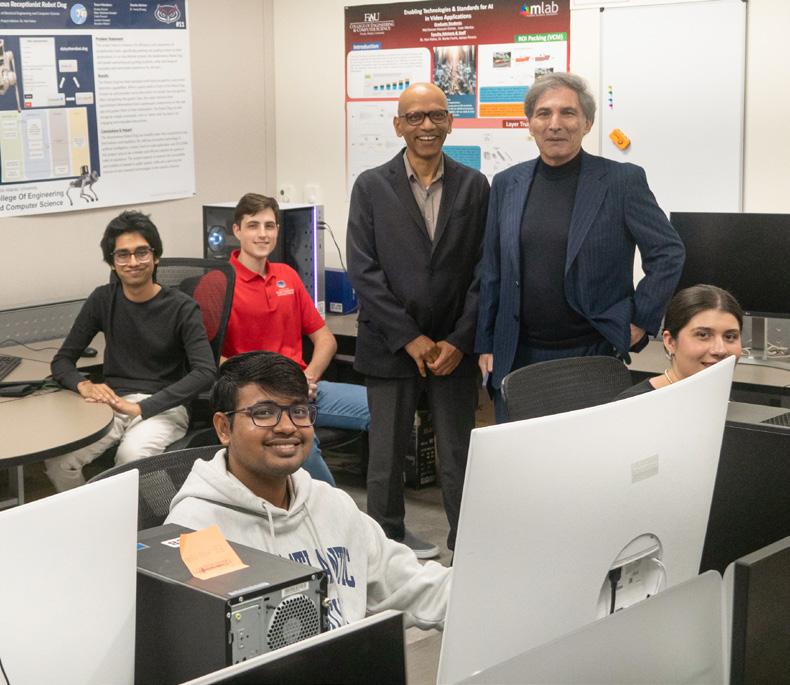

“By graduating all of our students with the value-added skill of intellectual property, I believe that adds to their portfolio and it signals that they can think a little more broadly about value creation,” Kalva said.
Juan Merlos earned his bachelor’s degree in computer science in 2022 and master’s degree in computer engineering in 2023. As a master’s student, he completed the IP certification program. Now a doctoral student focused on video coding for machines, Merlos is named as a co-inventor with Kalva on five patent applications.
“Understanding how intellectual property and the patenting process work is important for my daily tasks,” Merlos said. “It is a valuable asset not only for education, but for the workplace as well, especially in research and development.”
Recognizing the value of innovation and entrepreneurship is integrated into the college’s faculty culture, as well. As Kalva explains, not all faculty members have the same familiarity or interest in the topic, but educating them helps bring awareness of how they may benefit from the IP process. Importantly, success in IP, such as securing patents or licensing agreements, is a key consideration in the tenure review process for faculty, in addition to traditional criteria such as scholarly works and publications.
By weaving a culture of innovation into both the student and the faculty experience, tangible results spill beyond the classroom setting and into research labs where IP creation can happen in

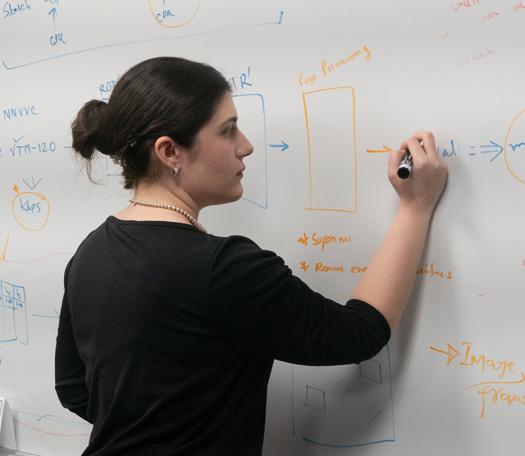
earnest. Graduate students also become co-inventors, sometimes completing their degrees with their names tied to multiple patent applications.
A key partner in the College of Engineering and Computer Science’s success with IP is Florida Atlantic’s Office of Technology Development. The office manages all formal IP protection activities. Since 2020, the college has secured eight patents, the most of any single college or institute throughout the university.
“Collaboration at all levels is at the core of the college’s innovation efforts,” said Kalva. “We have this culture of innovation in the college, and we want to make sure it’s reflected in all the work we do.”
Dana Vouglitois, associate director of technology development, said it’s not unusual for engineering departments to see the most success with securing patents at a university. However, she sees Florida Atlantic’s College of Engineering and Computer Science as an example of how to meld academic achievement and innovation.
“In the College of Engineering, they value innovation and entrepreneurship, they’re incorporating it into the curriculum, and their students and faculty are experiencing success,” she said.
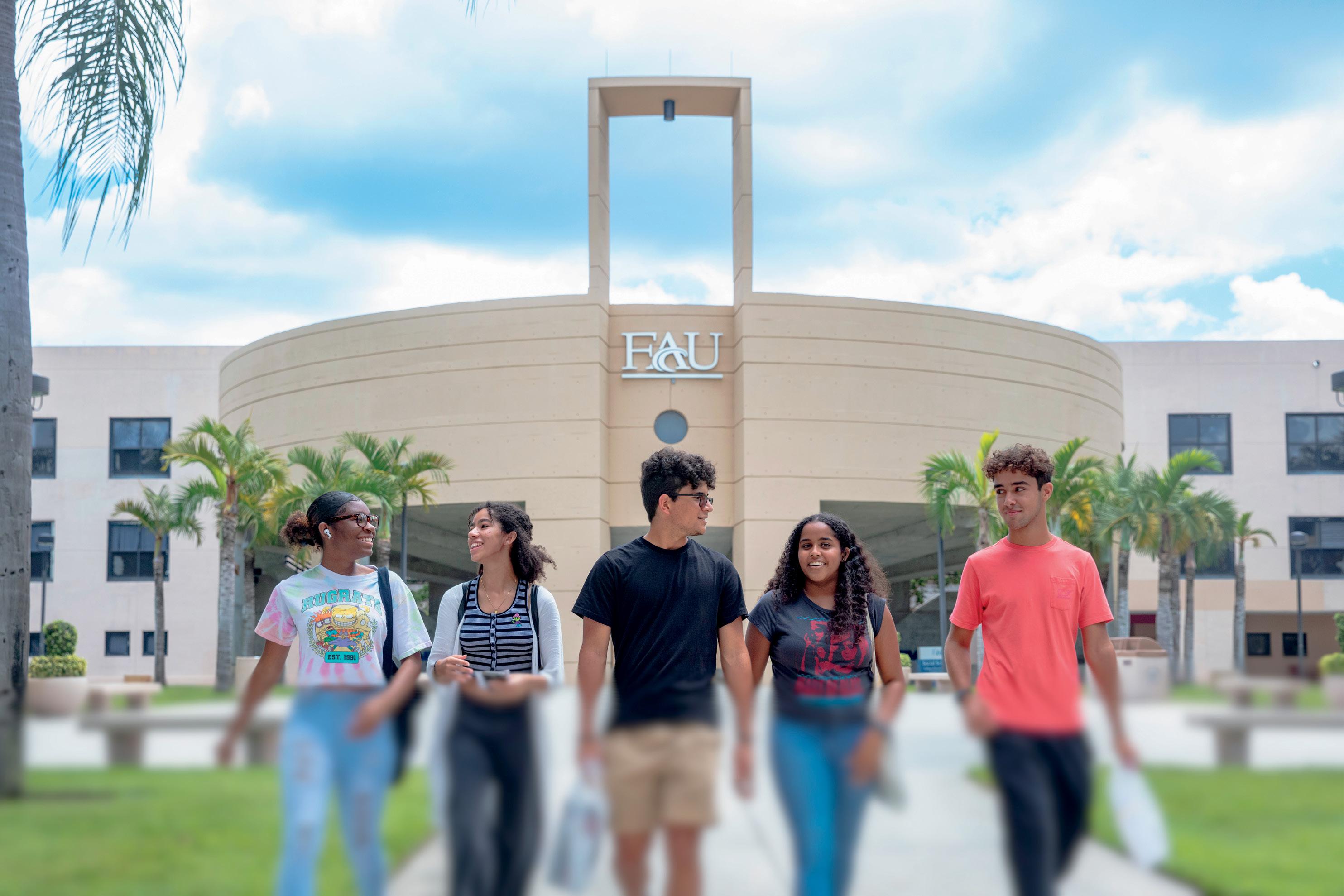

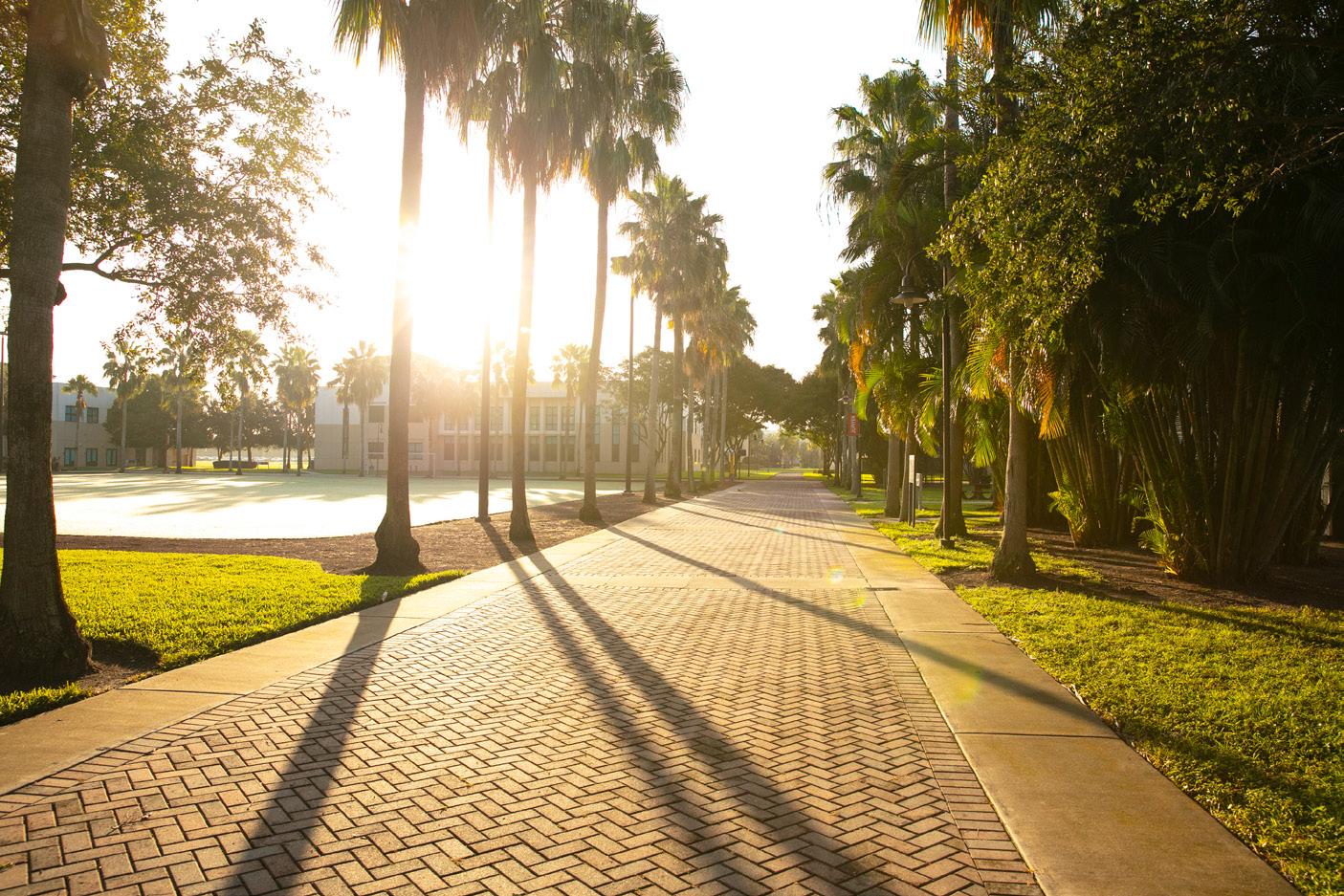
Florida Atlantic's John D. MacArthur Campus in Jupiter is where next-generation scientific learning unites high-achieving students, distinguished faculty and esteemed partners to redefine educational excellence. courses, workshops and mentorship from renowned scientists, providing hands-on experience and access to cutting-edge

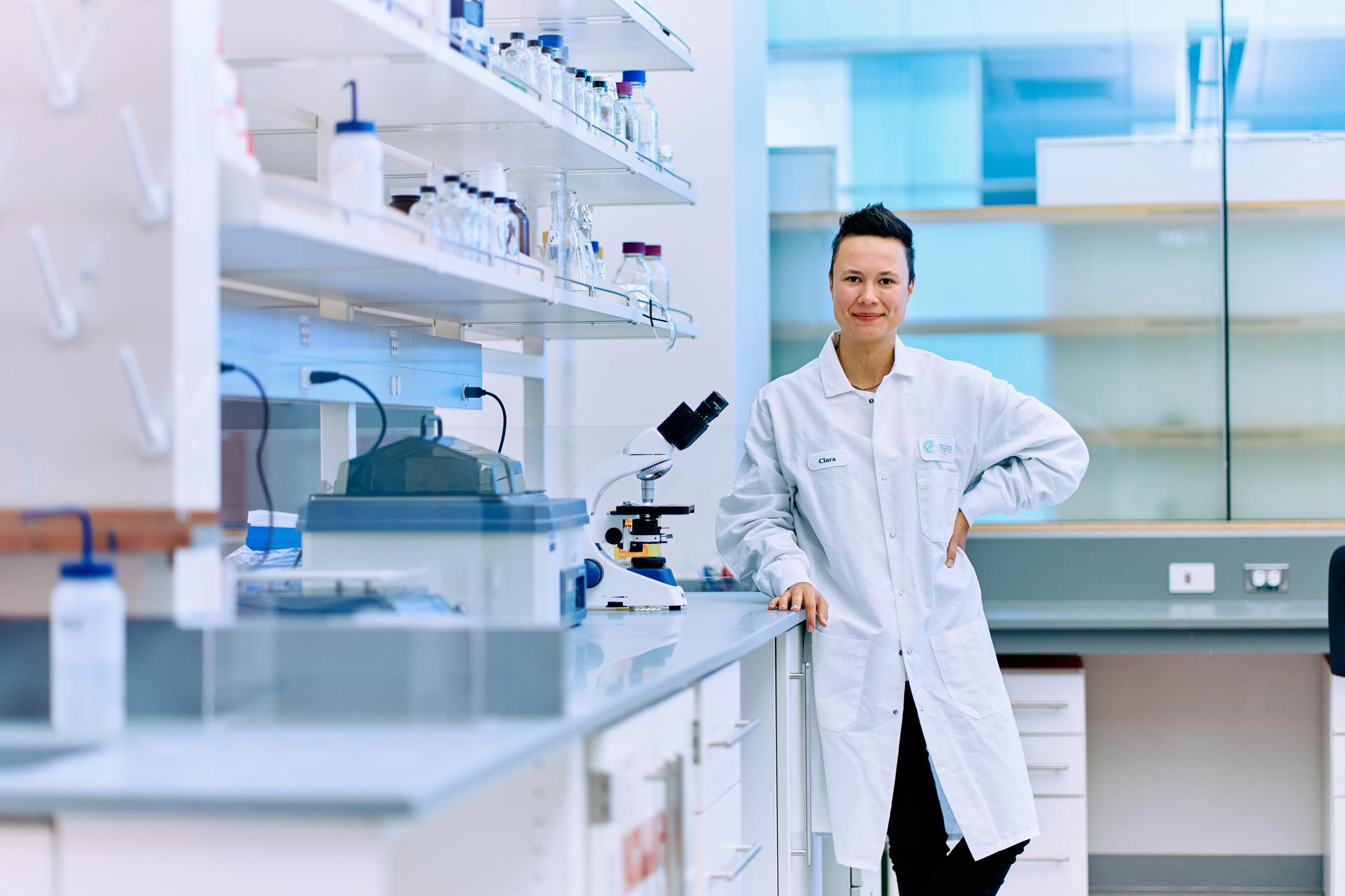
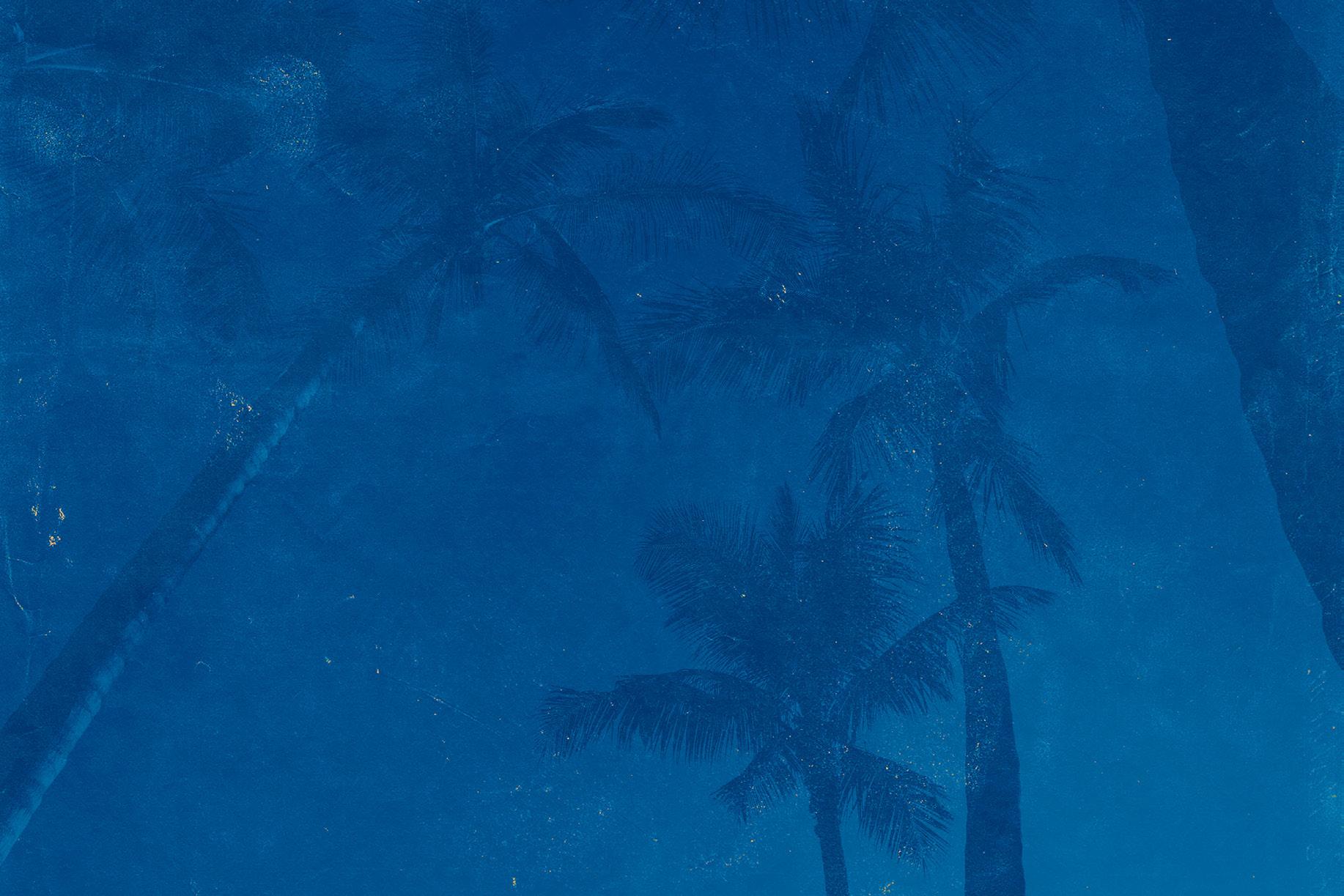
The IMPRS for Synapses and Circuits o ers exciting and unique connections to the world-renowned Max Planck Society, as well as unparalleled research resources at both Max Planck Florida Institute for Neuroscience and FAU. This novel experience can open the possibility to take my research and my career anywhere.”


 Clara Tepohl
GRADUATE STUDENT AT FAU JUPITER
Clara Tepohl
GRADUATE STUDENT AT FAU JUPITER


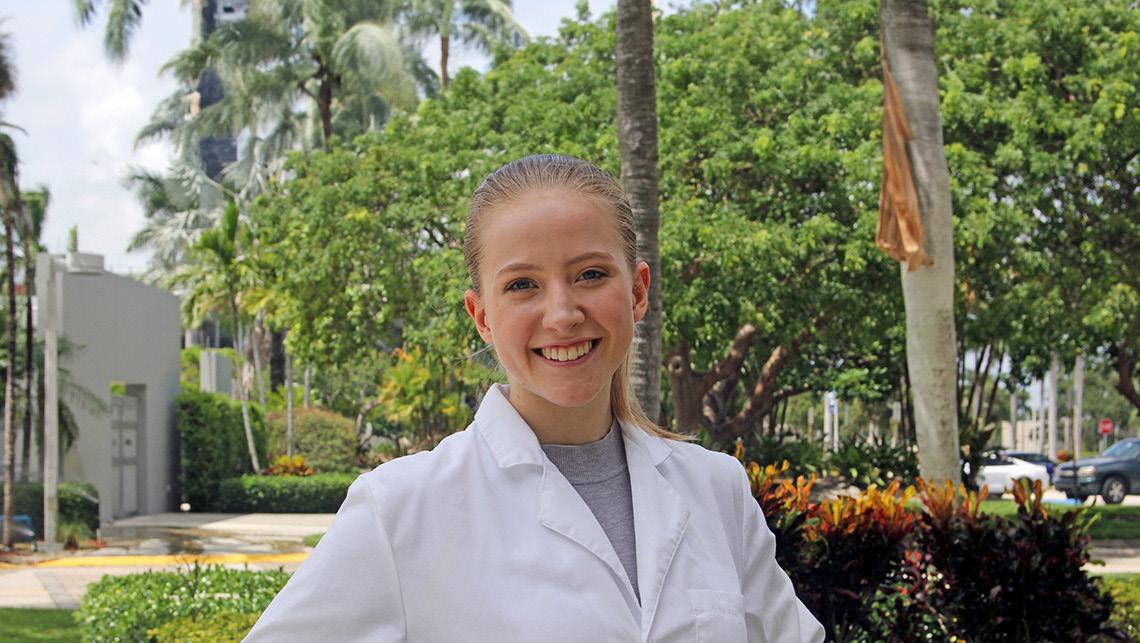
Most people do not have these qualifications coming out of undergrad.”
 Michelle Gras SENIOR MAJORING IN BIOCHEMISTRY UNDERGRADUATE RESEARCH STUDENT AT FAU
Michelle Gras SENIOR MAJORING IN BIOCHEMISTRY UNDERGRADUATE RESEARCH STUDENT AT FAU

JUPITER

Engage in a nationally recognized Course-based Undergraduate Research Experience (CURE) that provides hands-on research experience in a credit-bearing, classroom laboratory environment. Learn cutting-edge techniques while generating original data that can be used for publication and student thesis projects.
Be empowered to work with world-class faculty researchers through a summer research program and innovative neuroscience training courses. Have the possibility of directed independent research and an honors thesis with program facult with exclusive enrichment opportunities, including courses taught or co-taught with scientists from Max Planck Florida Institute (MPFI) for Neuroscience.

Prepare for the future with a paid, 10-week program of training, mentorship and research. Designed for driven students headed for graduate studies or careers in STEM, students gain invaluable laboratory experience at Florida Atlantic, The Wertheim UF Scripps Institute or MPFI.
Maximize your potential with innovative graduate education, inspired curricula, high-quality research, effective problem-solving, and general creativity. Choose from one of the many Florida Atlantic master o ered on the John D. MacArthur Campus by the Charles E. Schmidt College of Science, Stiles-Nicholson Brain Institute and the nation’s only International Max Planck Research School for Synapses and Circuits (IMPRS-SC).
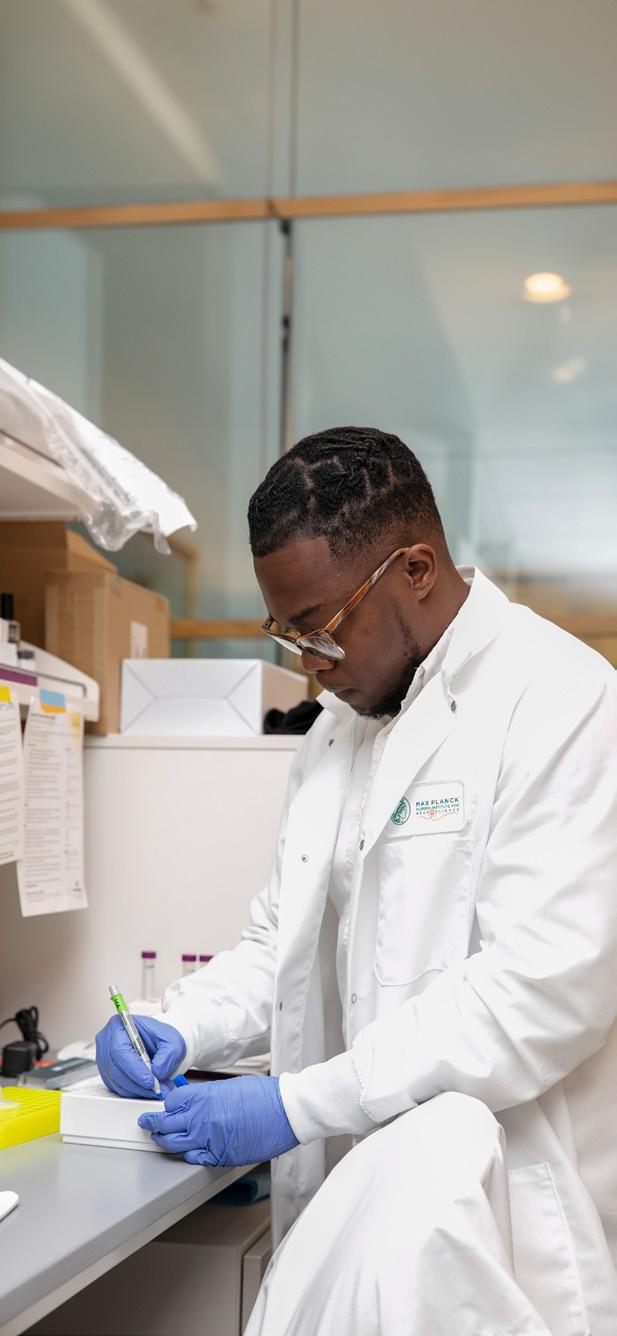



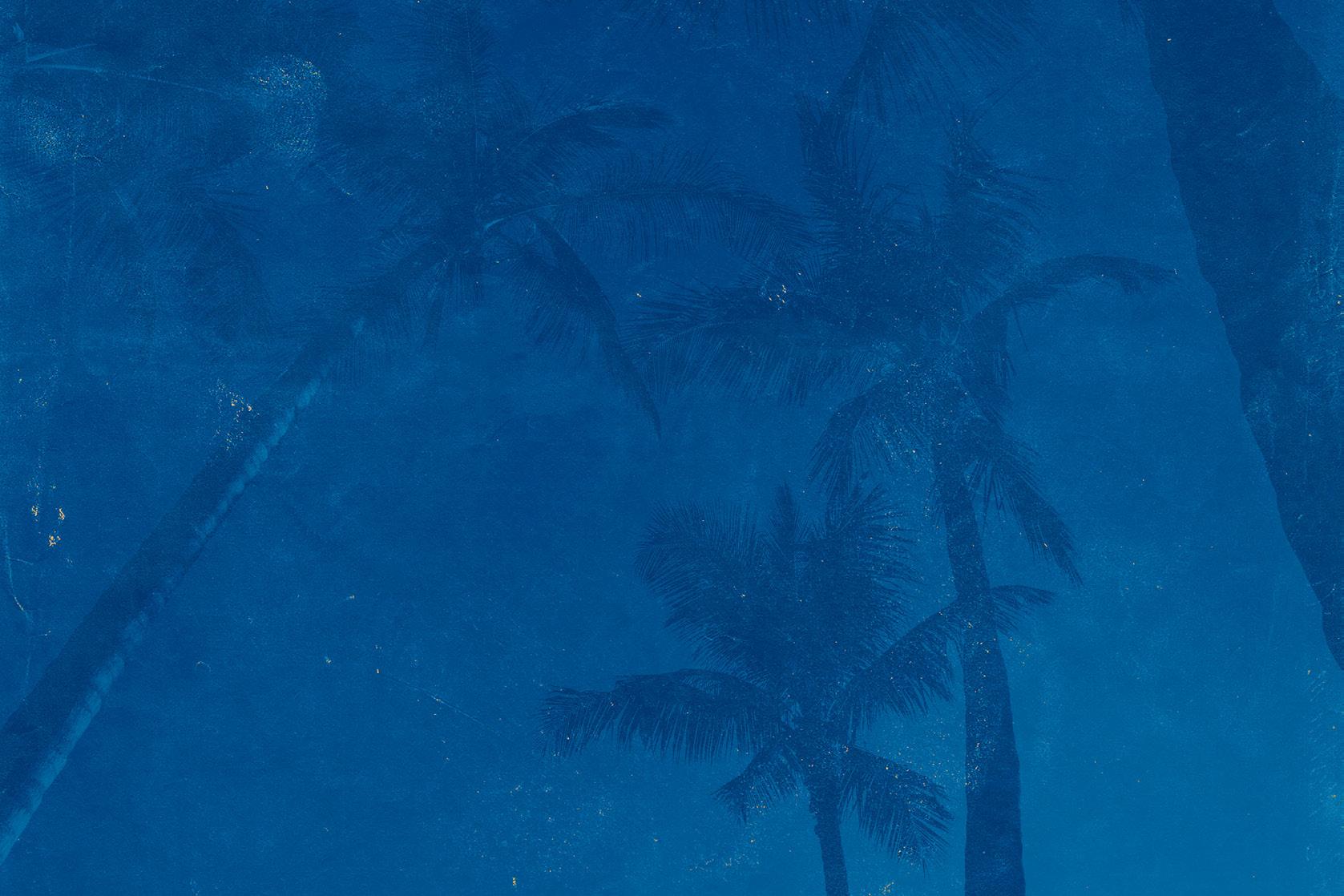
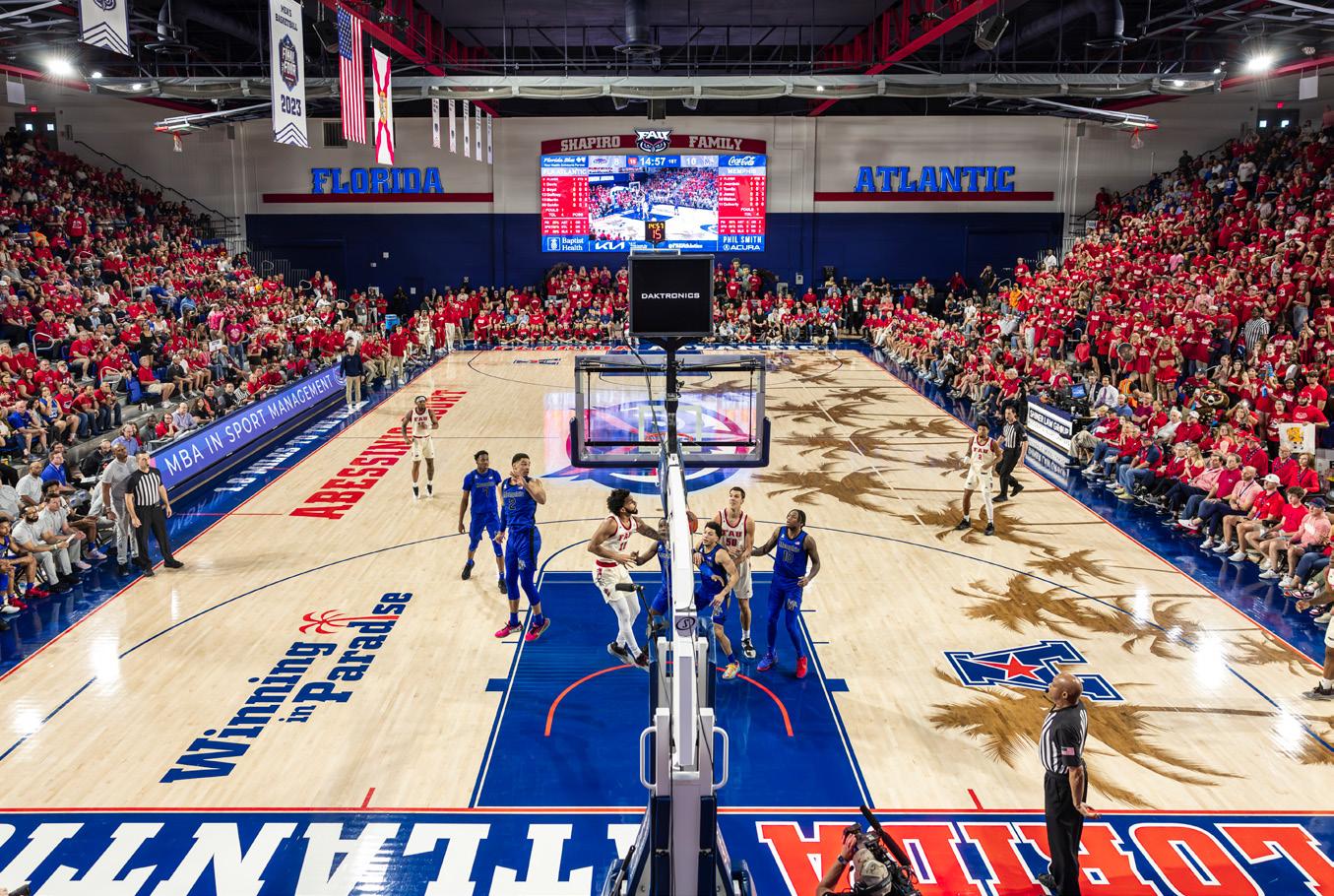
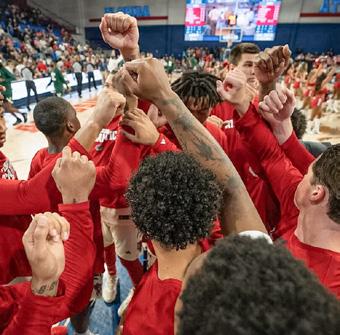
Sports teams are often defined by numbers. Most often, it’s wins on the left side of the hyphen and losses to the right. The story of the 2023-24 Florida Atlantic University men’s basketball team will long be told by numbers that go beyond final scores or points per game, but rather numbers that define a program embraced by a new spotlight of attention.
On the heels of its historic March Madness run in 2023, the Owls transitioned into the American Athletic Conference (AAC) and put together one of the best seasons in program history, culminating in a second consecutive appearance in the NCAA Tournament and the third trip to the “Big Dance” in school history. And throughout the season, they became the hottest ticket in Boca Raton.
A sold-out crowd of 3,161 packed Eleanor R. Baldwin Arena for every one of the team’s home games during the 2023-24
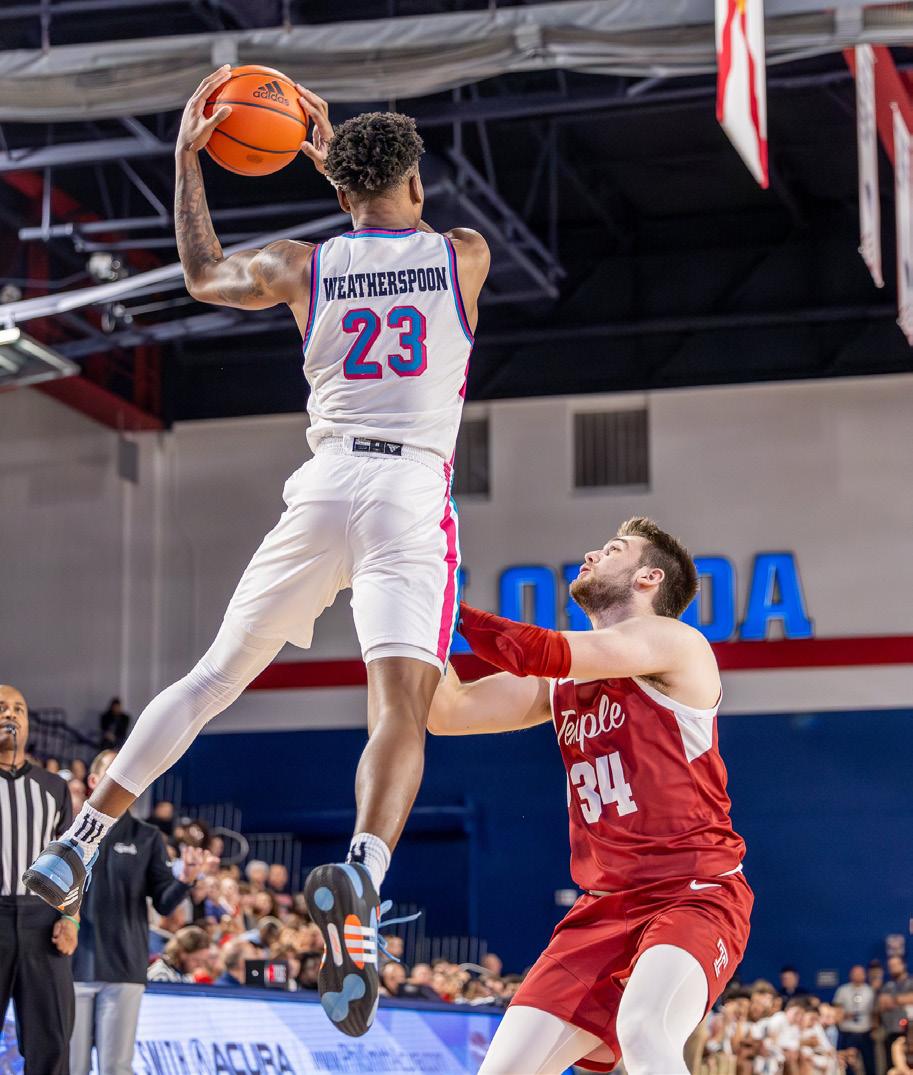
campaign, making Florida Atlantic one of just 14 teams to play before capacity crowds at every home game during the season. The Owls have posted a 30-1 record at “The Elly” over the past two seasons, tied for the most home wins by any team in the nation over that period. They have not lost a conference game in Boca Raton since Feb. 19, 2022, a streak that now spans more than two calendar years at 20 consecutive games.
“Our fan support the entire season was fantastic, from announcing a full-season sellout in October 2023 to unbelievable student turnout at every game,” said Brian White, vice president and director of athletics. “We truly have created an incredible home-court advantage. It’s no surprise we’ve won 30 of our last 31 games in Boca Raton and sold out 21 straight.”
The electric game-day atmosphere in the arena and home success propelled the Owls to a great first season in the AAC. They
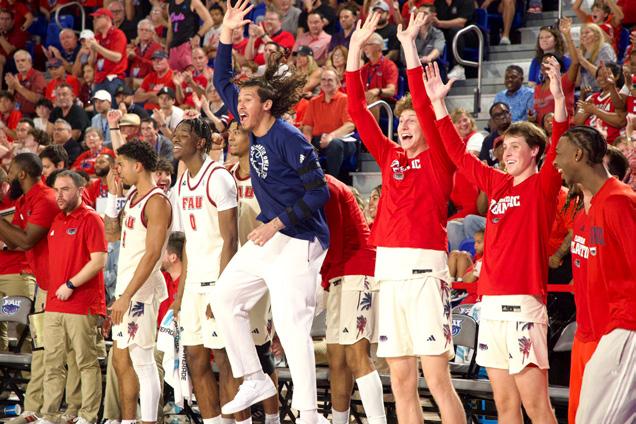
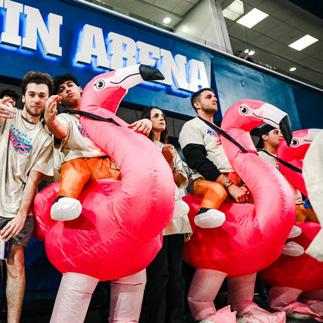
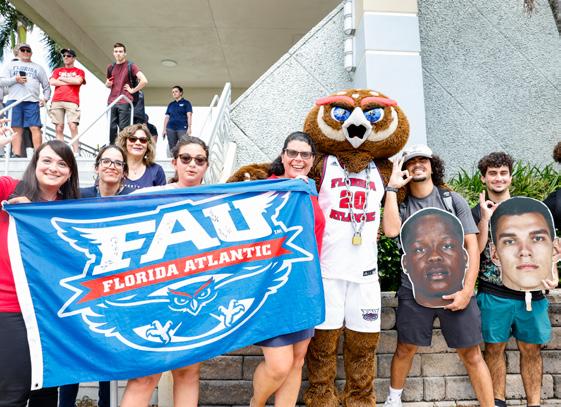
finished 14-4 in conference play during the regular season to place second entering the league tournament and finished 25-9 overall. In the past two years, the Owls have won 60 games, the third most in Division I basketball.
Florida Atlantic also played in the three most-watched games by AAC teams during the season, including a regular-season school record of nearly 1 million viewers on March 9. The 92-84 victory over the Memphis Tigers drew 922,000 viewers on CBS, making it the most-viewed regular-season men’s game in FAU history.
In total, Florida Atlantic drew more than 5 million viewers for its linear television games during the 2023-24 season. No AAC team attracted more eyes than the Owls, with the Florida Atlantic/Memphis game topping the Florida Atlantic/Illinois game in the Jimmy V Classic, which was played at New York’s
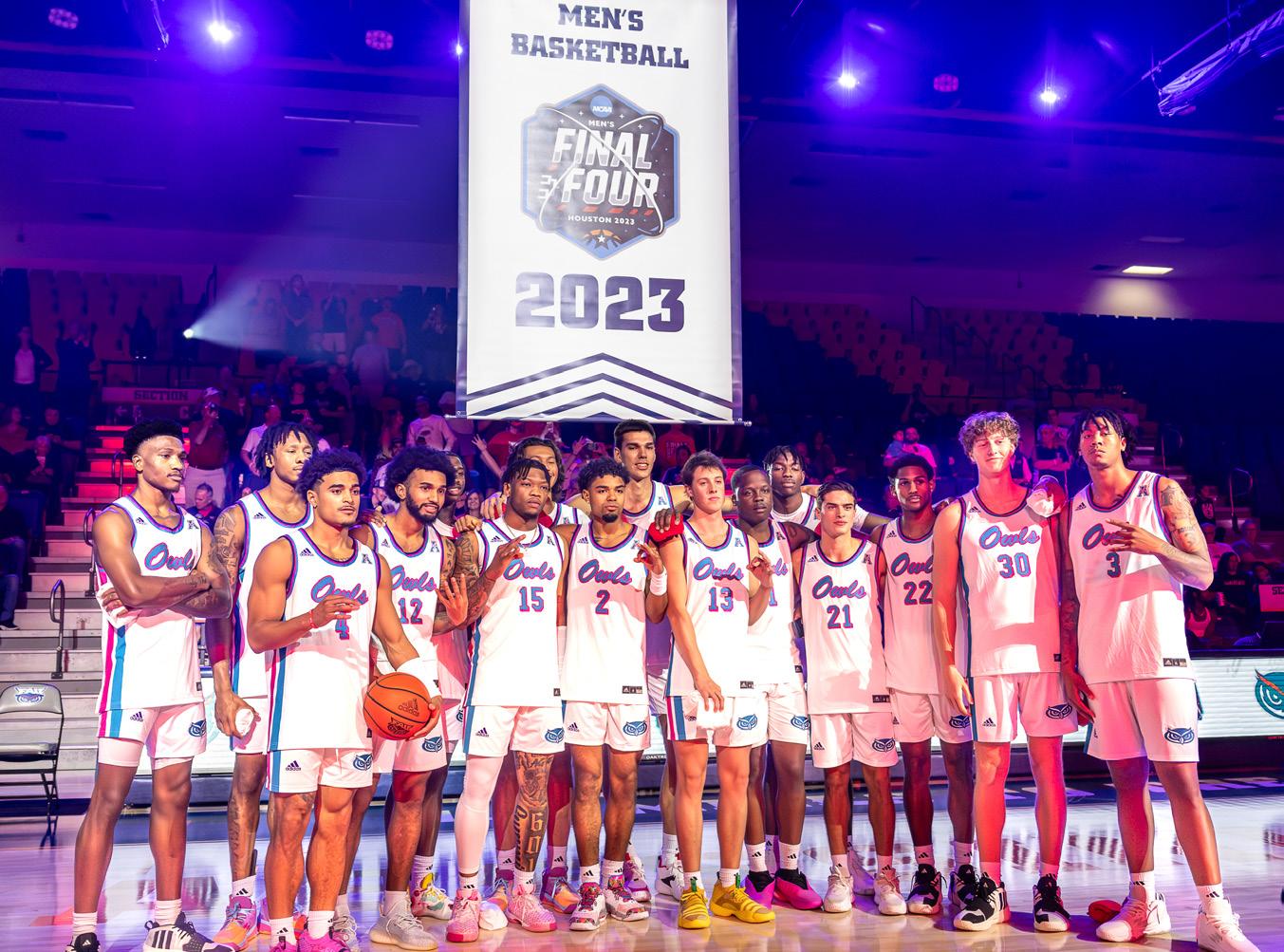
Madison Square Garden on Dec. 5, 2023 (768,000 viewers on ESPN). The third most-watched game was Florida Atlantic/Arizona (735,000 viewers on FOX) on Dec. 23, 2023.
After only three nationally televised games during the 2022-23 regular season, Florida Atlantic was on national TV 20 times in 2023-24.
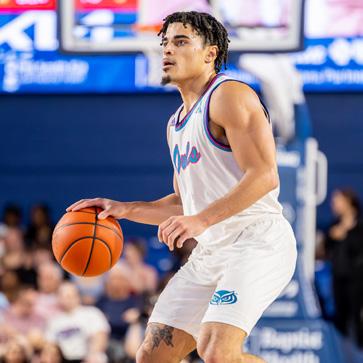
The Owls racked up several other accomplishments during the season, including winning the 2023 ESPN Events Invitational with victories over Butler, Texas A&M and Virginia Tech, and were ranked in the Associated Press Top 25 for several weeks. The team compiled a 126-69 record over the course of six straight winning seasons.
“Our men’s basketball program is in an incredible position of strength and we are poised to continue that momentum,” White said.
Several players also earned individual accolades. Guard Johnell Davis was named the Co-AAC Player of the Year and was unanimously selected to the All-Conference First Team. He also was a Top 10 finalist for the Jerry West Award, a Top 20 finalist for the Wooden Award, a member of the Top 30 Naismith Midseason Player of the Year watch list, and a member of the Oscar Robertson Trophy All-America watch list.
Additionally, guard Alijah Martin and center Vlad Goldin were named to the AAC All-Conference second team.
“I am incredibly proud of our players and coaches for their many successes, and I am delighted that they were rewarded with another trip to the ‘Big Dance,’” said FAU President Stacy Volnick. “It has been wonderful watching the games along with the sold-out crowds at Baldwin Arena. The impact of the team’s performances — which have elevated not only the basketball program, but the entire university’s profile — cannot be understated.”
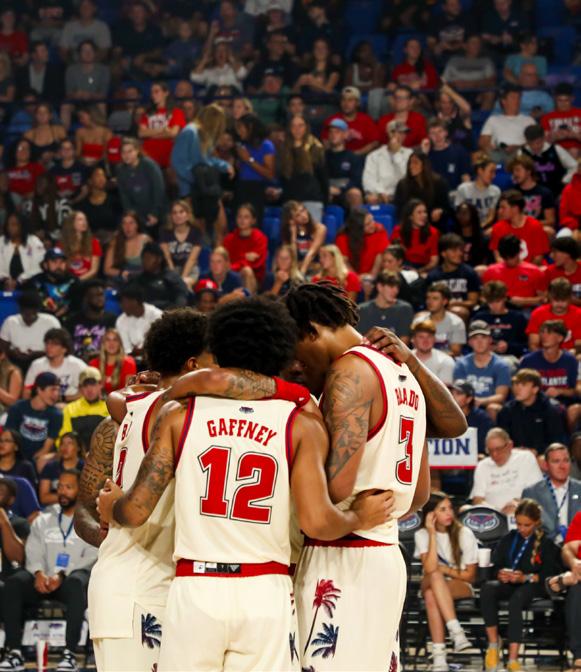
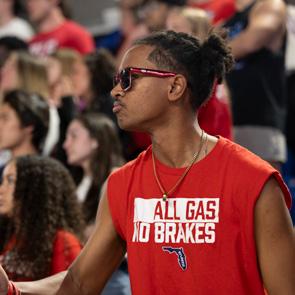
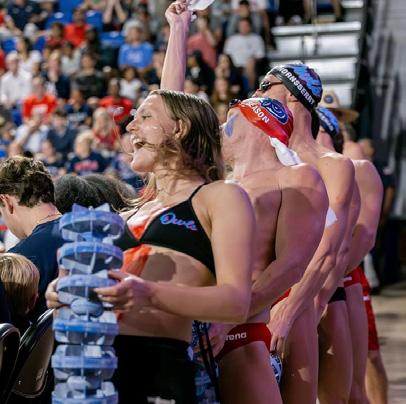
Florida Atlantic University announced on March 27 that John Jakus had been named head men’s basketball coach. Most recently, Jakus was the associate head coach at Baylor. He spent the last 12 seasons on staff at Baylor (2012-2014 and 2017-2024) and Gonzaga (2014-2017), coaching under two of the game’s most successful head coaches: Baylor’s Scott Drew and Gonzaga’s Mark Few.
“When we began this search, we spoke to coaches, athletic directors, administrators, scouts and agents, and the name that kept coming up with glowing reviews was John Jakus,” said Brian White, Florida Atlantic’s vice president and director of athletics. “He checks so many boxes in what we’re looking for to enhance and build on the momentum in our program. His pedigree, learning from two of the greatest coaches in the game today, is unmatched. John is a tireless worker who cares deeply for his players and has an innate understanding of the current landscape in college athletics. He is a winner and is passionate about doing it the right way. I’m so thrilled to welcome John, his wife, Sara, and their children, Brady, Cal and Harper to the FAU family.”
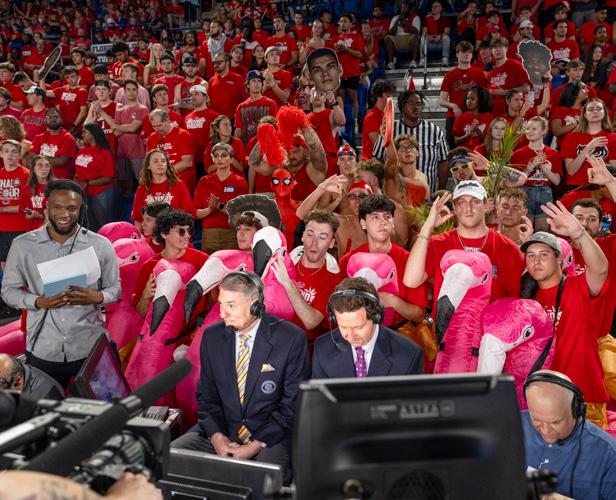
Members of the Florida Atlantic swimming and diving team, left, were loyal supporters of the men’s basketball team. ESPN credited their behind-the-net antics with Tulane’s 58 percent free-throw shooting on March 2. This helped carry the Owls to a 79-73 victory.
Baylor’s accolades with Jakus on staff include:
• 2021 National Championship title
• Two Sweet 16 appearances
• Six NCAA Tournament appearances
• 217-86 overall record
• 100-58 record in Big 12 Conference play
• Back-to-back Big 12 titles in 2021 and 2022
• A Top 5 offensive team in three of the last four years
• One of two teams with a Top 10 offense for four straight years, entering 2023-24
• Two Top 5 recruiting classes (three Top 15 classes) over the last four seasons
• One of only two programs with Top 5 recruiting classes in both 2023 and 2024
“This is such a special moment for me, my wife, Sara, and my children Brady, Cal and Harper,” Jakus said. “I’m both honored and humbled to be the head coach at Florida Atlantic University. I want to extend my sincere thanks to President Stacy Volnick, Director of Athletics Brian White and the Board of Trustees for their belief in me and my vision for the future of the Owls. This program

has been in such great hands, and I have a tremendous amount of respect for what Dusty May, his staff and the players have accomplished. FAU has been one of the best teams in the nation the last two years and I am so fortunate to carry on that tradition.”
From left: FAU President Stacy Volnick; John Jakus, head men’s basketball coach; and Brian White, vice president and director of athletics.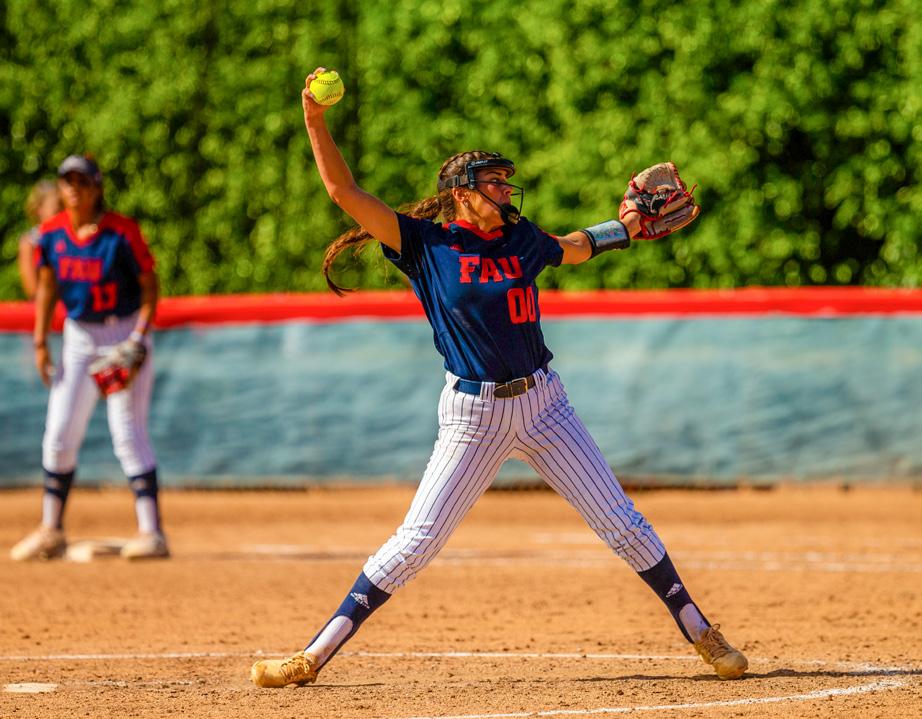
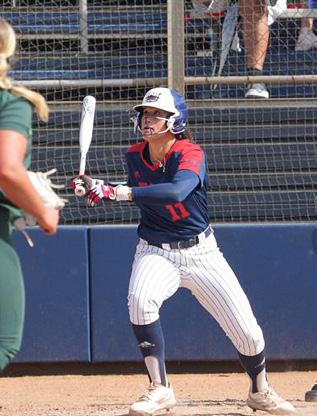
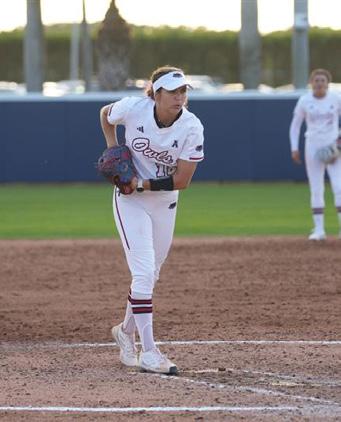
Softball Team Poised for a Banner Year
BY KATRINA MCCORMACKThe Florida Atlantic University softball team is making waves in its first season in the American Athletic Conference. The team started the season strong, going 30-8 through March, with seven shutouts. On March 25, following back-to-back conference sweeps against UAB and Memphis, the Owls earned a No. 25 ranking in the Softball America Poll. It was the first time the team had been nationally ranked since 2016, and Florida Atlantic was the only school from a non-Power 5 conference to be ranked.
The team’s pitching staff contributed greatly to its early success. At the time of publication, junior Gabby Sacco led
the conference in fewest runs allowed, walks allowed and home runs allowed.
Prior to the start of the season, Sacco was named one of the top pitchers in D1 Softball, ranked No. 36 in the nation for the 2024 preseason. She recorded 30 appearances and tallied 169.1 innings pitched in 2023, her second Florida Atlantic campaign. Compiling a 19-8 record with 96 strikeouts, she led the Owls to 35 wins — the most since 2017. Her 1.61 ERA ranked 30th in the nation and her victory total ranked 37th. This stellar season was capped off with multiple accolades, including Conference USA Pitcher of the Year, All C-USA First Team and Third Team All-South Region.
“Last year was definitely a shock to me. I wasn’t aware of what I was capable of,” Sacco said. “This year, I have the same mindset: stay consistent and do the preparation that I need to do for each game. Stay focused.”
Junior Ainsley Lambert and sophomore Kelsey Endress also return to pitching for the Owls. They are joined by sophomore transfer Jaden Martinez (USF) and graduate transfer Trinity Schlotterbeck (Maryland). As of March 31, Lambert led the conference in most games finished and saves; and fewest earned runs allowed, runs allowed and doubles allowed. Martinez was No. 1 in the AAC for fewest hits allowed, while
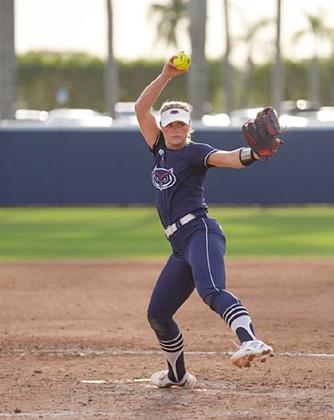
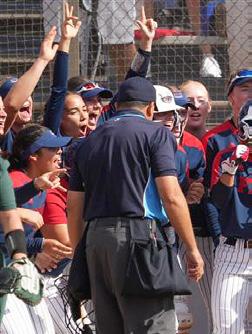

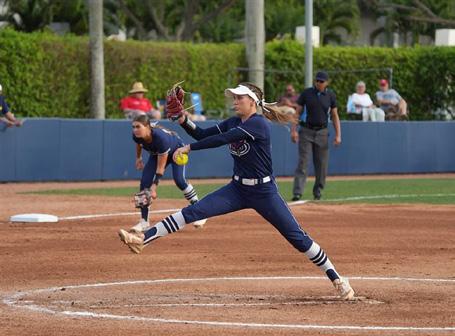
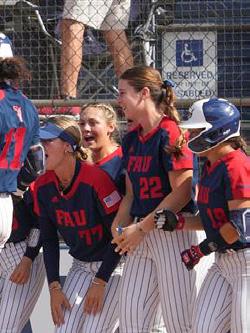

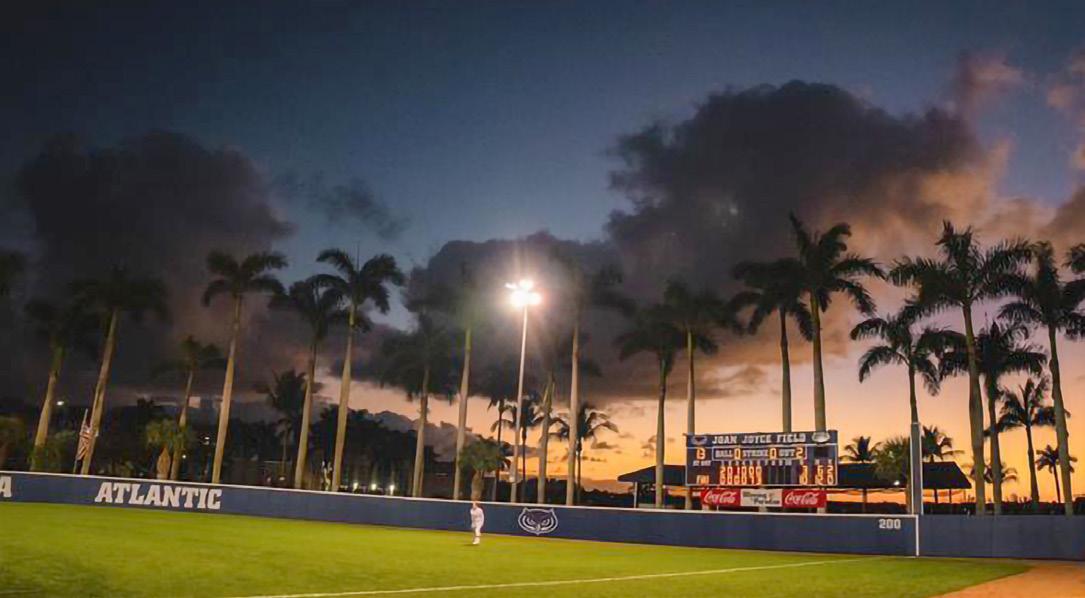
Schlotterbeck’s 13-2 record was the best in the league.
“We are excited to have a staff of five who complement each other in different ways. We have depth and experience, which has been fun to watch play out,” said Jordan Clark, head coach of Florida Atlantic’s softball team.
Much like the pitching staff, the Owls added depth throughout the lineup. Not only is Schlotterbeck a key contributor in the circle, she’s also a productive hitter.
The duo of third baseman Jesiana Mora, who had a stellar freshman season, and senior first baseman Zoey Jones, who
returns as a four-year starter, anchor the corners while the middle infield fills in new pieces to the puzzle. This includes freshman Kiley Channell, graduate transfer Cally Kildow (Arkansas) and junior Cameryn Orland.
The outfield returns starter Cammeo Presutti, who is joined by graduate transfers Kamryn Jackson (Duke) and Presley Leebrick (Lipscomb).
Behind the plate, Clark again brought in experience in graduate transfers Megan Moll (Missouri) and Katelynn de Leon (Troy).
By the end of March, Mora led the conference in stolen bases, while Jackson
had the most runs scored and Leebrick led in walks. Channell was ranked No. 2 in the nation and No. 1 in the conference in doubles.
At the middle point in the season, the team’s batting average was .307, as opposed to .258 a year ago, which has been a major factor in its success. Importantly, Florida Atlantic has averaged 6.1 runs per game, nearly double its run production a year ago — and much like last season, its opponents are scoring about 2.5 runs per game.
When all of the pieces come together, it just fits.
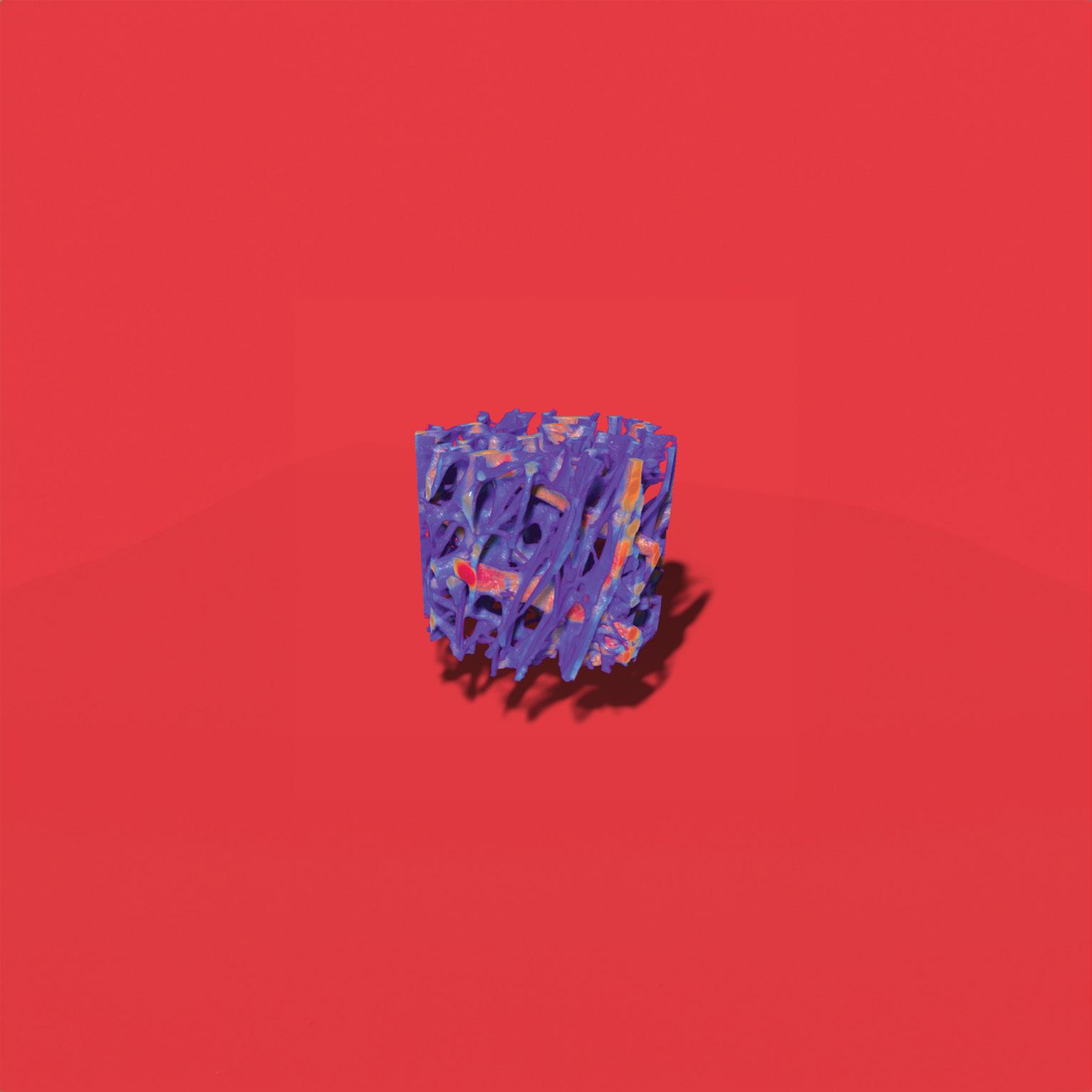
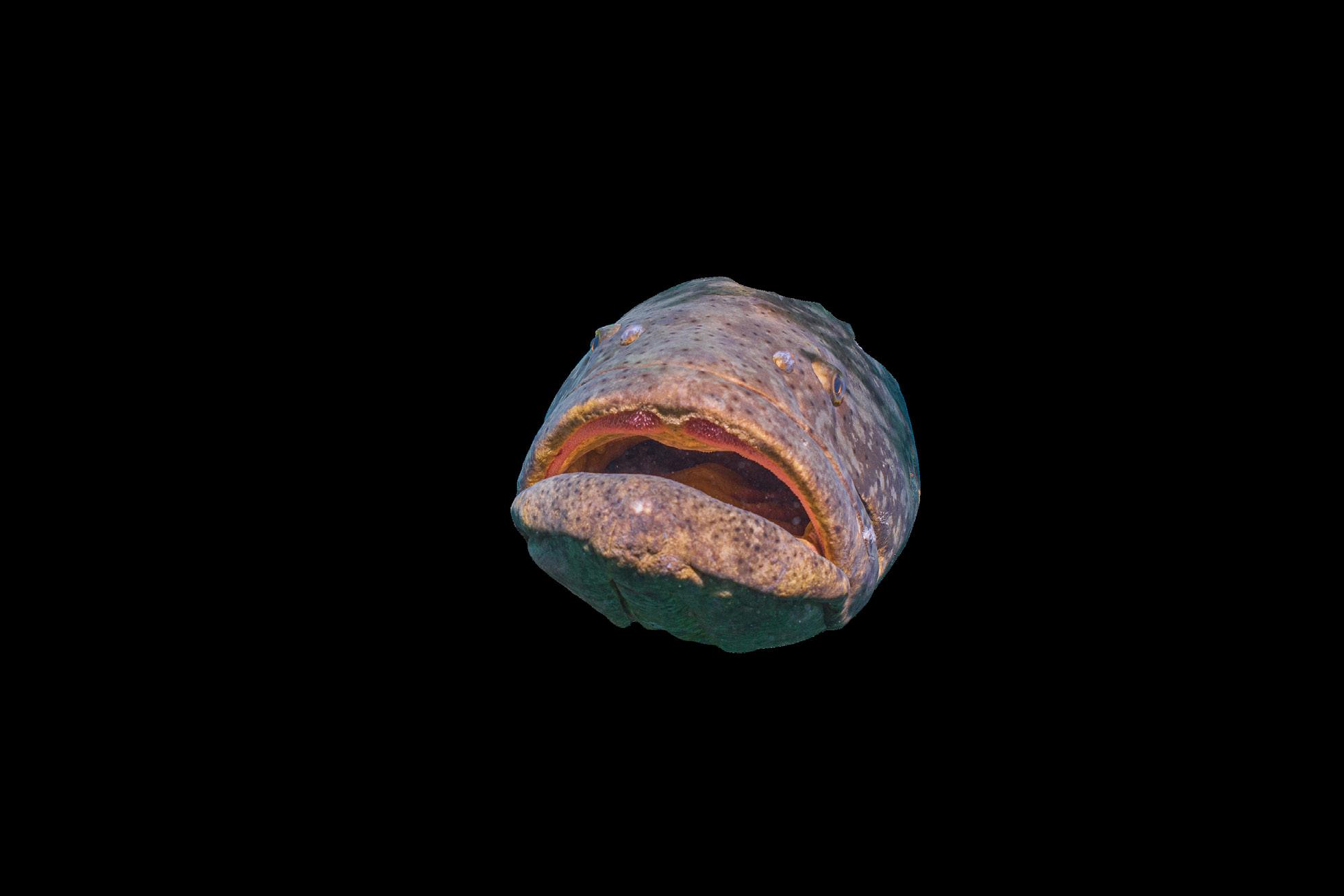
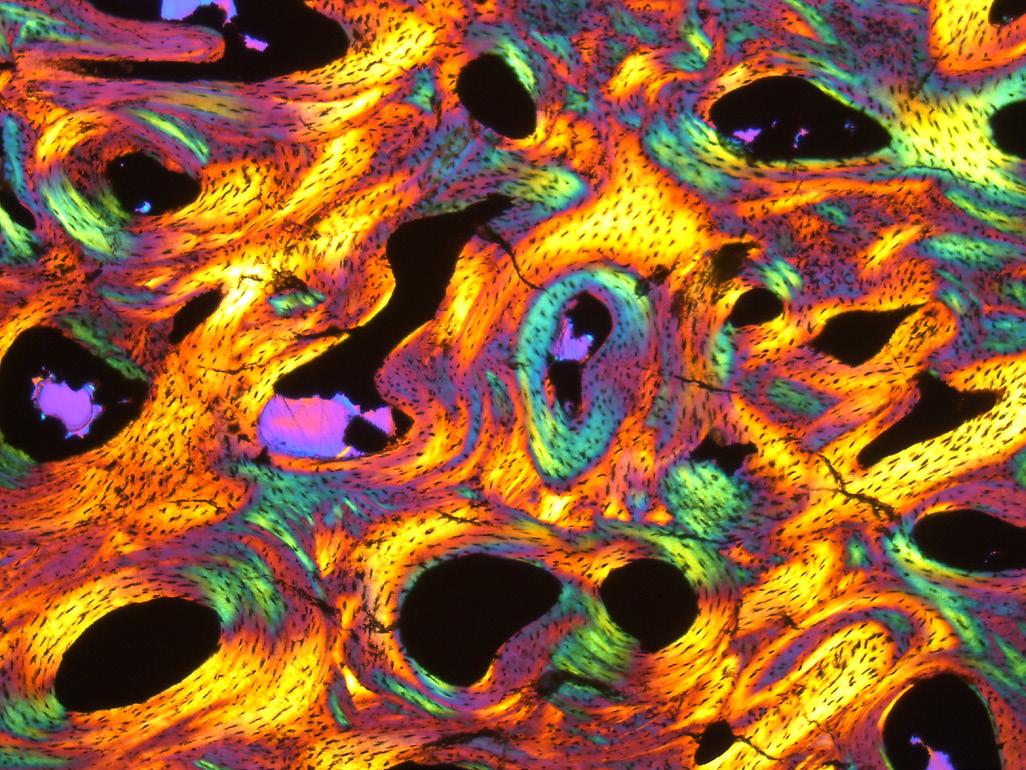
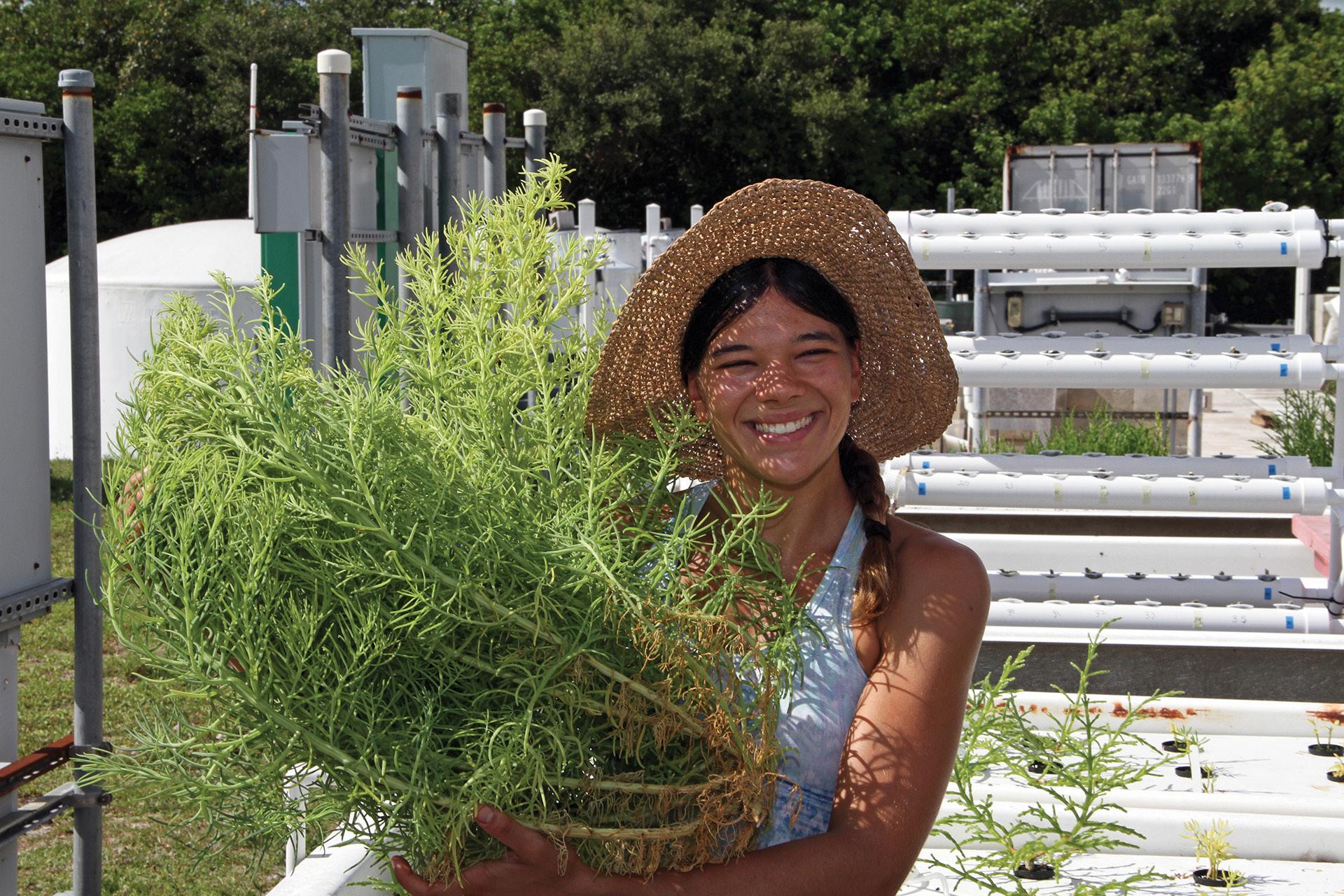

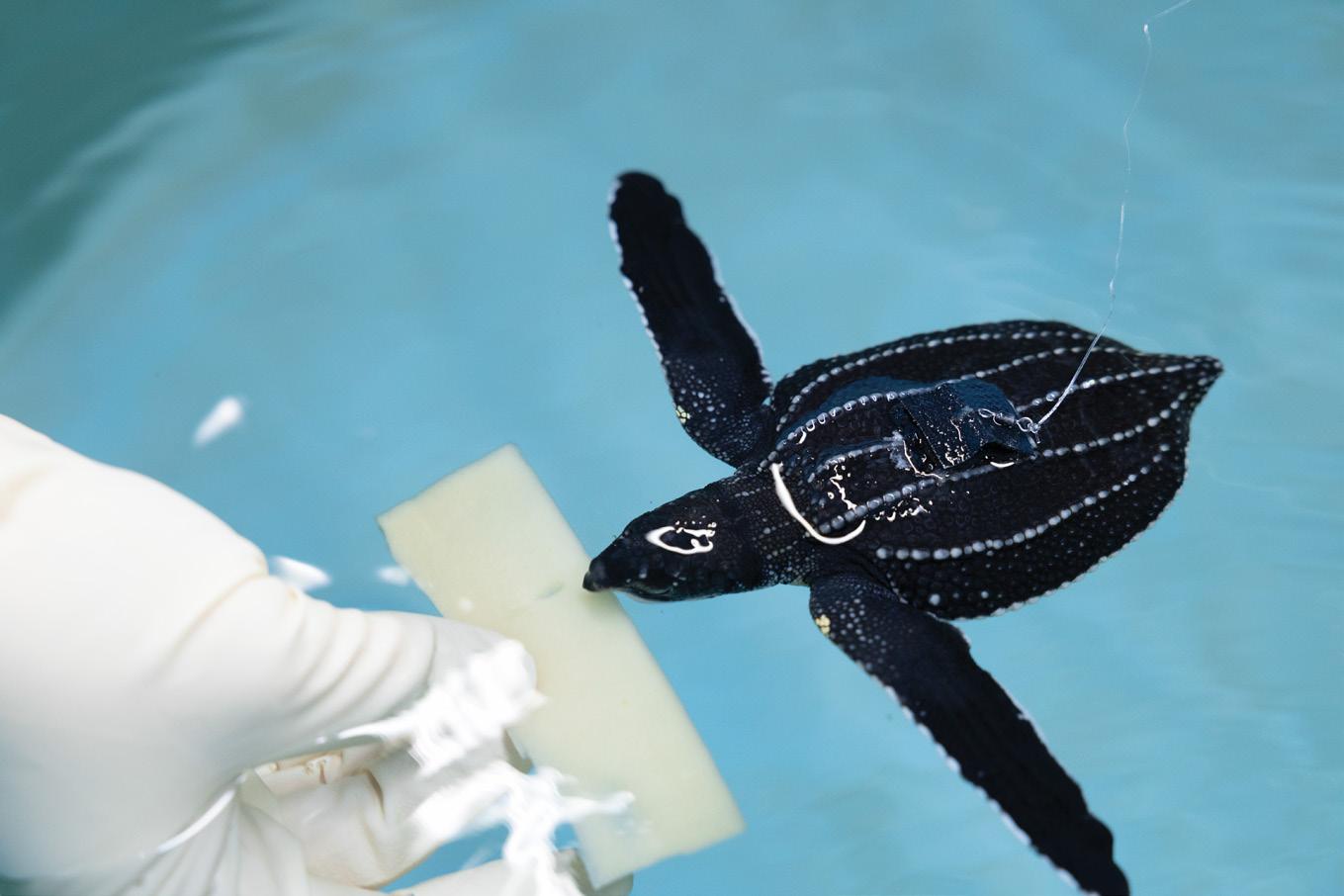
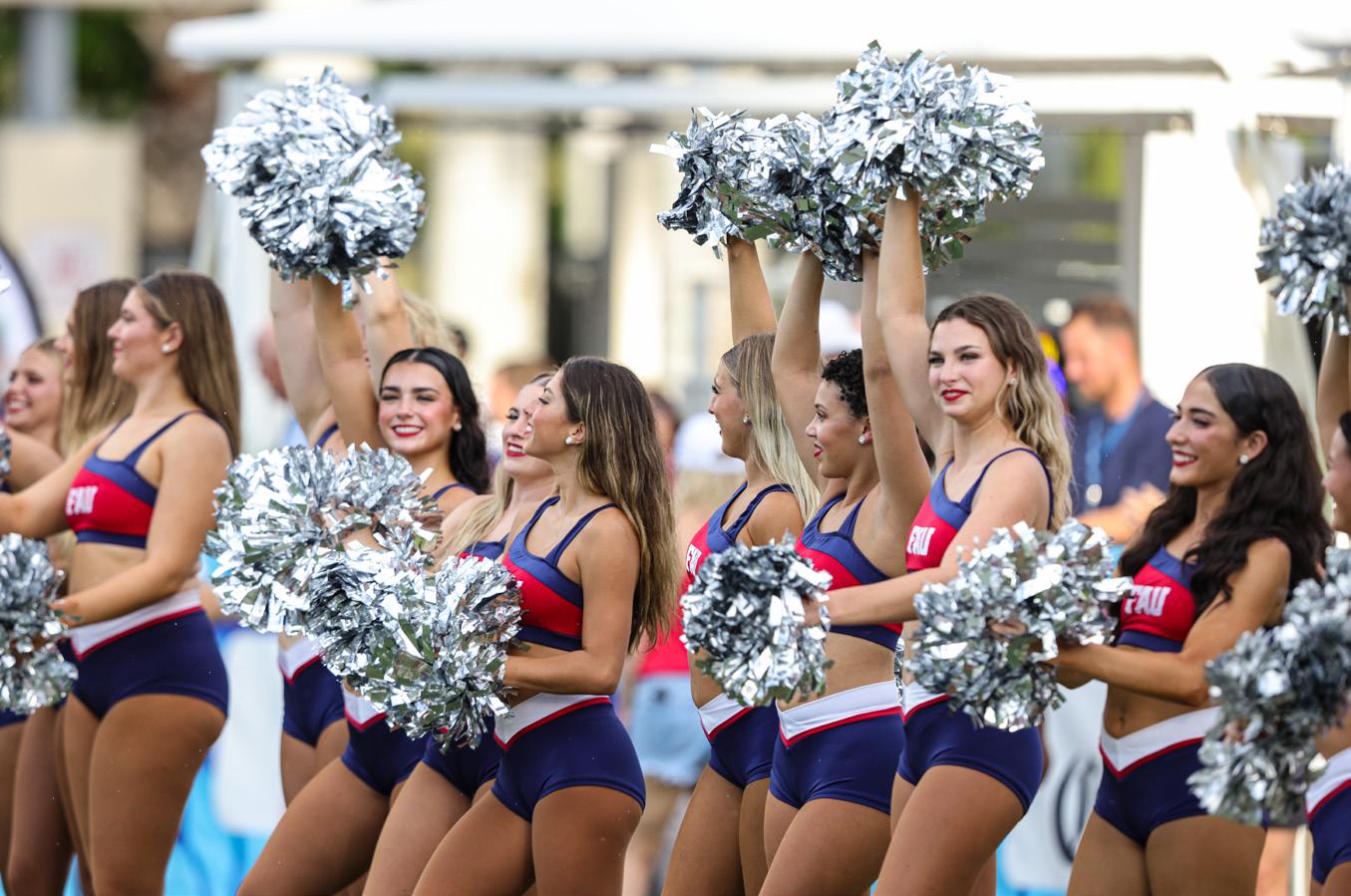
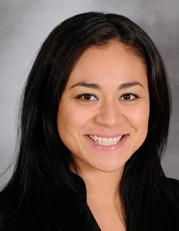
People do not see the preparation for game day and all the technical things that come with performing at this level — working together for nine months, through much of the summer while many have jobs along with school.”
– Claudia SotoClear Vision to Spirited Precision: Coaching Florida Atlantic’s Dance Team
BY KATRINA MCCORMACKOne might say that Claudia Soto, O.D., wears two sets of glasses. By day, she is an optometrist who helps patients improve their vision. And by night, she is Florida Atlantic University’s spirit coordinator and head dance coach, helping students turn their vision of being competitive team members into a reality.
An alumna of Atlantic High School in Delray Beach, Soto chose to attend Florida Atlantic to remain close to home. She joined the dance team in 2004 — the same year the team finished second at the National Dance Association competition open division — and served as its captain in 2005 and 2006. She also met her husband, Jeremy Vaca, in her undergraduate biology class.
Soto graduated from Florida Atlantic with a bachelor’s degree in biology in 2006. Two years later, she began a five-year optometry program at Nova Southeastern University. She was up to her eyes in studies, both literally and figuratively. But when an opportunity to judge a Florida Atlantic dance team audition opened up in 2010, she couldn’t resist. Soto enjoyed it so much that she quickly moved into an assistant coaching position. The program’s familiarity, proximity to home and ability to serve as a role model was a winning combination for her.
“I see it through their eyes — it was the same for me when I was on the team,” said Soto about the challenges team members face in juggling school, college life, work and dance. “I worked a parttime job, I was at school and was a member of the dance team. Knowing those things, I can give them feedback of ‘you can do it.’”
Soto still relies on those time-management skills and discipline to help navigate her days — not only as a coach, but as an optometrist, a wife and a mom to her 3-year-old son.
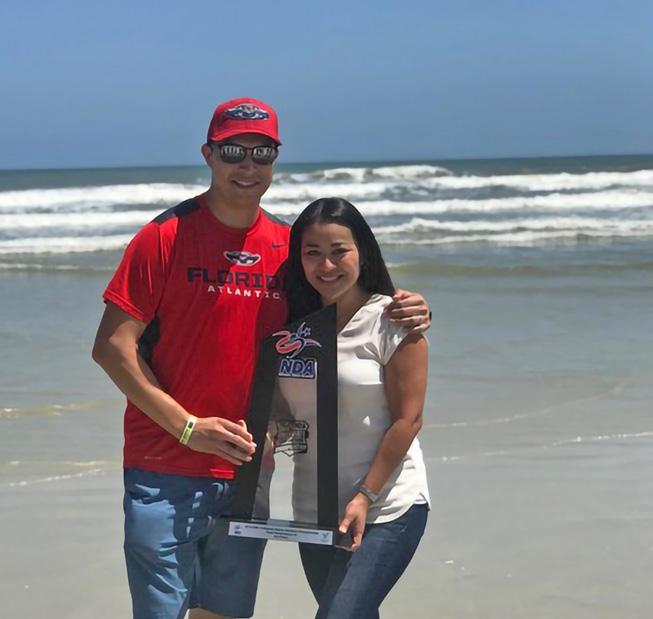
“People do not see the preparation for game day and all the technical things that come with performing at this level — working together for nine months, through much of the summer while many have jobs along with school,” Soto said. “Sometimes it gets overwhelming. It is all totally possible; you just have to manage your time and plan ahead. It has worked out for most and hopefully they will use that discipline after college.”
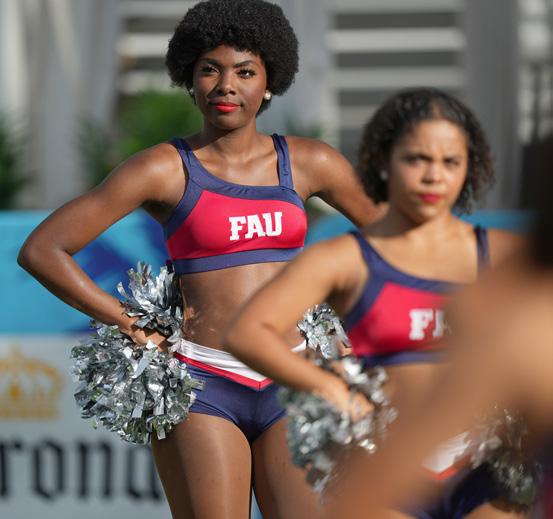
Soto has led the dance team to multiple top-10 finishes, but the highlight of her coaching career is not memorialized in a trophy — it is the relationships forged, and memories made along the way.
“The 2017-18 year was very difficult in that we had internal things and family things happening, which brought the team together and brought to light that there is more to life than dancing,” Soto said. “It set us in motion to have a really successful year because it was a tight-knit group. With that closeness, we were able to place as high as we had ever placed — second in Division IA — which is one of the toughest divisions. Just being able to culminate with that at the end made it special.”
The team also remains bonded through honoring former dance team member Victoria Strauss ’19. In January 2021, Strauss suffered a tragic accident and passed away while attending graduate school in Ohio. Her mother recently hosted the third annual gingerbread party held in Strauss’ honor, and many former dancers attended.
“Working with dance and having administrative oversight of cheer is so special for me,” said Soto. “The spirit team members are here for four years and then they move on. The hope is that something sticks, more than just the dance or cheer parts. The relationships built are what is special. They build the relationships, move on from this time in their life, get married, have children, and still have the connection. It is awesome to see.”





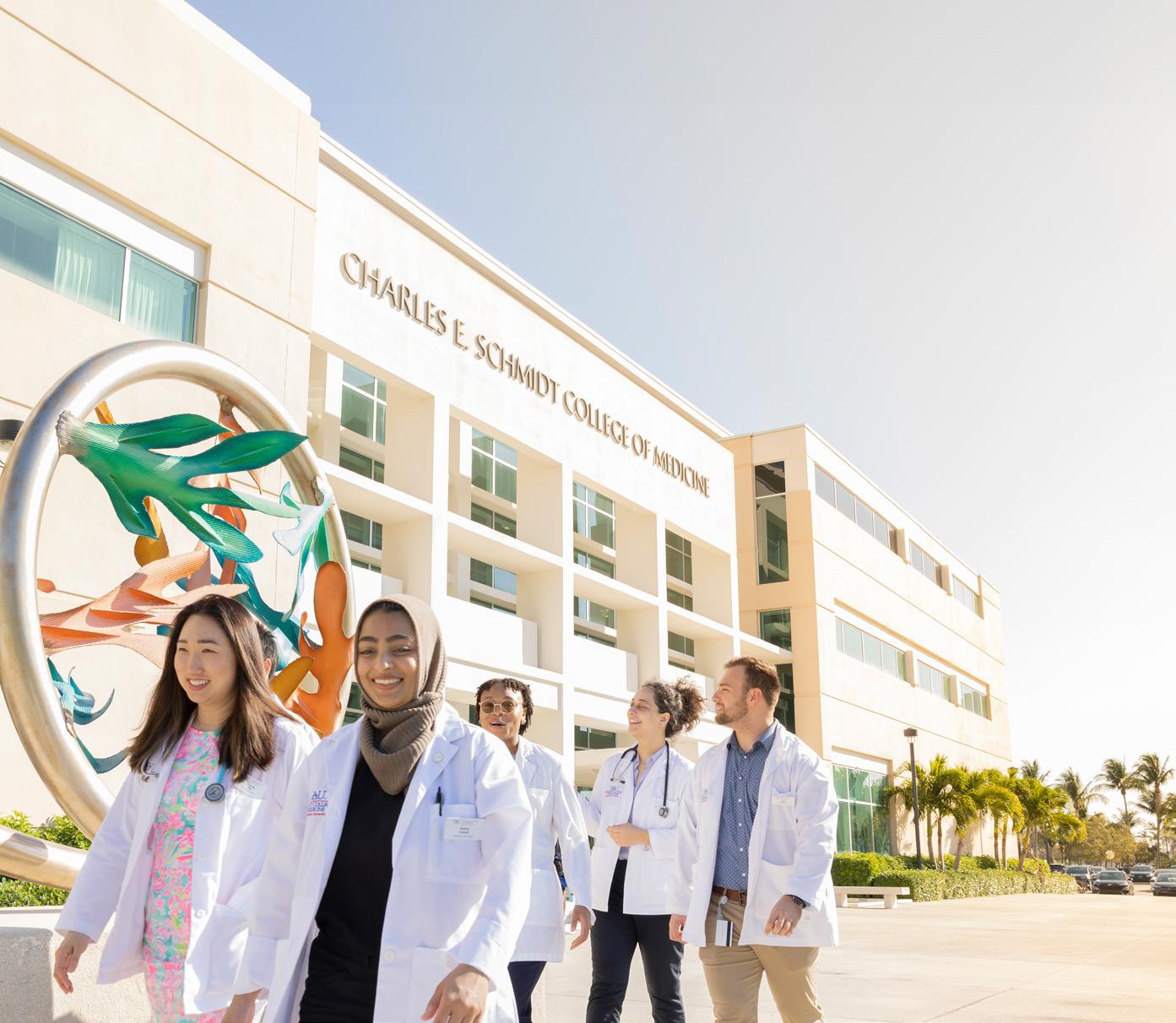
FLORIDA ATLANTIC ALUMNA’S BRAND GOES GLOBAL
BY DENISE GRAVATTWhen Arielle Baril ’20 asked her grandmother to teach her to sew as a young teen, she had no idea it would eventually land her on the prestigious Forbes “30 Under 30 Miami” list.
The Florida Atlantic University alumna’s luxury swimsuit brand, Rielli, has taken her on a journey one only dreams about. But catching the eyes of celebrities like Kim Kardashian, who showcased one of Baril’s original suits for her 40th birthday, or gaining recognition in high-fashion magazines like Vogue, Cosmopolitan and Sports Illustrated Swimsuit, really did happen.
“I founded Rielli in 2019 while I was earning my degree in international business,” said Baril, 25. “My days were spent attending classes and doing my work-study in the accounting and budgeting office on campus. In the evenings, I would go home to work on orders I received.”
Rielli grew through word of mouth and social media, but a bold decision to send Kardashian one of her bathing suits — directly to her home address in August 2020 — proved to be lifechanging.


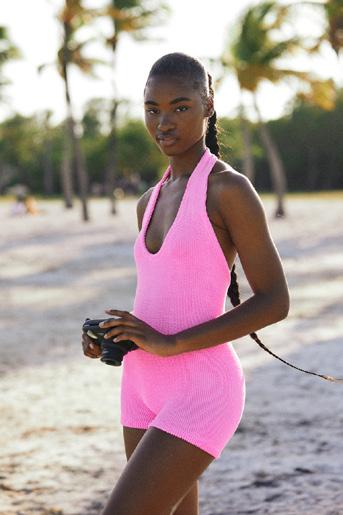

“After about two months, I got a DM from her then-personal assistant, who said Kim loved it and wanted one in every color,” said Baril, who spent the next four days attached to her sewing machine making sure every stitch was perfect.
That move instantly catapulted Rielli onto a global stage and across beaches around the world.
“I was so overwhelmed and excited at the same time,” she said.
Baril’s entrepreneurial spirit traces back to her roots. Her Haitian-immigrant grandmother owned a small boutique in Haiti and her parents own a medical center locally. Her family has been supportive, Baril said, from creating her first “atelier” — or artist’s studio as her grandmother calls it — to assisting her with communicating with potential clients.
“Rielli was created with passion, purpose and creativity. I knew if I wanted to stand out in the fashion industry, I had to create
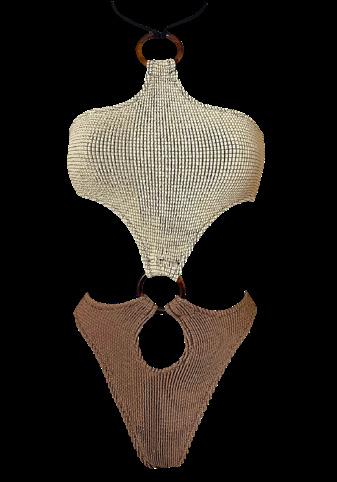
things I’ve never seen before,” Baril said. “I want to impact the industry by creating new designs and reaching new audiences. Inclusivity is very important to me.”
Baril also credits Florida Atlantic and her bachelor’s degree in business administration with her growing success as an entrepreneur, from learning about import tax, pricing in different currencies and culturally influenced product choices, to the in-depth coursework.
“It’s a foundation that sets me apart,” she said. “The ‘Forbes’ recognition is more than just a measurement of success; it’s about having a global impact in my industry. I am proud and honored to be named alongside

outstanding individuals known for their work across various sectors.”
Beyond the accolades and the everyday hustle of running her business, Baril said she takes time to inspire other student entrepreneurs by sharing her journey as a guest speaker in Florida Atlantic classes and student organizations.
“Our young alumni speakers seem to resonate most with students, instilling confidence and conveying that they, too, can accomplish early career success as entrepreneurs,” said Kevin Cox, Ph.D., senior lecturer and director of Florida Atlantic’s Adams Center for Entrepreneurship in the College
‘‘If there is one piece of advice I can share, it is simply to keep going, keep dreaming and keep pushing forward.”
- Arielle Baril
of Business. “We have a truly vibrant entrepreneurial ecosystem and community that provides education, mentorship and comprehensive support for founders of all ages.”
Reconnecting with her alma mater has also given Baril the chance to mentor aspiring entrepreneurs. She currently has a Florida Atlantic student working as an intern at Rielli and hopes to open a storefront one day in Miami.
“I feel like I am a good example that you can really do anything you put your head and heart into,” Baril said. “If there is one piece of advice I can share, it is simply to keep going, keep dreaming and keep pushing forward.”
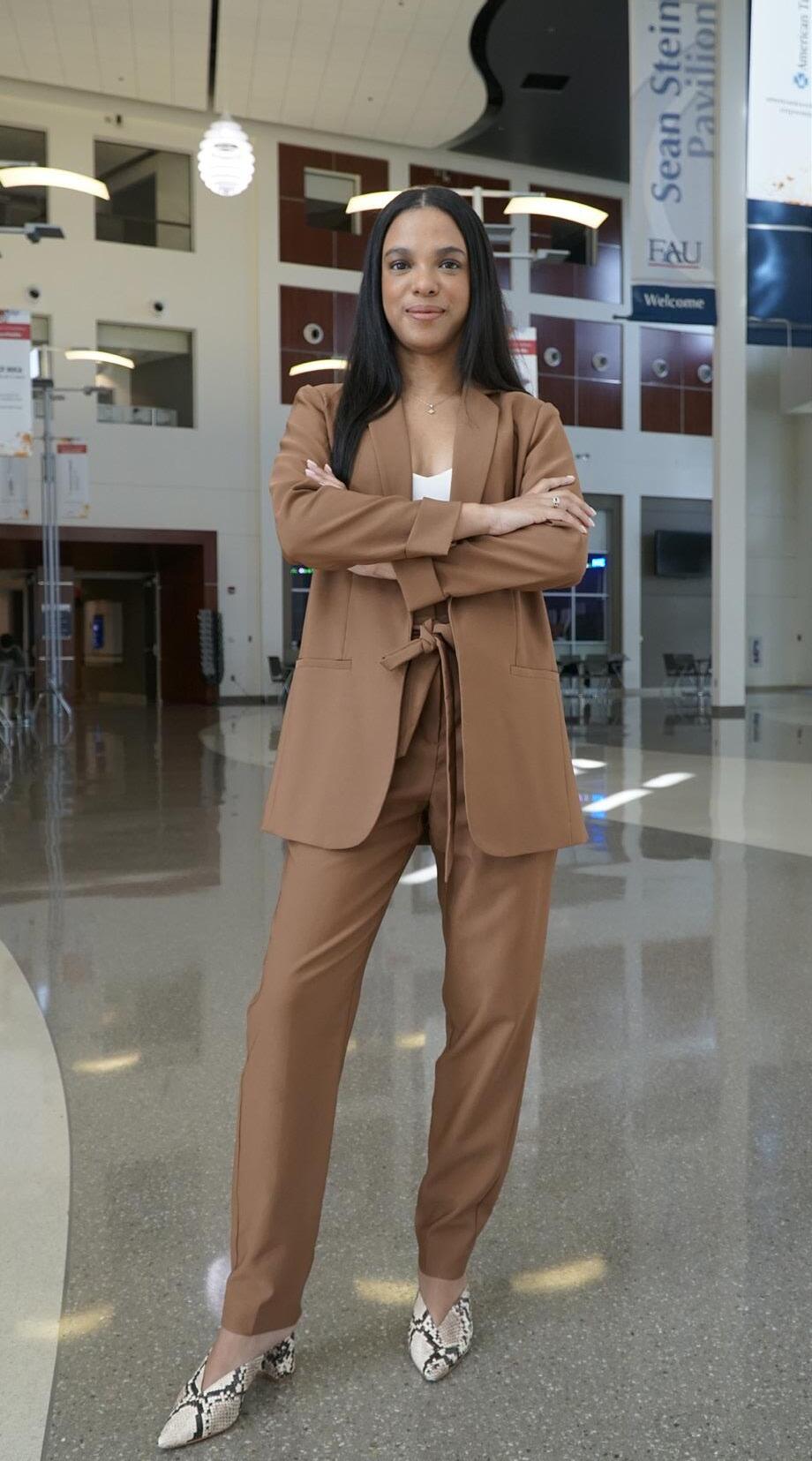



FLORIDA ATLANTIC UNIVERSITY provides degree programs designed for your convenience: pursue an MBA without compromising your work or travel schedule. Our flexible programs offer on-campus, online, and hybrid options, providing students with multiple pathways to success.
MBA CONCENTRATION AREAS
– SPORT MANAGEMENT
– HOSPITALITY AND TOURISM MANAGEMENT
– FINANCE
– OPERATIONS MANAGEMENT
– INTERNATIONAL BUSINESS
– BUSINESS ANALYTICS
– MANAGEMENT INFORMATION SYSTEMS
– HEALTH ADMINISTRATION
– MARKETING
– ACCOUNTING

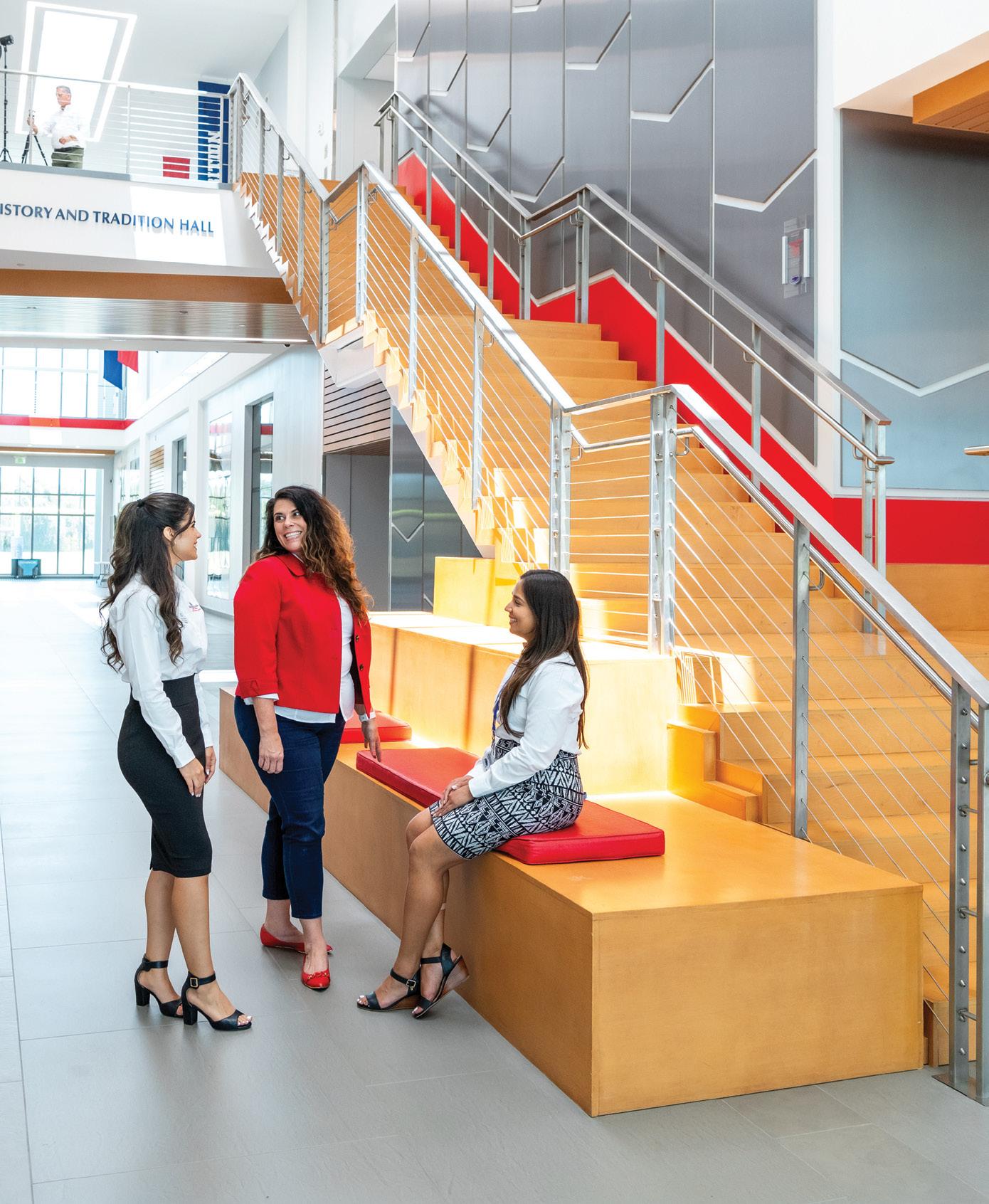

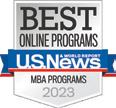
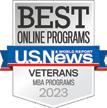

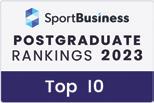
FORMER STUDENT-ATHLETE
TACKLES LIFE’S PLAYBOOK
BY KATRINA MCCORMACK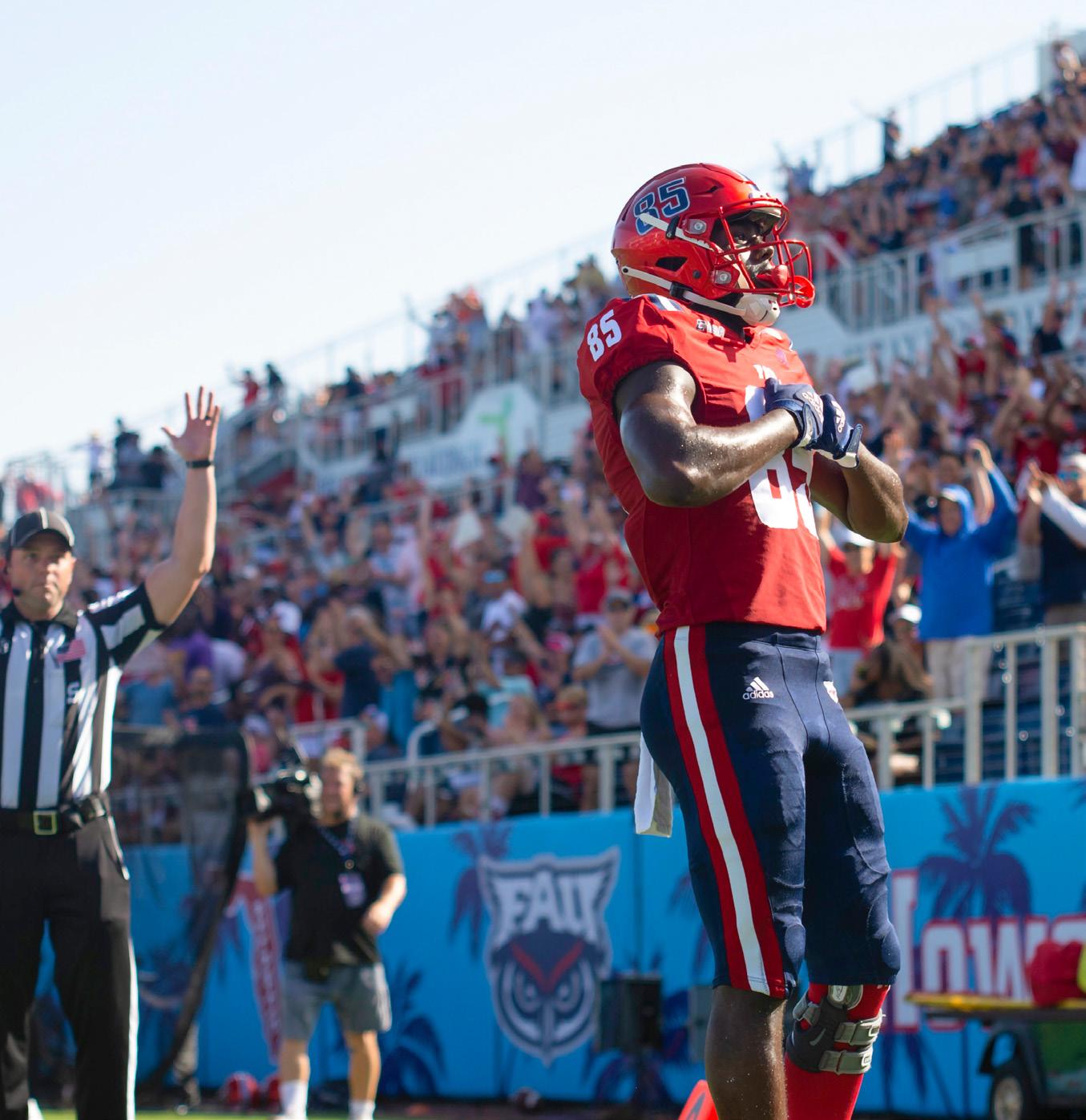
When John Mitchell ’20 first stepped onto Florida Atlantic University’s Boca Raton campus, the then-18 year old had a vision of where his life would go over the next 15 years. First, he’d tackle playing wide receiver for Florida Atlantic’s football team; next he would play professional football; and then he would become a doctor. There was no question in his mind about where he’d wind up, or whether he had the passion, drive or work ethic to see his vision to fruition.
Mitchell attended Lawton Chiles High School in Tallahassee, where he was recruited by then-Florida Atlantic Head
Football Coach Charlie Partridge’s staff. He was a two-time MVP and recipient of the Offensive Pride of the Pack Award while playing under Garrett Jahn, head coach of Lawton Chiles’ football team, FAU alumnus and starting quarterback for the football team’s inaugural game in 2001.
As a 6-foot-4-inch true freshman in 2016, Mitchell collected his first touchdown reception: a 33-yard strike from thenquarterback Jason Driskel that put the Owls up 14-7 at Rice University in Houston. Florida Atlantic went on to win that game 42-25.
From there, Mitchell played two different positions — wide receiver and tight end — under three different head coaches. He was on two conference championship teams, played in three bowl games, tallied 873 receiving yards and scored 10 times in his six-year collegiate career. This includes three scores in a 41-31 road win over Ball State that helped set the tone for the 2019 season, which ended with a conference championship and a blowout 52-28 win in the Boca Raton Bowl against Southern Methodist.
Mitchell’s resolve was tested on multiple occasions, including twice when he suffered season-ending injuries in 2017 and 2020. During each of those injuries, he made sure to observe the surgeons, pay attention during office visits and collaborate directly with the physical therapist, all while asking questions and doing his own research.
“I am incredibly thankful for their guidance and teachings,” Mitchell said about the medical staff he met during his surgeries and the rehabilitation process. “I’m planning to apply for an orthopedic surgery residency program when the time comes.”
Mitchell’s time at Florida Atlantic was not all about football. He also was a member of the Alpha Phi Alpha fraternity and served on the Student-Athlete Advisory Committee. Through it all, he never lost focus on his original goals, graduating in 2020 with a bachelor’s degree in biology.
Mitchell returned to the field as a graduate student in 2021 for his final campaign and first full season after the height of the COVID-19 pandemic. With a new position — tight end — and a new resolve, he continued to build his football resume in hopes of a shot at the NFL. That season, Mitchell collected multiple accolades, including his selection to the Conference USA Preseason All-Academic Watch List and NFLPA Collegiate Bowl “Preseason Big Board” list, as well as nominations for the Mayo Clinic Comeback Player of the Year Award and the National Football Foundation William V. Campbell Trophy. He then signed with the Seattle Seahawks in 2022 and concluded his professional career in the United States Football League.
During his time as a graduate student, Mitchell befriended Charles Hennekens, M.D., Dr.P.H., Sir Richard Doll Professor and senior academic advisor in Florida Atlantic’s Charles E. Schmidt College of Medicine. Hennekens embraced Mitchell,
‘‘ I am incredibly thankful for their guidance and teachings … I’m planning to apply for an orthopedic surgery residency program when the time comes.”
- John Mitchell
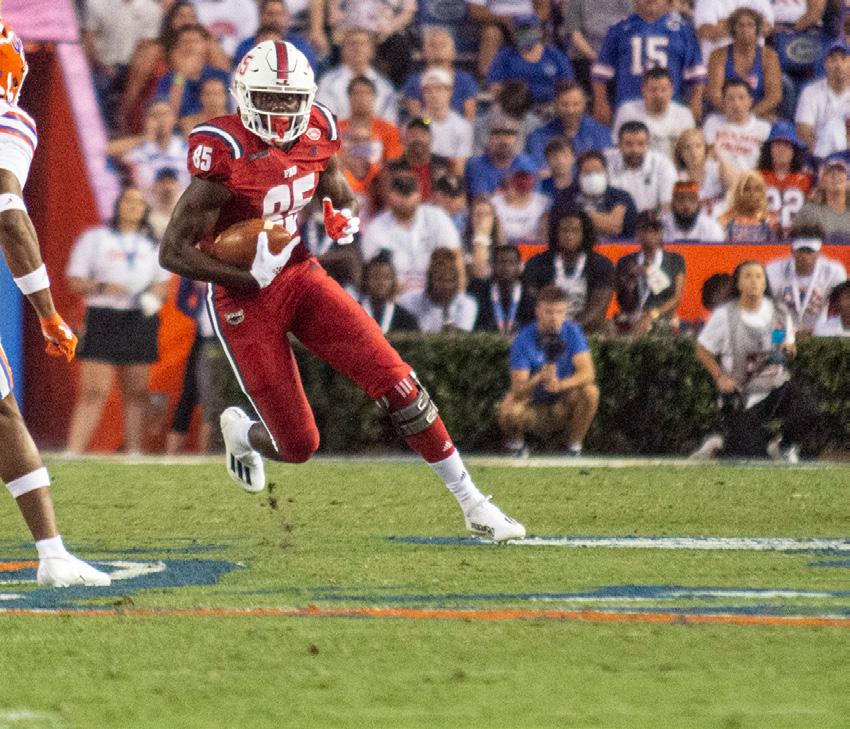
as he had done with countless other students throughout his storied career, and the two began working toward Mitchell’s medical future — and toward a newfound sport: pickleball.
“He is an excellent mentor. He’s the type of person who genuinely wants to see you flourish and will do everything in his power to help you reach your full potential,” said Mitchell. “He’s brilliant, welcoming, and not to mention a world-class pickleball player. He’s responsible for about 80 percent of my losses, no kidding. I’m happy to call him a mentor and a friend of mine.”
The duo completed a research elective supervised by Hennekens that led to a collaborative manuscript titled “Emerging data in COVID-19 create urgent challengers for health providers: Updates on COVID-19 vaccine and Paxlovid.” It was published by Journal of the National Medical Association in January.
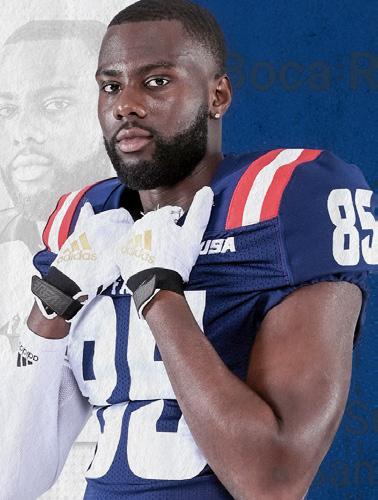
“[Mitchell’s] grace in social settings invites authentic engagement and will serve him well with his fellow medical students and professors, as well as, perhaps most importantly, his patients,” Hennekens wrote in a letter of recommendation for Mitchell.
After countless hours in labs, study groups and the academic center, the consistent dedication paid off and now the final destination is all but in reach. Mitchell was accepted to medical school at Howard University and the University of Florida, with plans to attend the latter in the fall.
But first, the 26-year-old will follow in the footsteps of fellow Owl and football alumnus Tyler Cameron ‘15 as a contestant on “The Bachelorette.” Mitchell will appear in Season 21 of the show, which will air in July on ABC.
Marshall Bellin, bachelor’s in business administration ’74, and bachelor’s in education ’77 and Patricia (Lesher) Bellin, bachelor’s in education ’69, and master’s in education ’74, celebrated their 50th wedding anniversary in December 2023 in Hawaii. Marshall retired in 2008 after a 35-year career as a teacher and assistant principal, most recently at Atlantic High School in Delray Beach. Patricia retired in 2004 after a 35-year career as a teacher at Boca Raton High School.
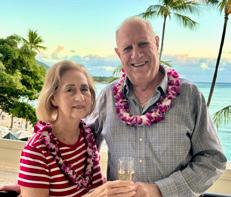
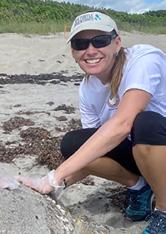
Jackie Kingston, master’s in biological sciences ’06, founded Sea Turtle Adventures, an organization that focuses on conservation efforts, educates the public about the marine environment, and provides naturebased programs for adults with special needs.
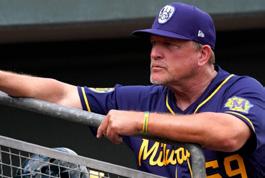
Patrick Murphy, bachelor’s in health services ’82, and master’s in education ’85, was named manager of the Milwaukee Brewers, after serving as a bench coach for the club since 2015. Murphy played two seasons for the Owls as a pitcher and utility player in 1981-82 and was inducted into the FAU Baseball Ring of Honor in 2008.
Arthur C. Brooks, Ph.D., master’s in economics ’94, recently released “Build the Life You Want: The Art and Science of Getting Happier,” which he co-authored with Oprah Winfrey. The book guides readers on a path toward happiness by using science and emotional management skills to teach them how to improve their lives, no matter the circumstances. Brooks is a social scientist, speaker and Harvard professor who led the American Enterprise Institute for 10 years. He was inducted into the Florida Atlantic University Alumni Hall of Fame for his career accomplishments in 2019.
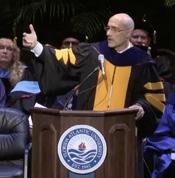
Jonathan Beskin, MBA ’15, founder and CEO of SinglesSwag, an Inc. 5000 company, authored “The Least Likely Millionaire: How to Succeed When Everyone Expects You to Fail,” which is a Wall Street Journal bestseller.


Caralin Branscum, bachelor’s in criminal justice and sociology ’18, and master’s in criminology and criminal justice ’20, has accepted a tenure-track assistant professor position at the University of South Florida’s St. Petersburg campus. Branscum is an ABD (All But Dissertation) doctoral candidate at the University of Nebraska – Omaha.
Brandin Bryant, bachelor’s in communication and media studies ’15, authored “So, You Want To Be an Athlete?,” a children’s book about balancing sports with studies, overcoming hurdles, keeping a positive outlook and understanding that every great athlete is first a dedicated student. An NFL veteran, Bryant has played defensive tackle for several professional teams since 2016, including the Seattle Seahawks, New York Jets, Cleveland Browns, Miami Dolphins, Buffalo Bills and Houston Texans.

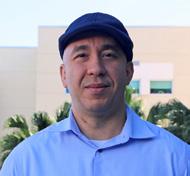
Jorge Gonzalez, doctorate in mathematics ’20, returns to Florida Atlantic as a postdoctoral fellow in the Charles E. Schmidt College of Science, as part of an interdisciplinary, multiinstitutional study funded by the National Science Foundation’s Rules of Life Program. The goal of the project is to understand the rules by which living cells maintain their function as external conditions change.
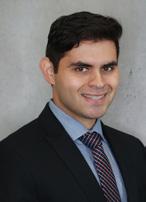
Ivan Riveros, bachelor’s in chemistry ’21, and master’s certificate in chemistry ’22, was awarded a National Science Foundation Graduate Research Fellowship, a prestigious grant awarded annually to approximately 2,000 current or prospective STEM master’s and doctoral students. Riveros is a doctoral student studying chemistry at Massachusetts Institute of Technology.
Vivek Sreejithkumar, bachelor’s in biological chemistry and interdisciplinary mathematical sciences ’22, is training as a post-baccalaureate research fellow at the National Institute of Allergy and Infectious Diseases, under the National Institutes of Health, in Washington, D.C.
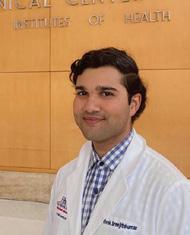
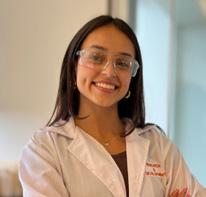
Nicole Gutierrez, bachelor’s in chemistry ’23, started a job in the research and development (R&D) department at Cosmo International Fragrances, a global fragrance company with production plants, creative centers and R&D sites in the United States, Europe, Asia and the Middle East.
Alexis Surtel, bachelor’s in biological sciences ’23, was selected as a postbaccalaureate Intramural Research Training Award trainee with the National Institutes of Health (NIH). Surtel will be housed in the National Institute of Neurological Disorders and Stroke within the NIH and will perform research in the molecular neuropharmacology section.
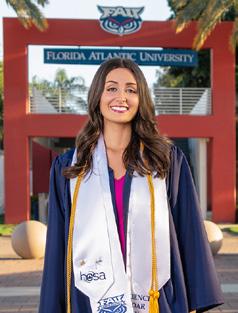
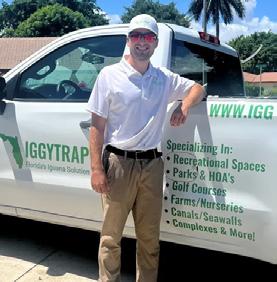
Pierce Kennamer, bachelor’s in finance ’23, founded an iguana trapping company and patented the IggyTrap, which is designed to catch up to 25 iguanas at once. Kennamer’s company has garnered the attention of local ABC and NBC television affiliates, as well as outlets in Australia.
Did you get married, have a baby, start a new job, receive an award, or experience some other big life moment or personal victory recently?
Send your news, including full name, graduation year, college or major, and high-resolution photo (at least 300 dpi) to FloridaAtlanticMag@fau.edu.
Did you get married, have a baby, start a new job, receive an award, or experience some other big life moment or personal victory recently? Send your news, including full name, graduation year, college or major, and high-resolution photos (at least 300 dpi) to FloridaAtlanticMag@fau.edu.
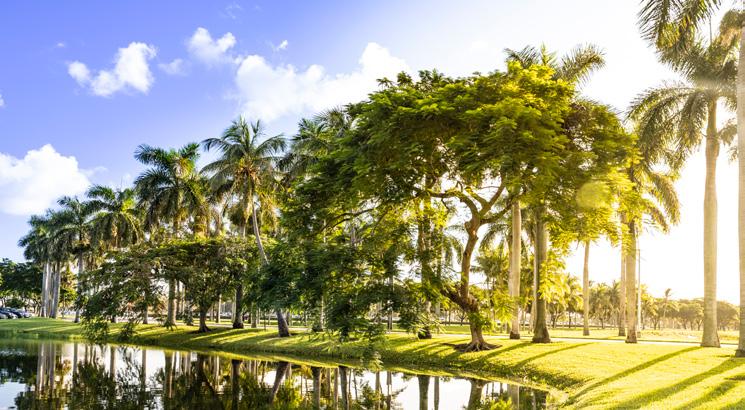
The Evolution of the University’s Logo
The first official seal of the University was designed by Hank Schubert, director of the Learning Resources Department, in the 1960s. He based it on the earliest views of Florida from space.
The linked-letters logo was popular in the 1970s.
Nicknamed “the thumbprint,” this logo was designed in the early 1990s. It was the winning entry in a student competition.
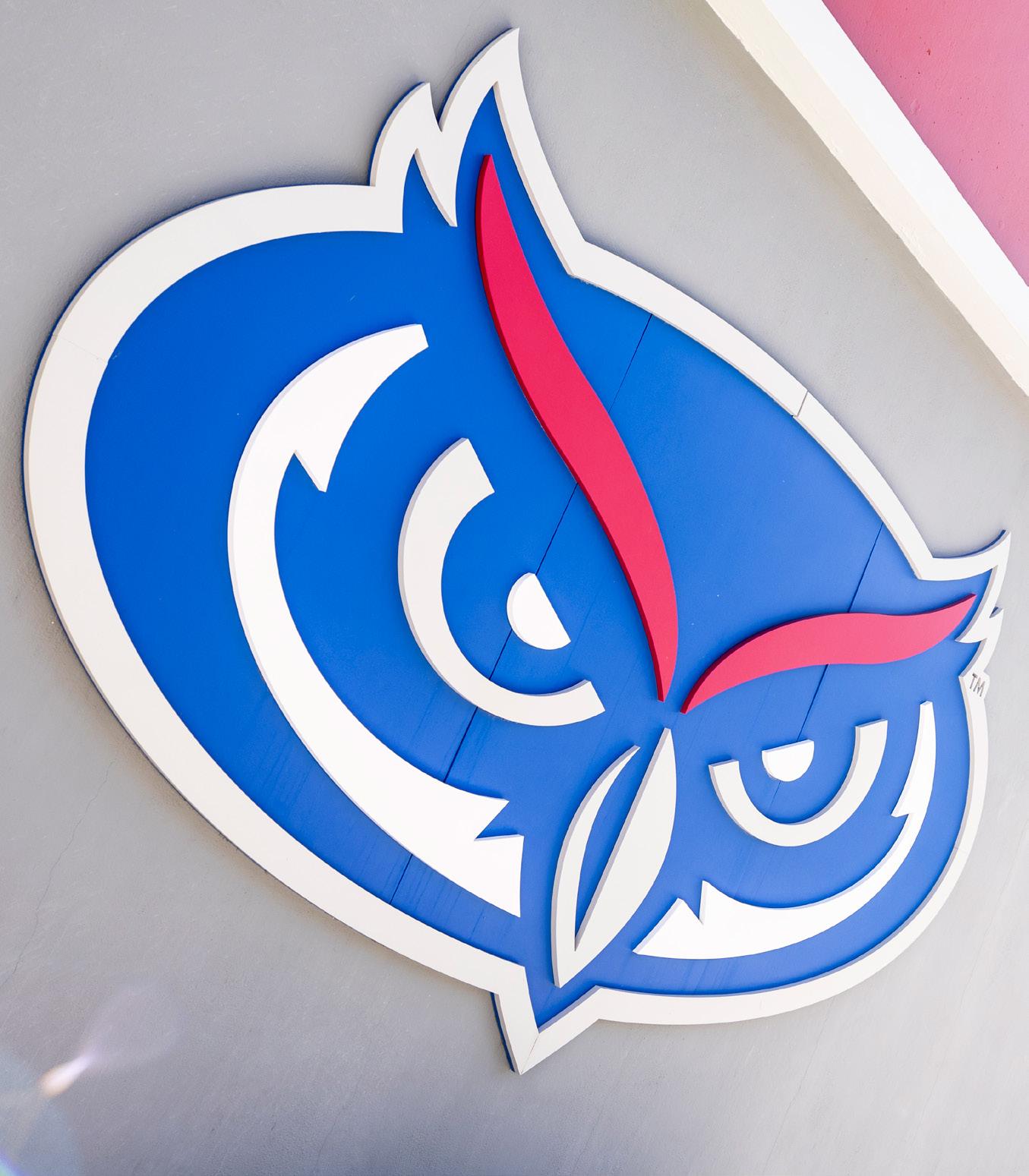
One of the first employees of Florida Atlantic’s Graphics Department, Steve Kika ’80, ’87, designed the first owl logo. This perky symbol appeared on FAU T-shirts in the 1980s.

In 2005, Florida Atlantic unveiled new branding images that included a word mark, a spirit logo and a seal.
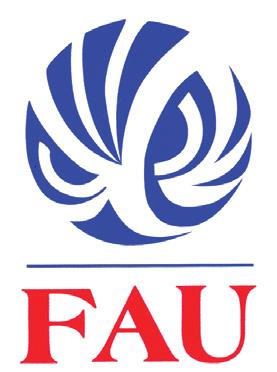
This stylized owl head was used later in the 1990s.
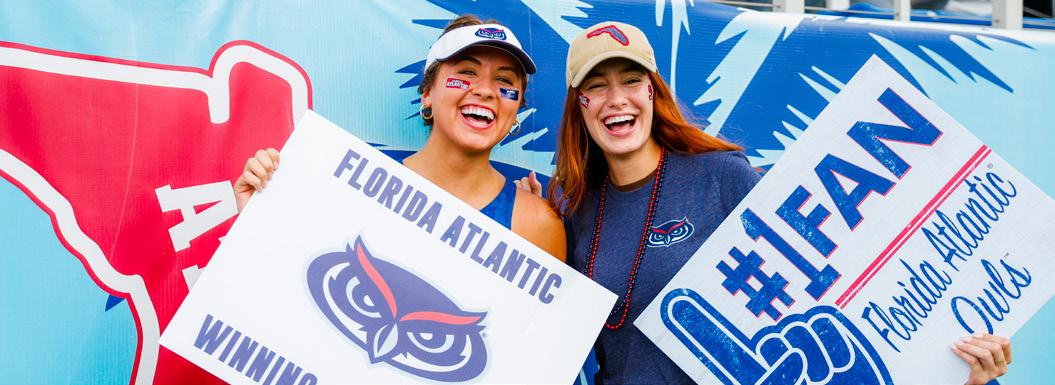
The owl took on a combative look in 2001, the same year the football team made its debut.
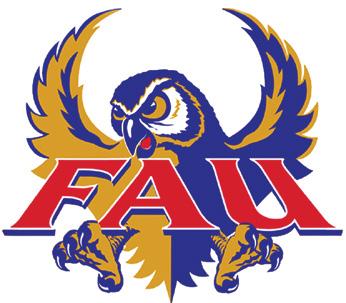
Today, the primary logo features a depiction of a burrowing owl, a small, ground-dwelling bird with a round head, prominent eyebrows and no ear tufts. The owl head is used in conjunction with the university name and the names of colleges, divisions and departments.
